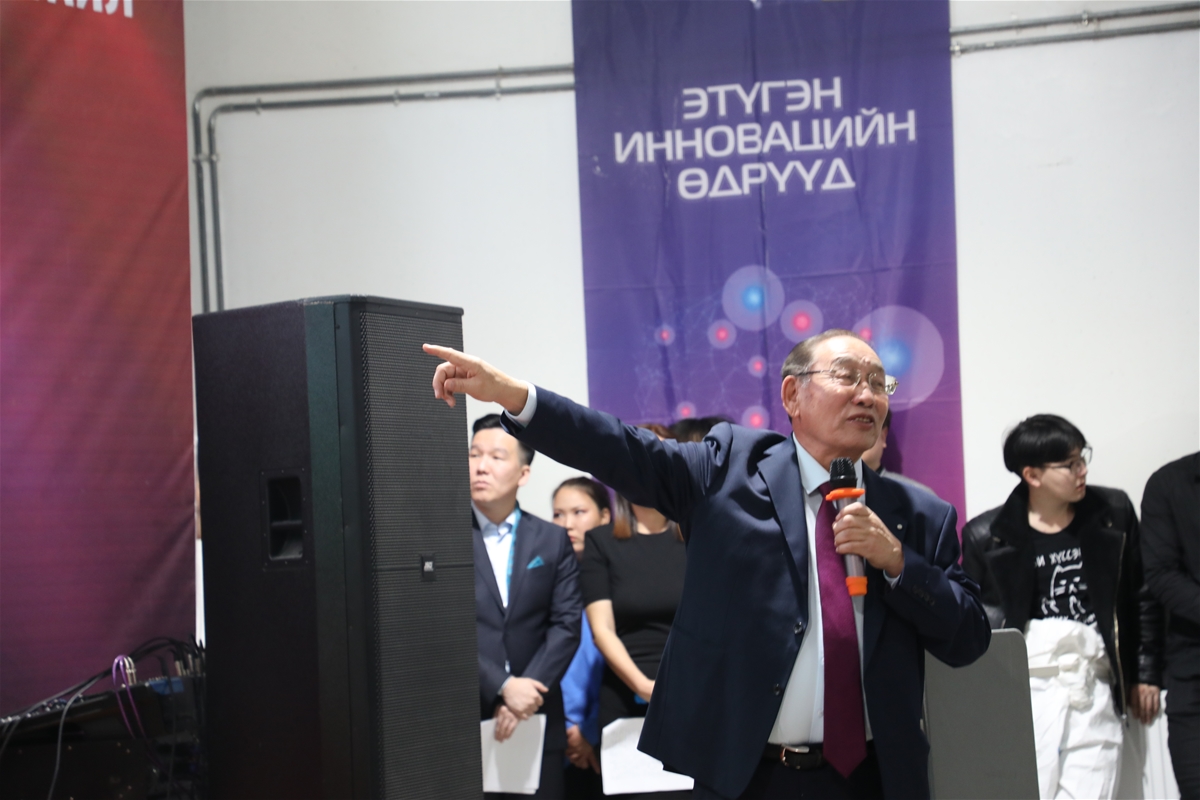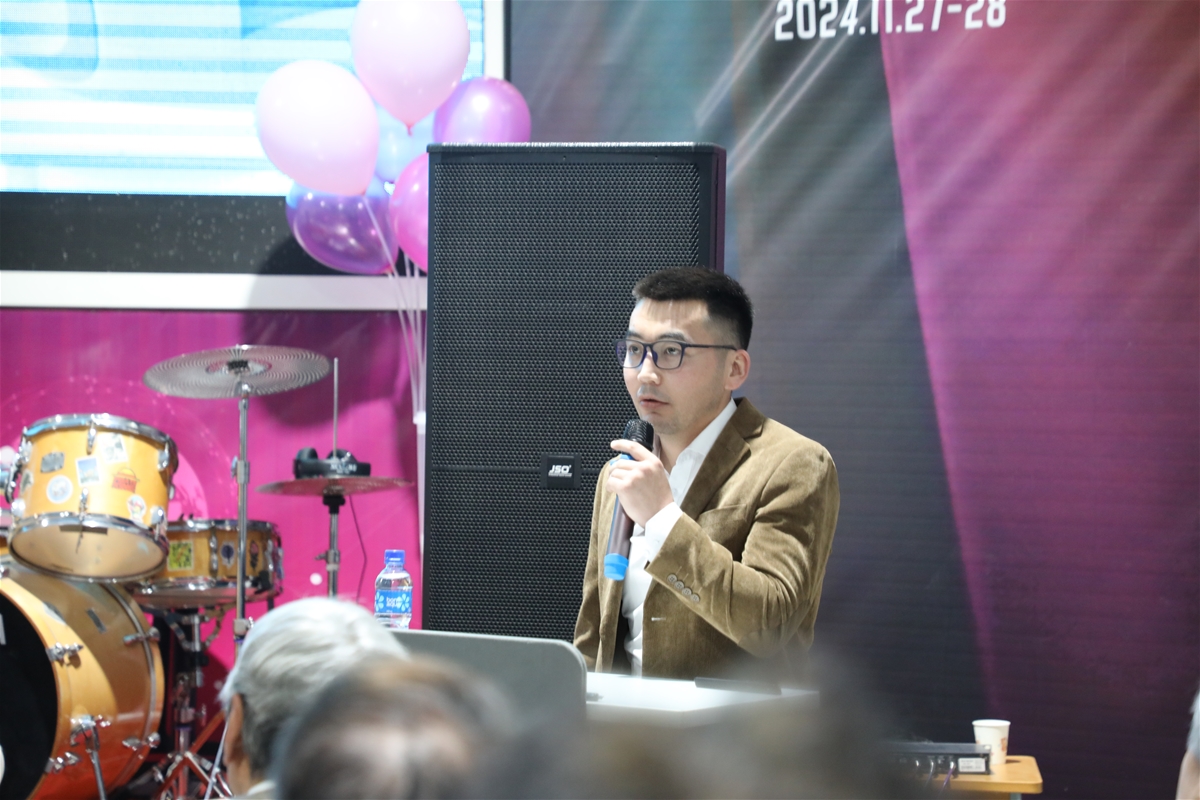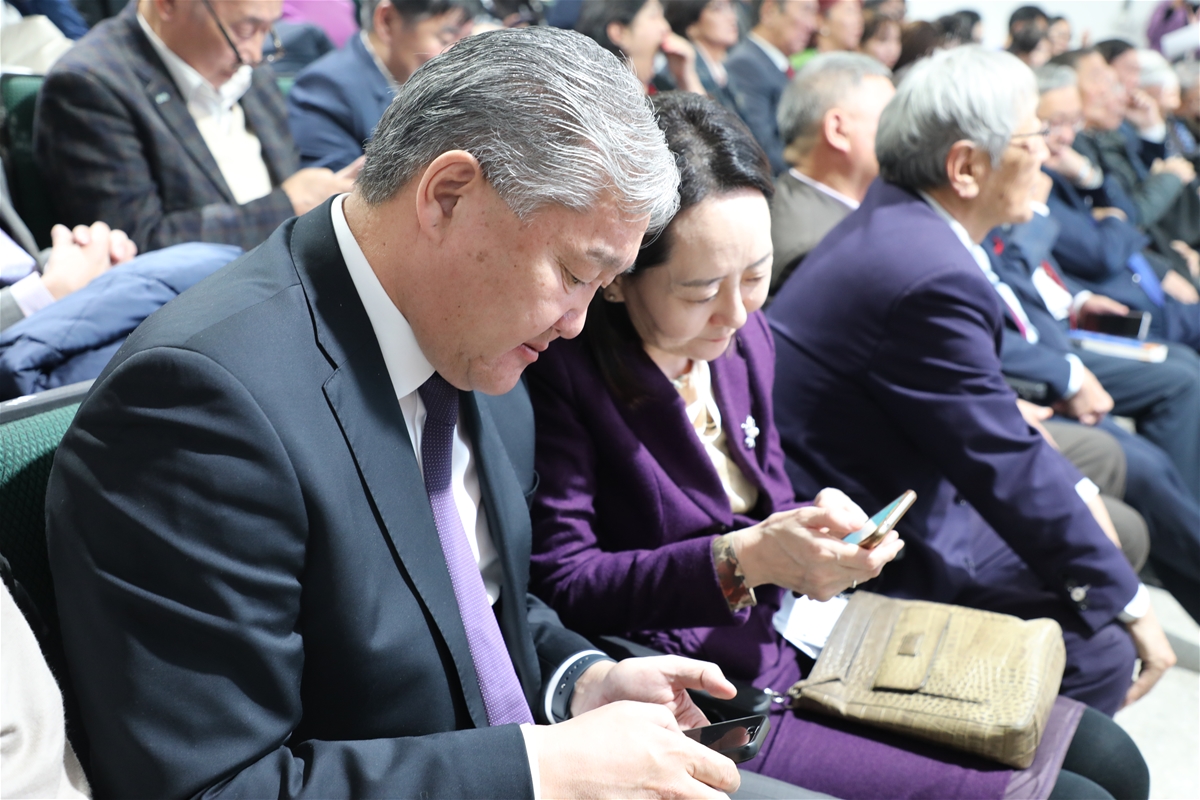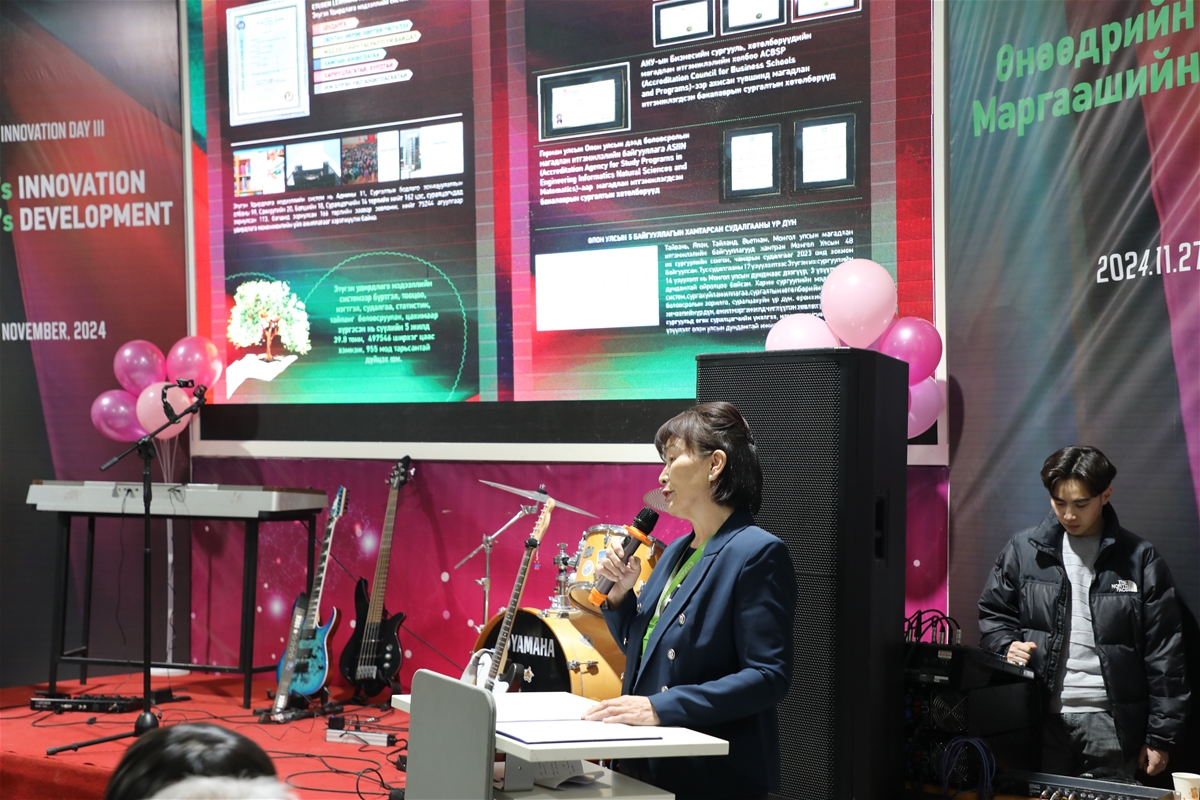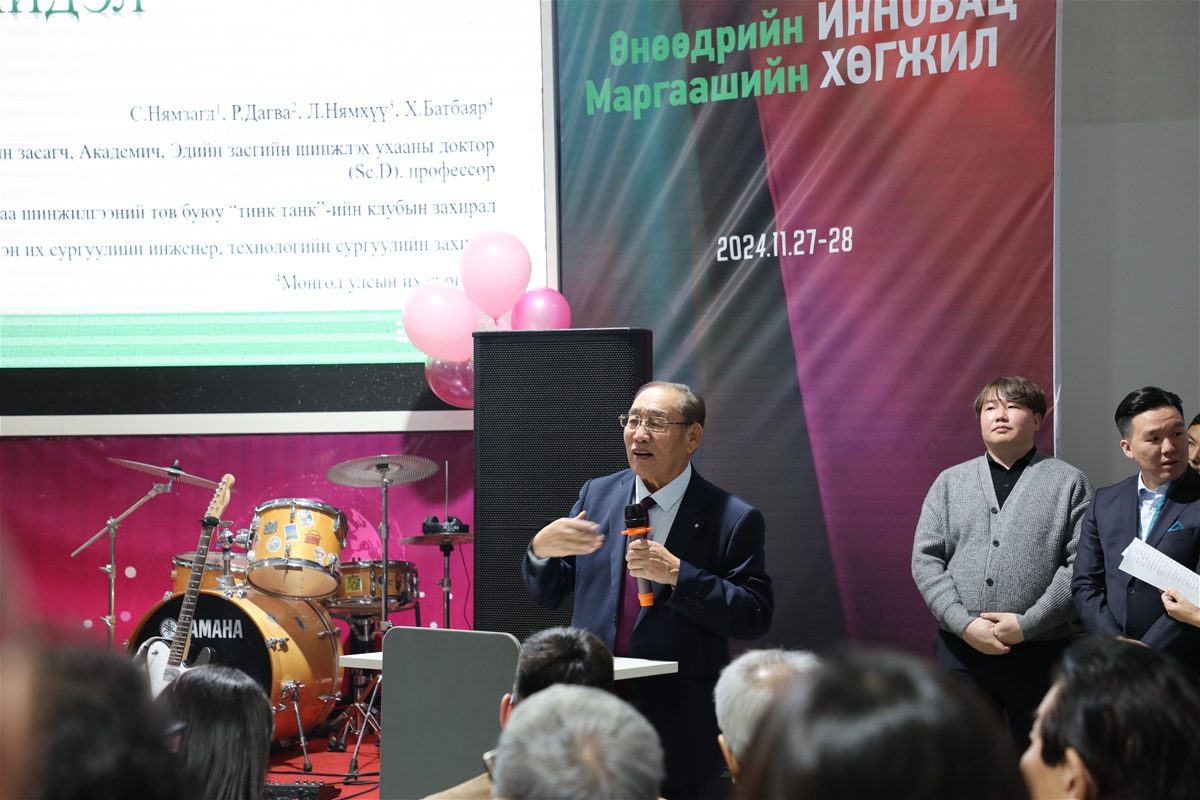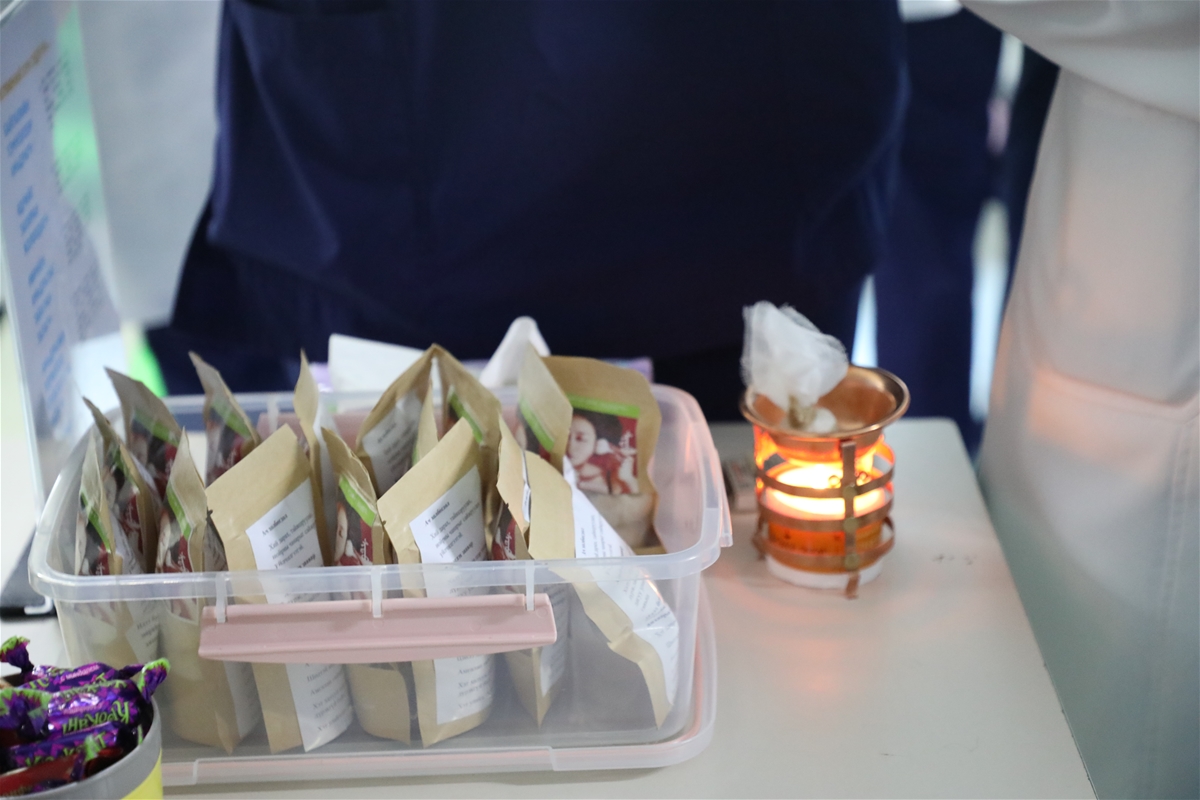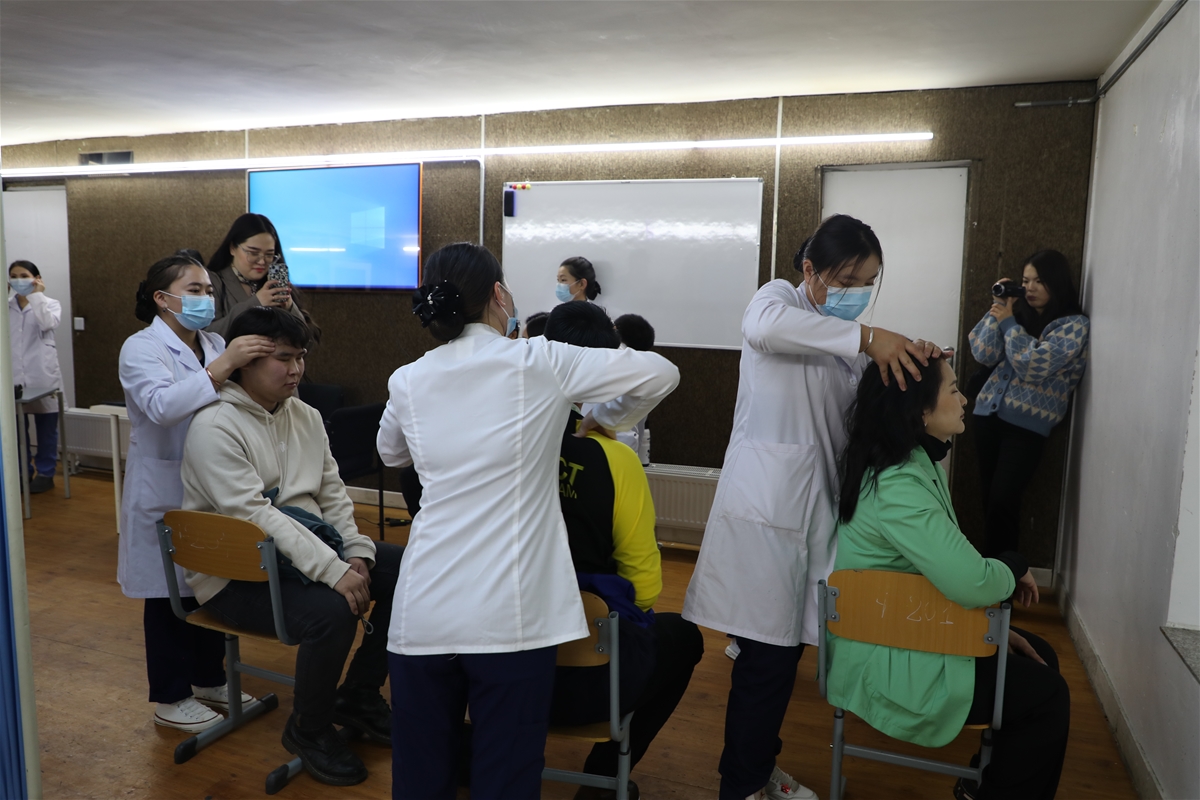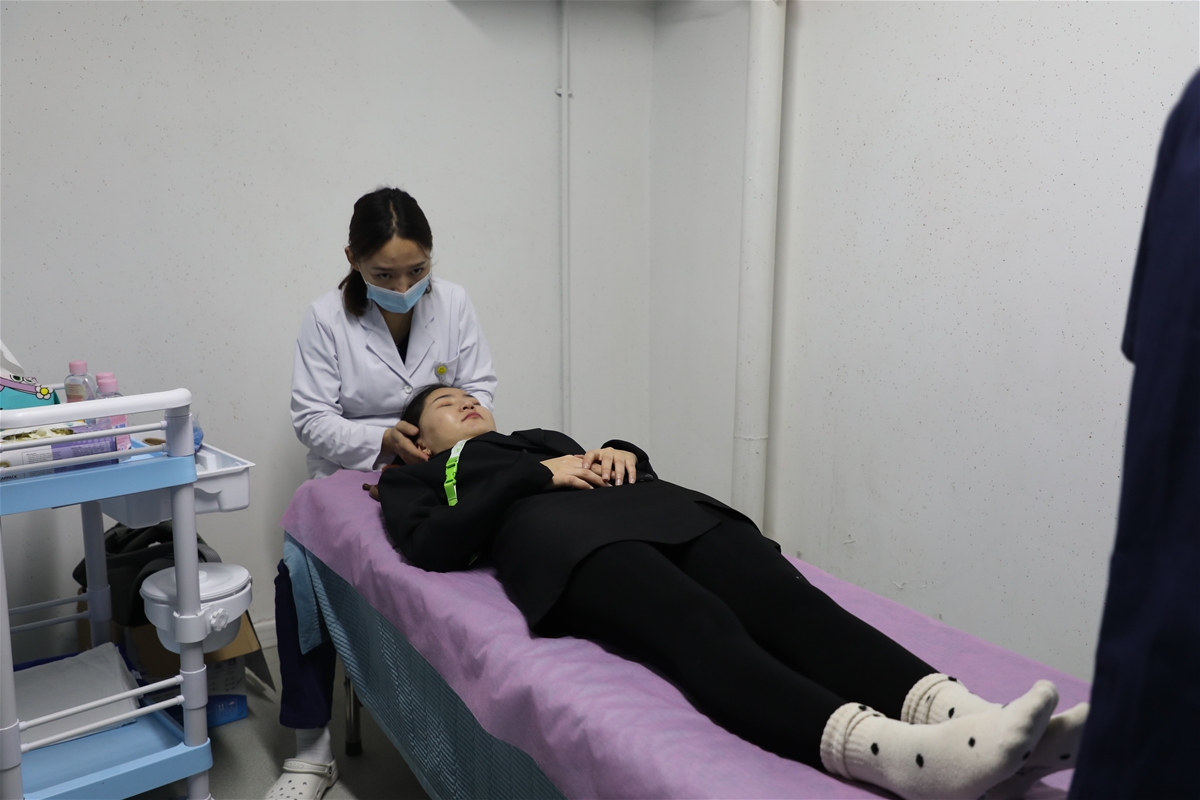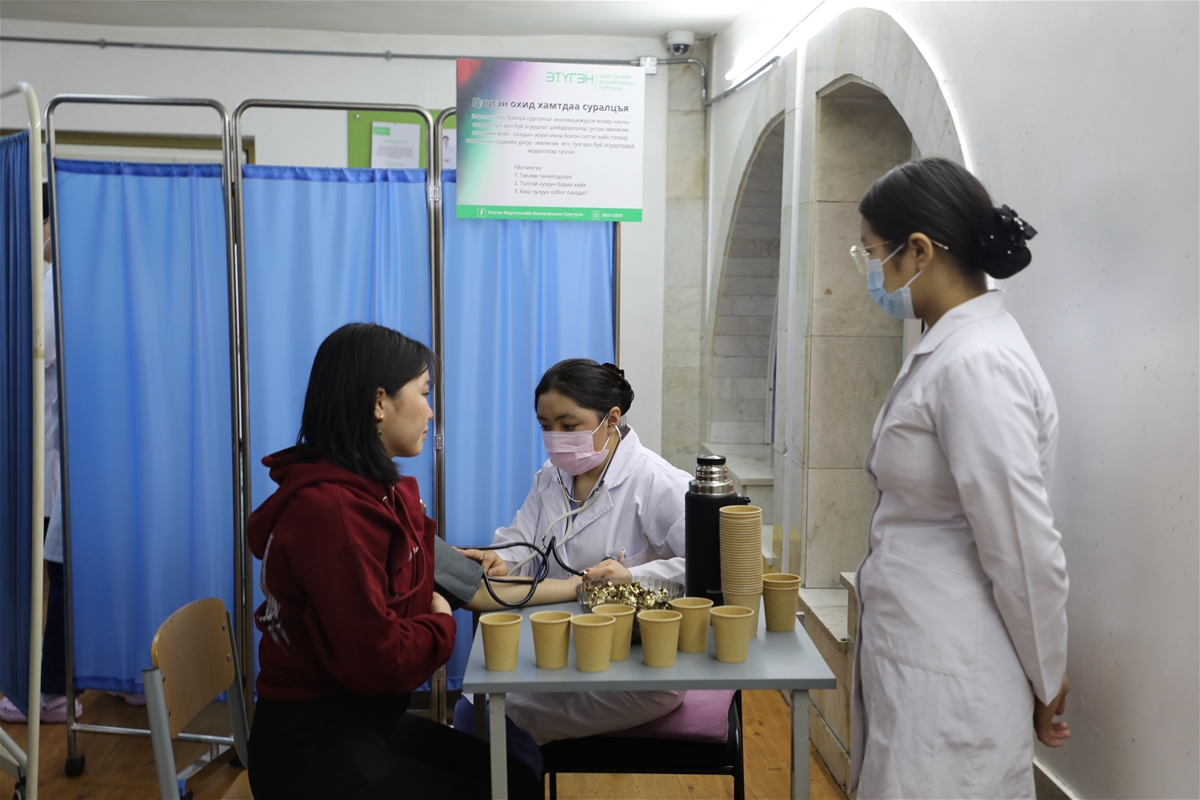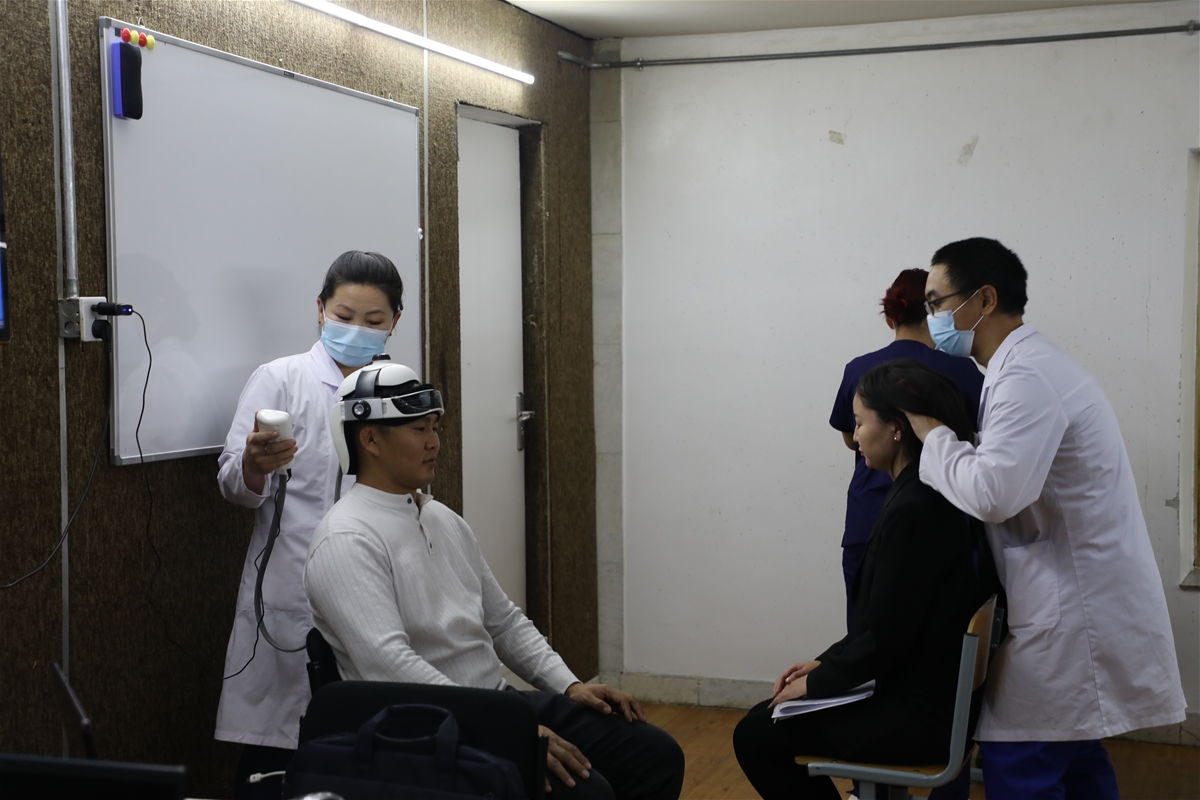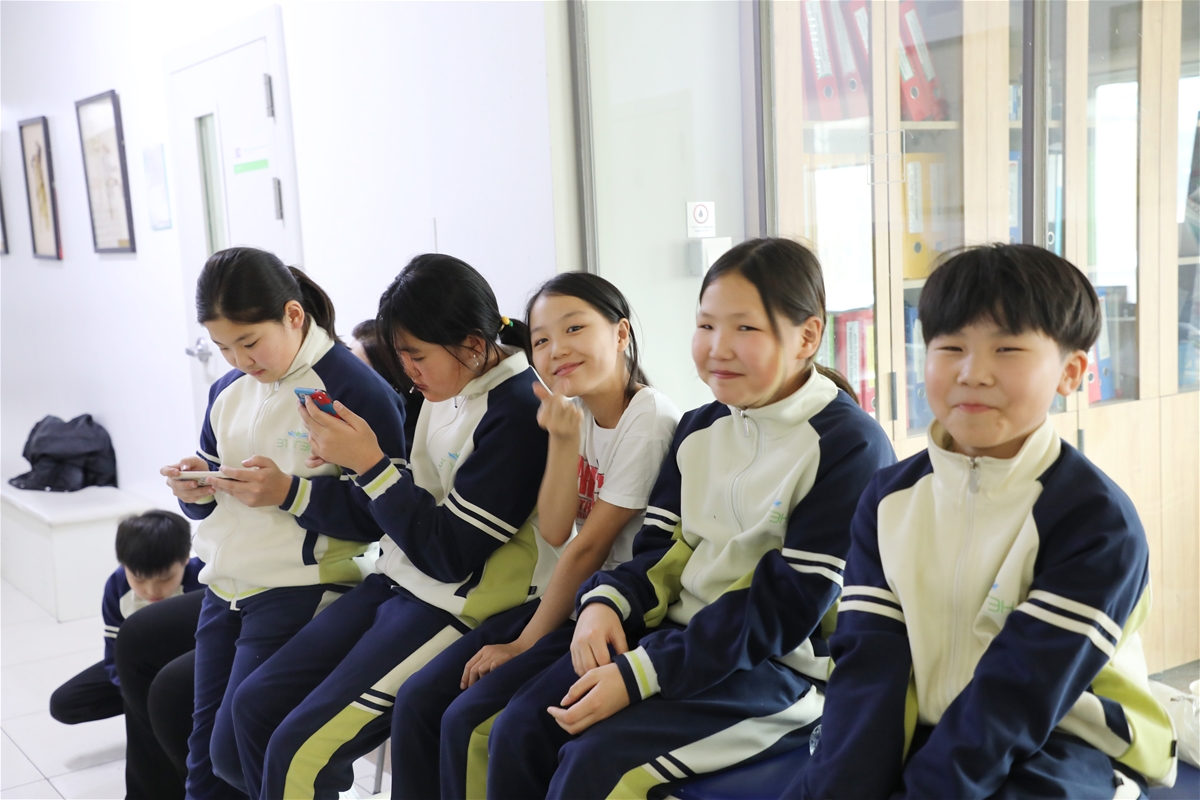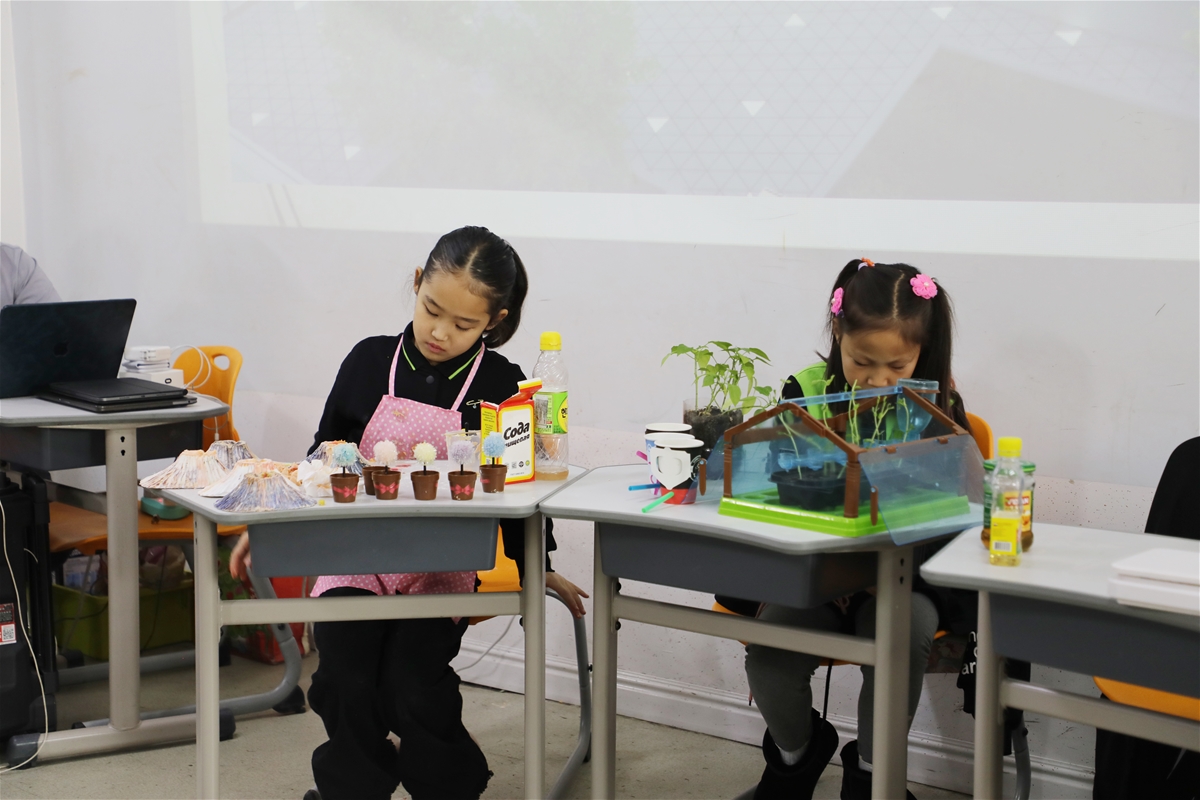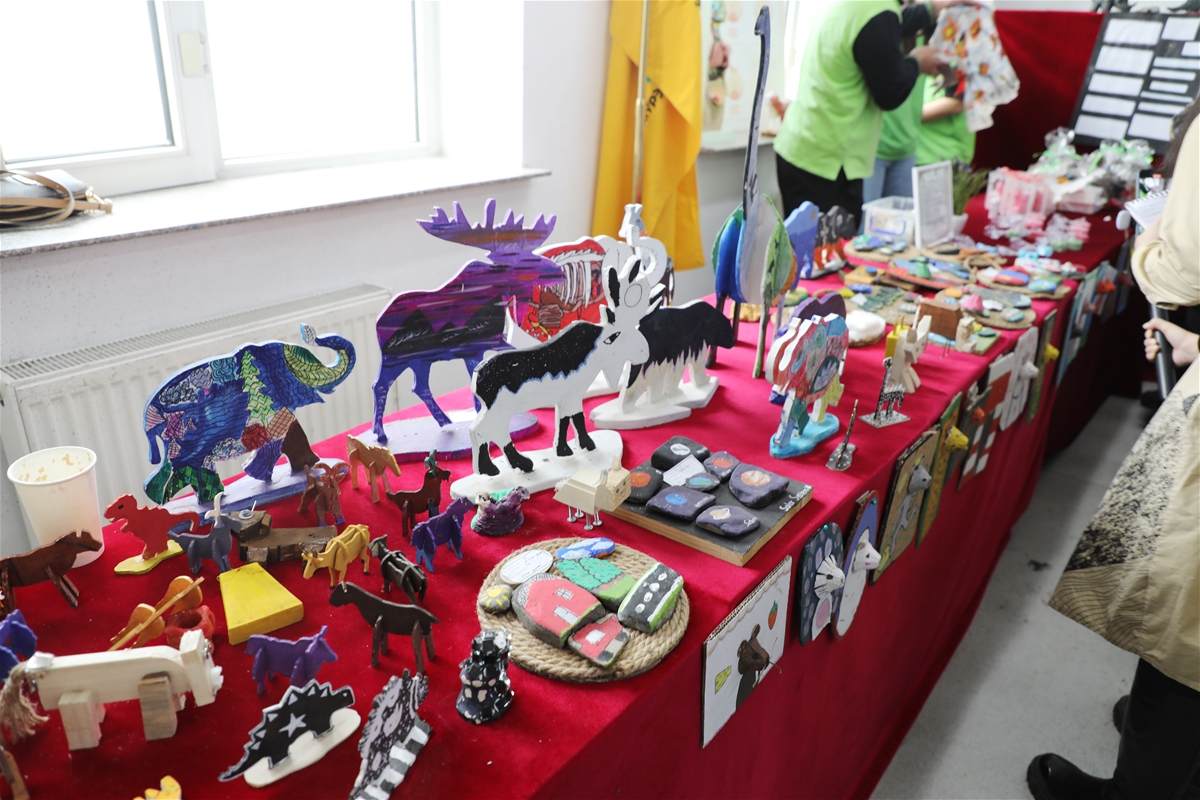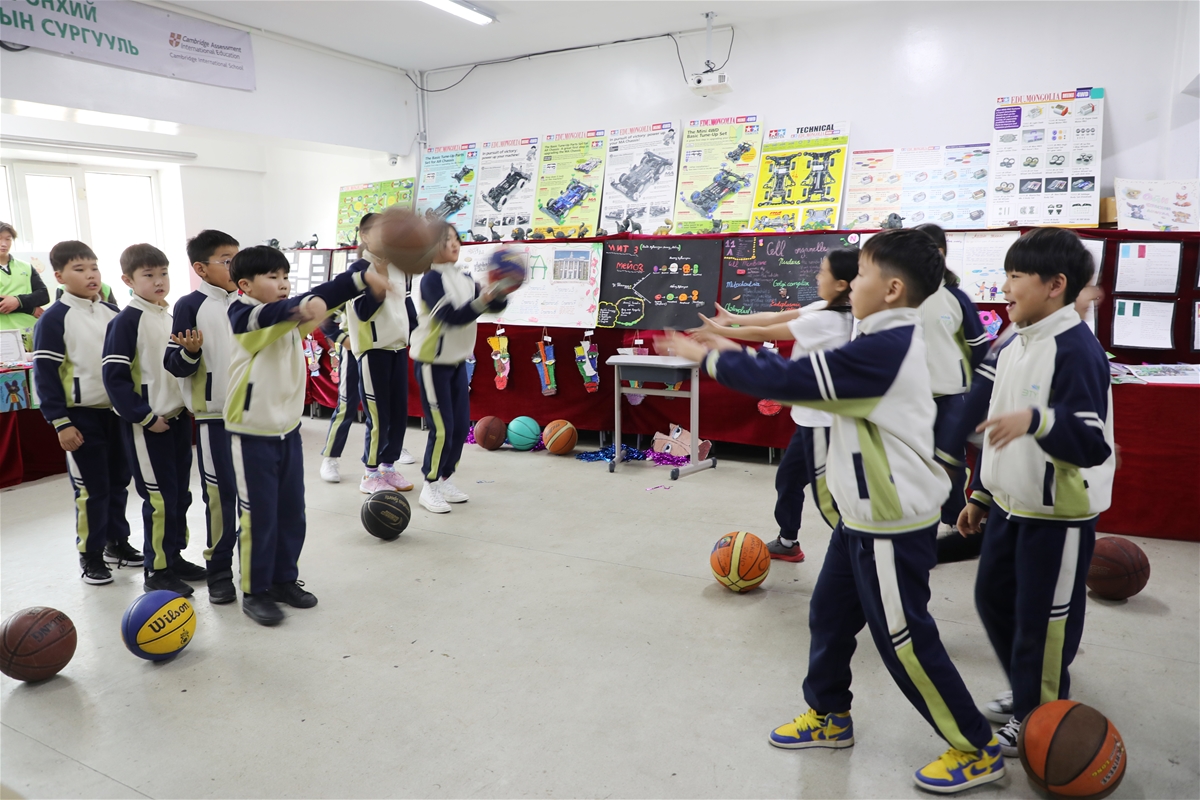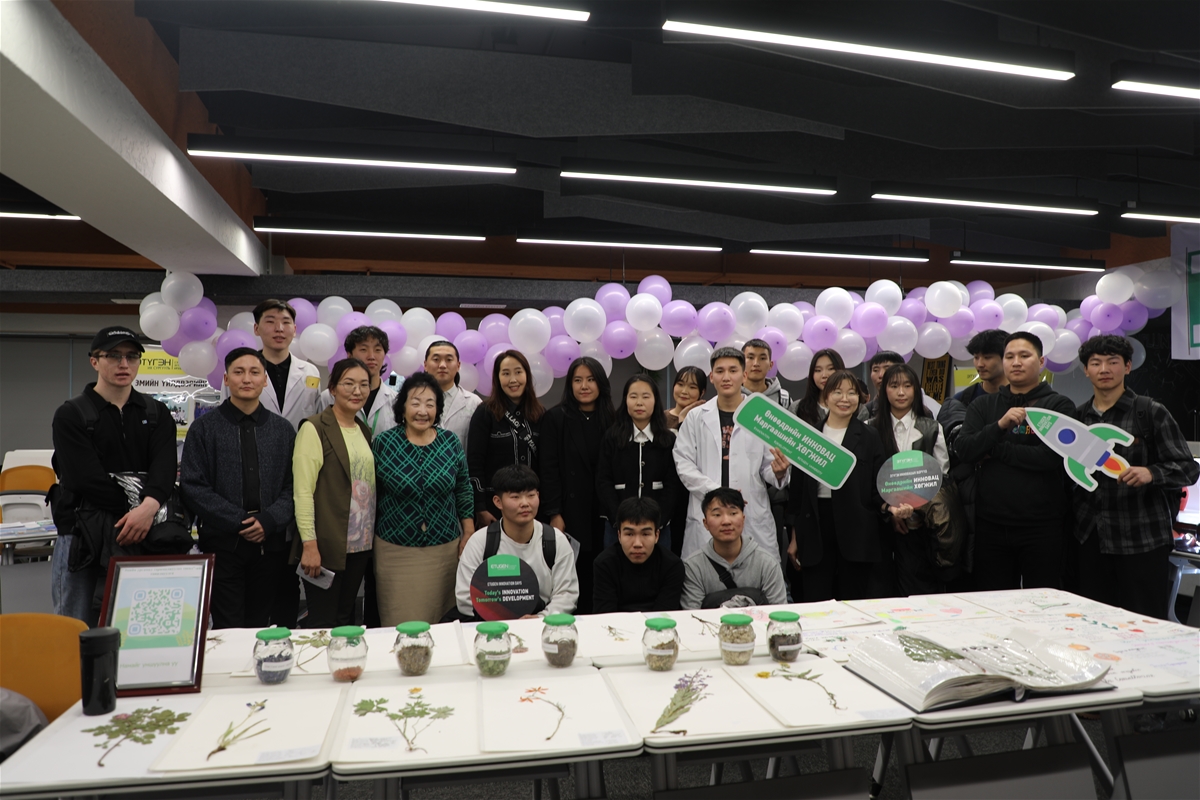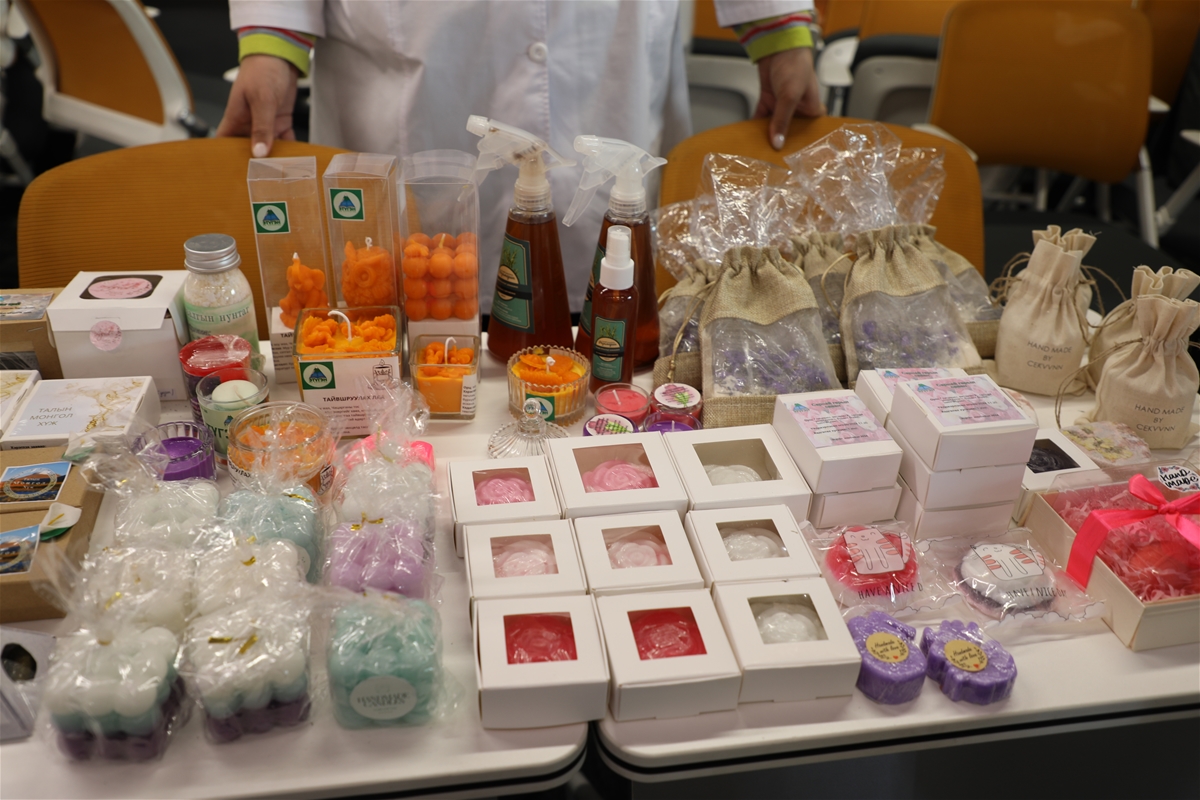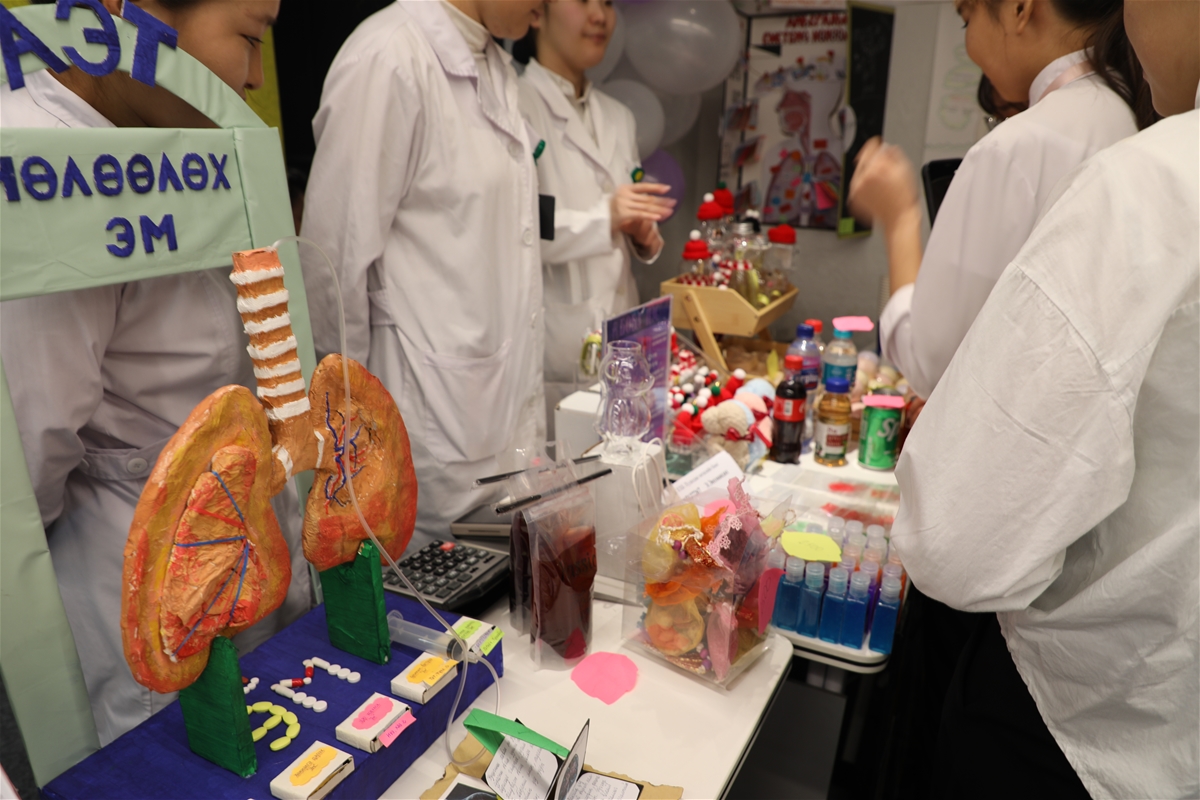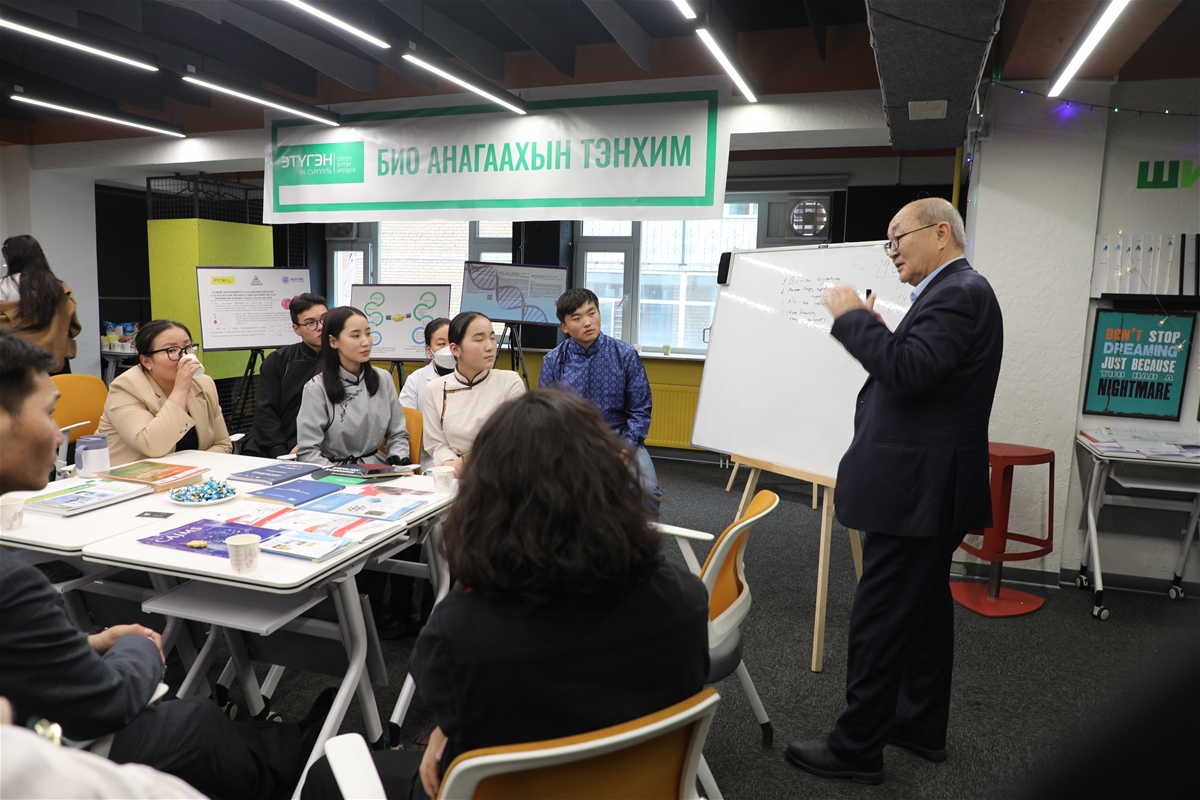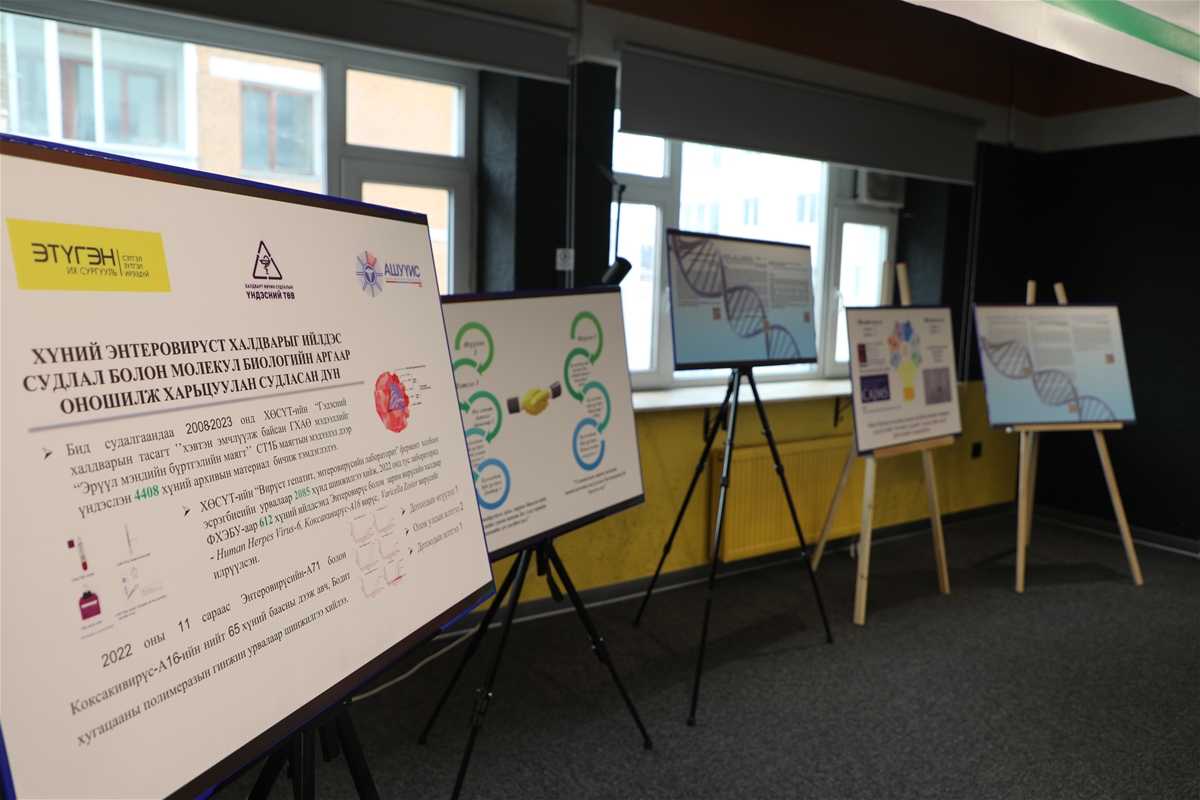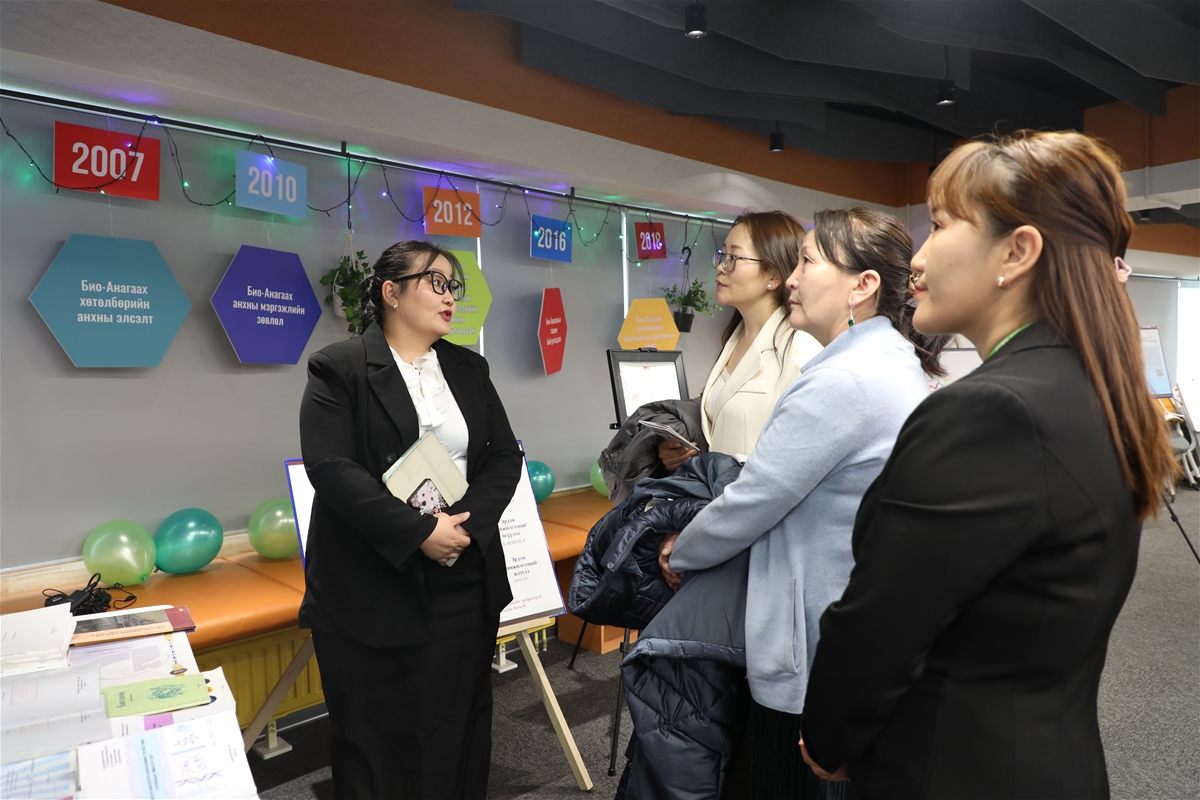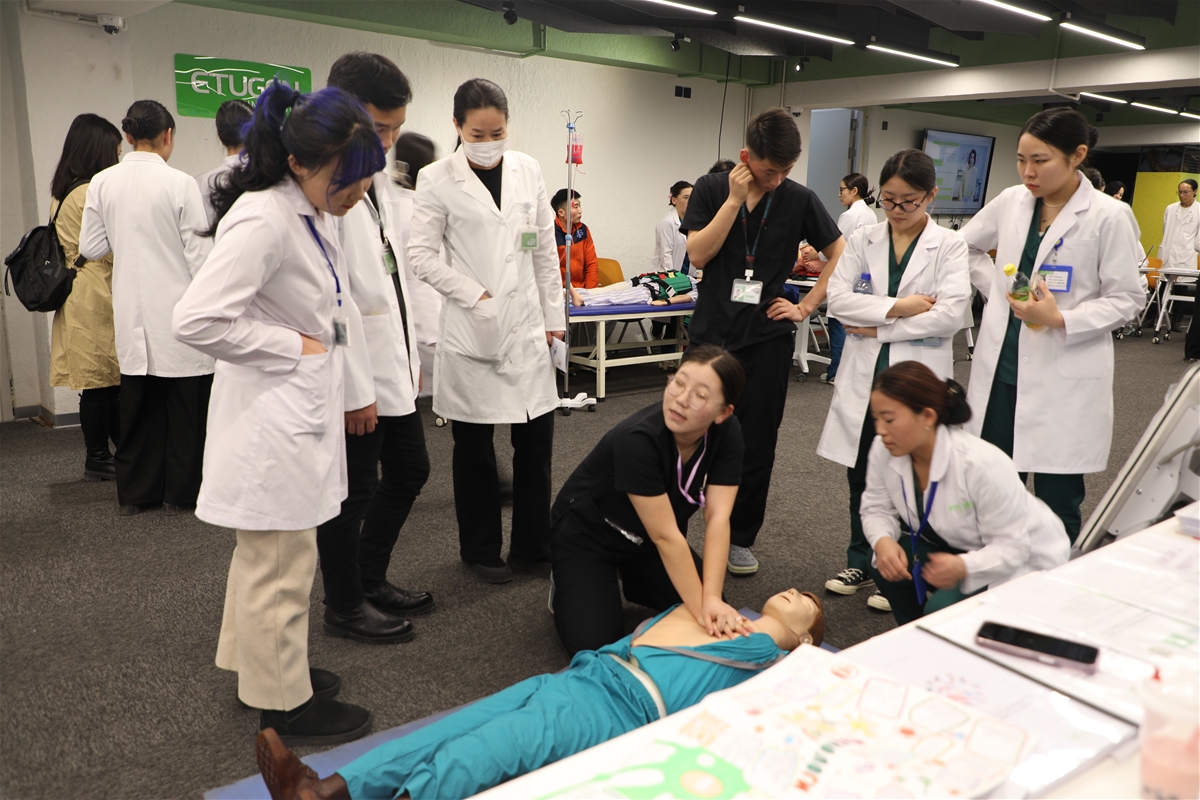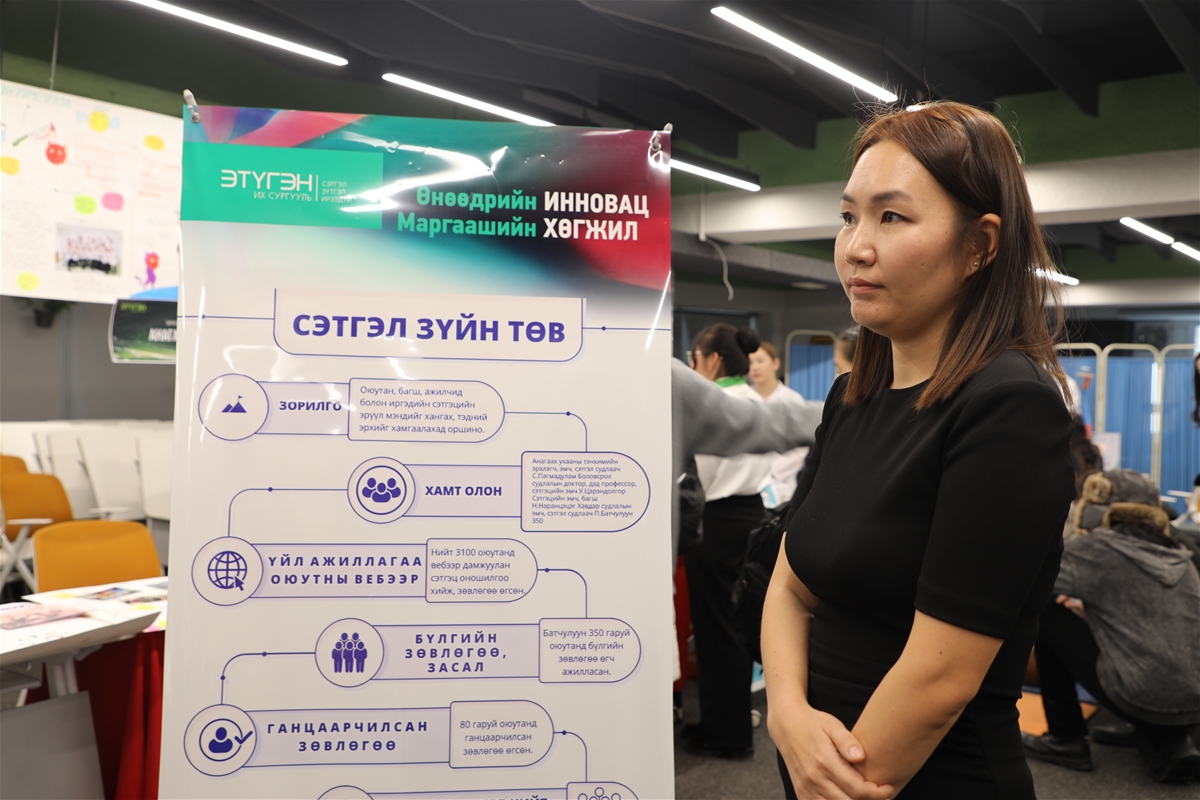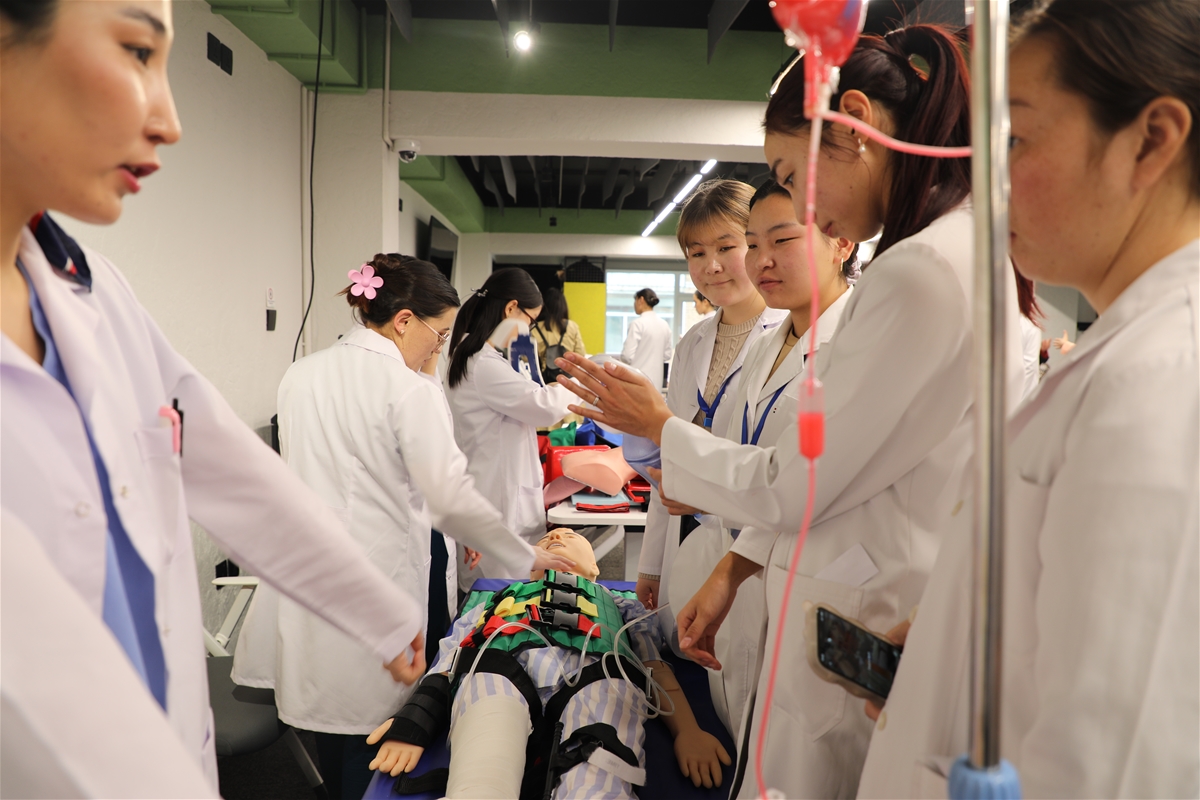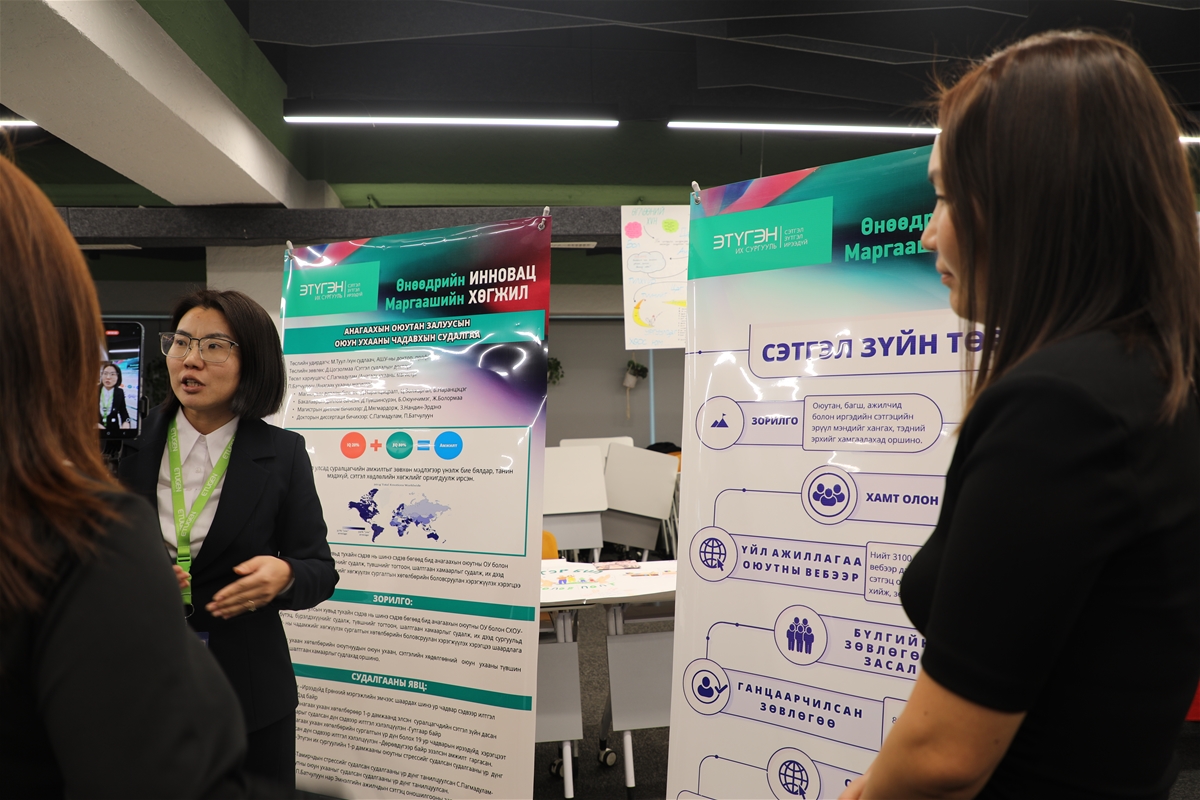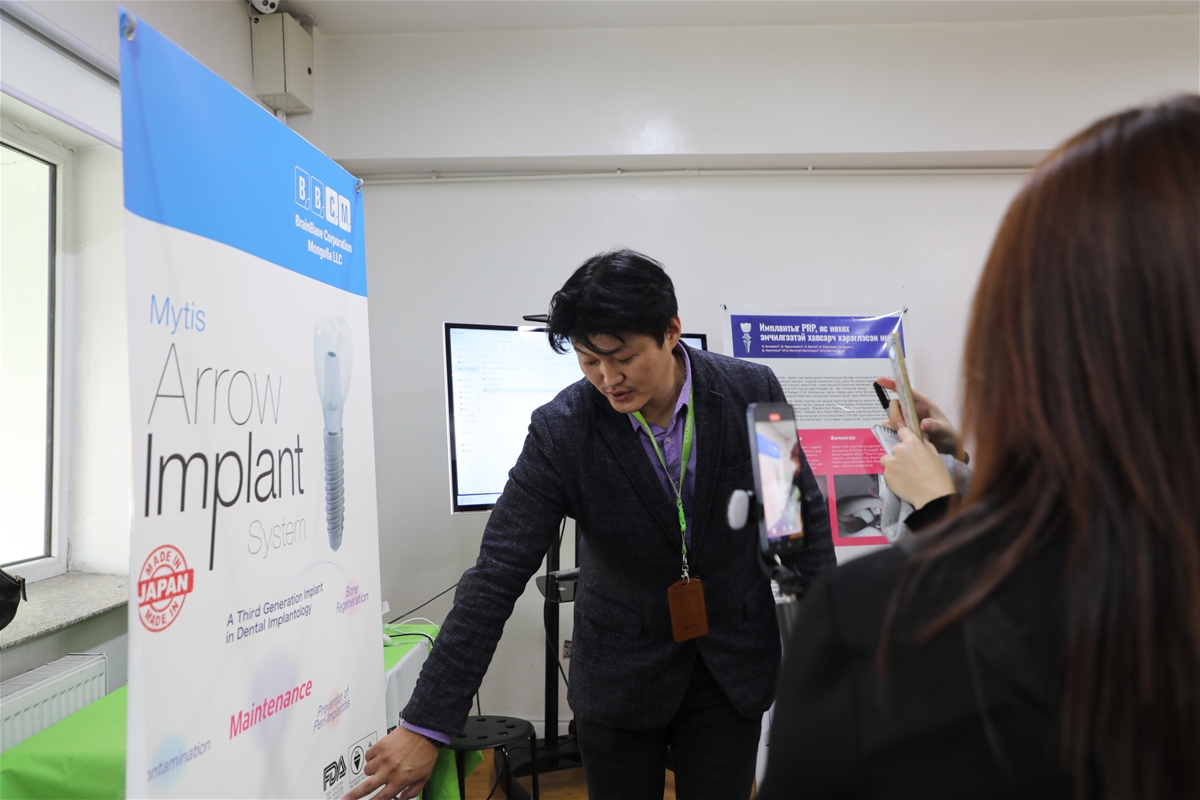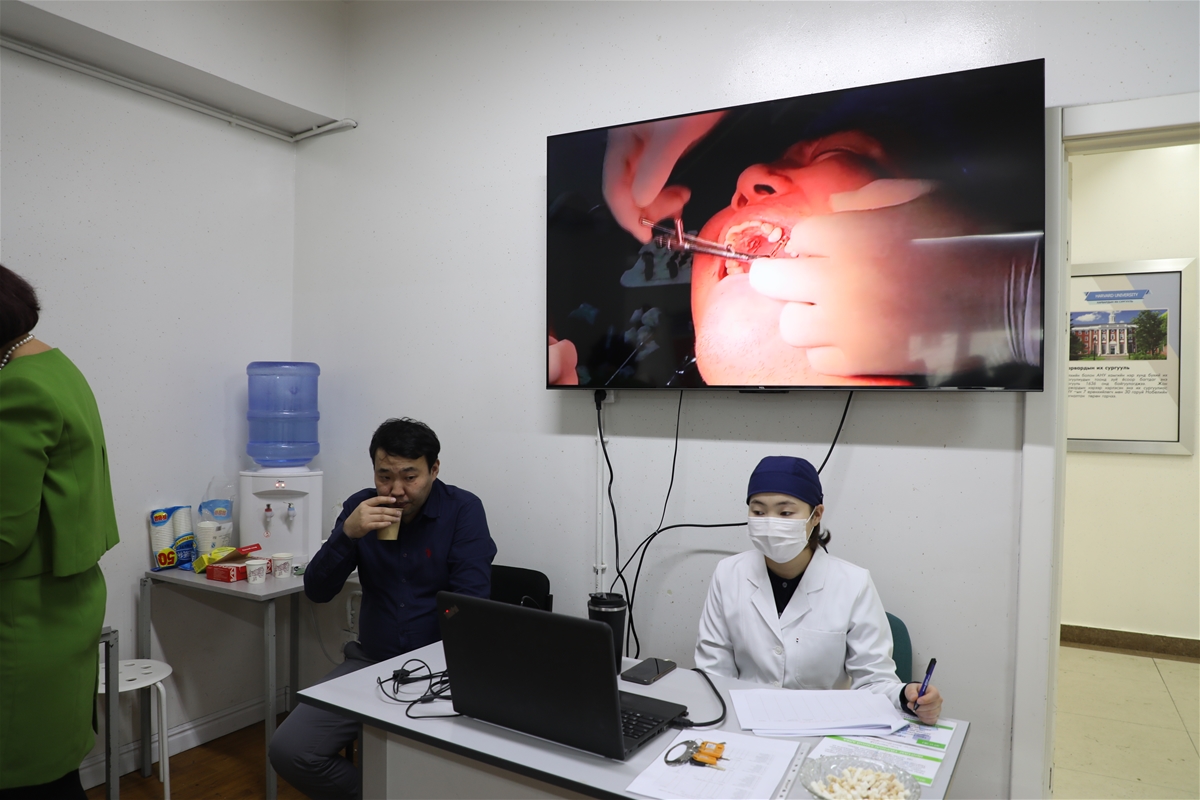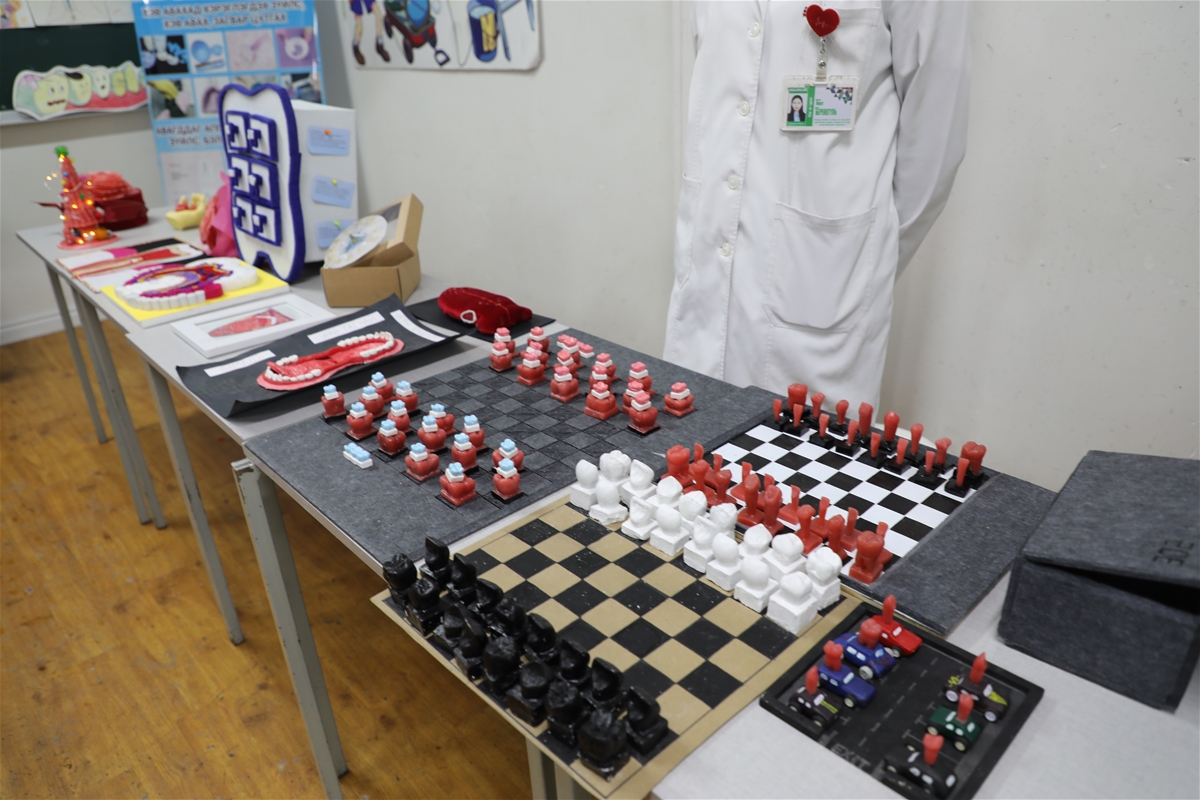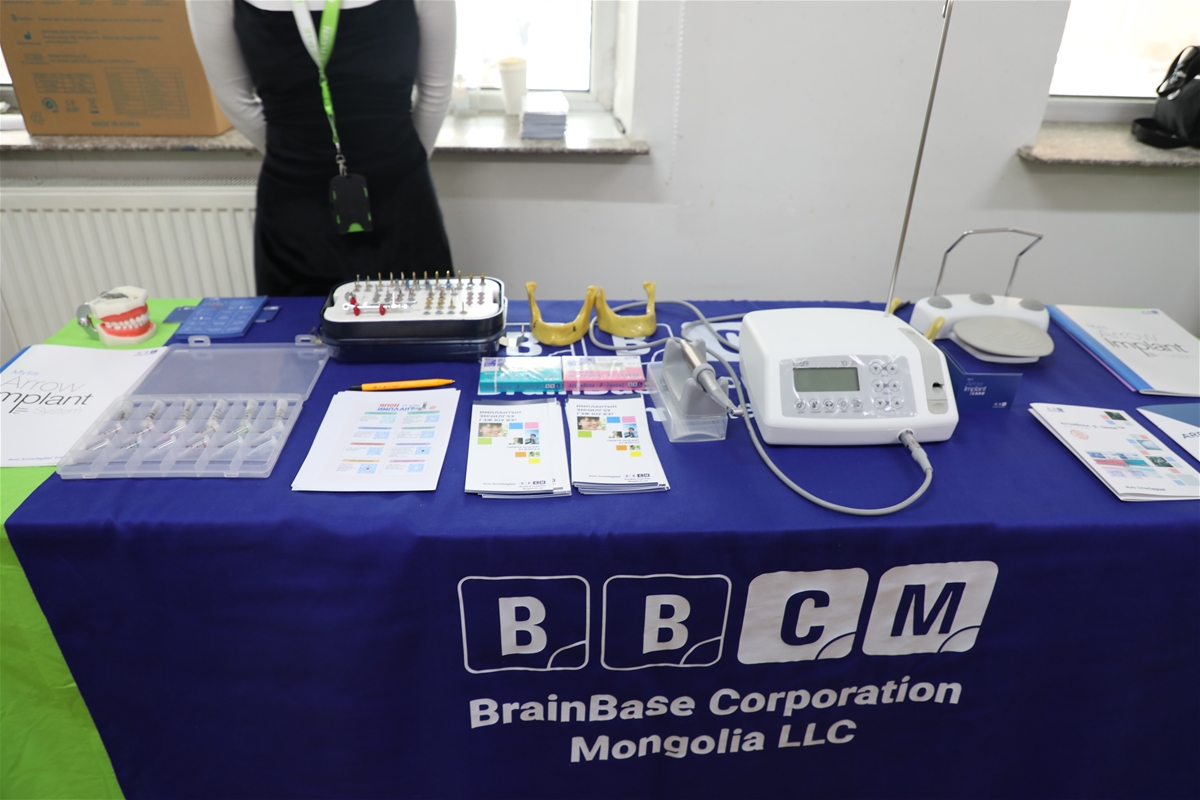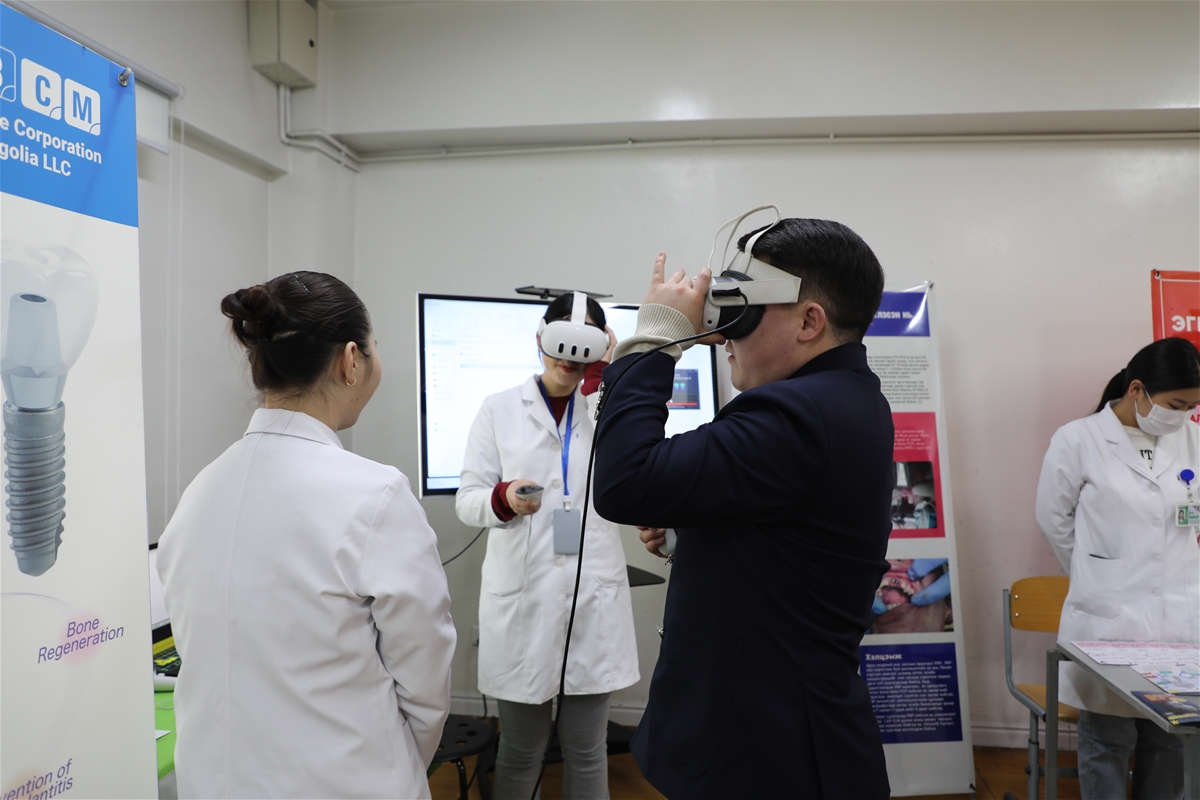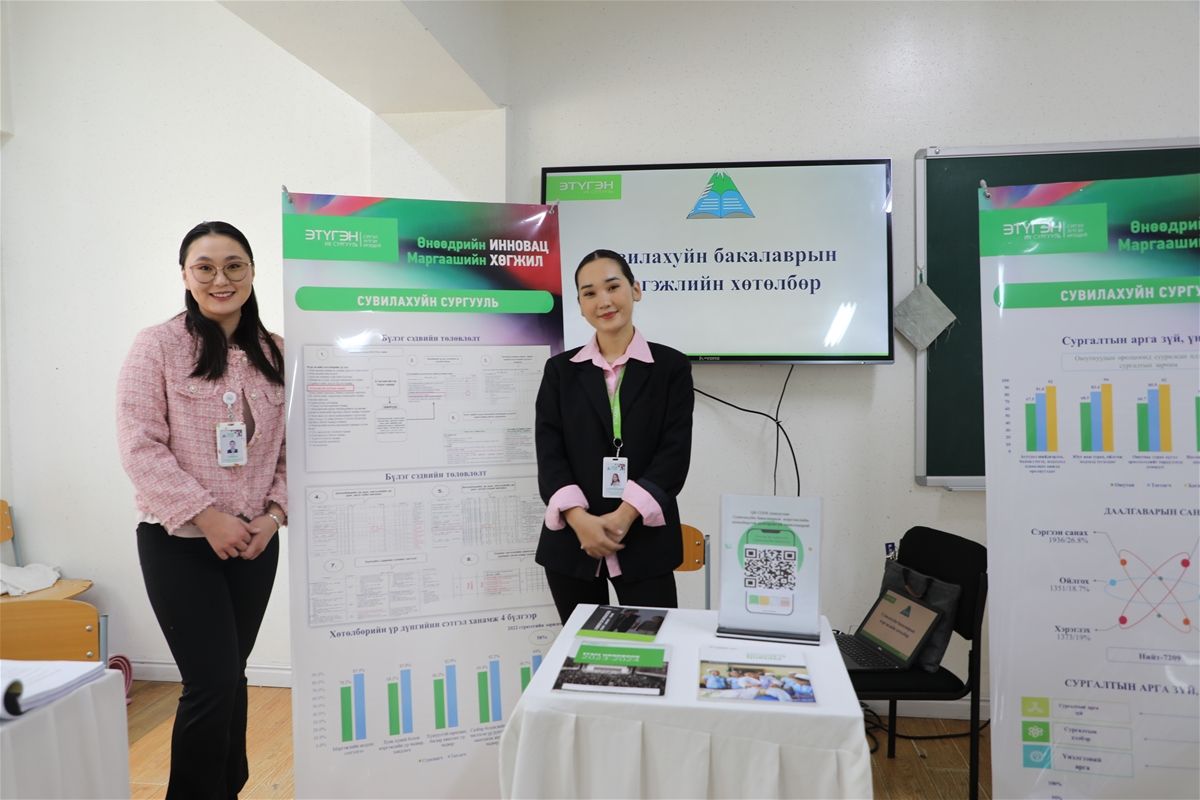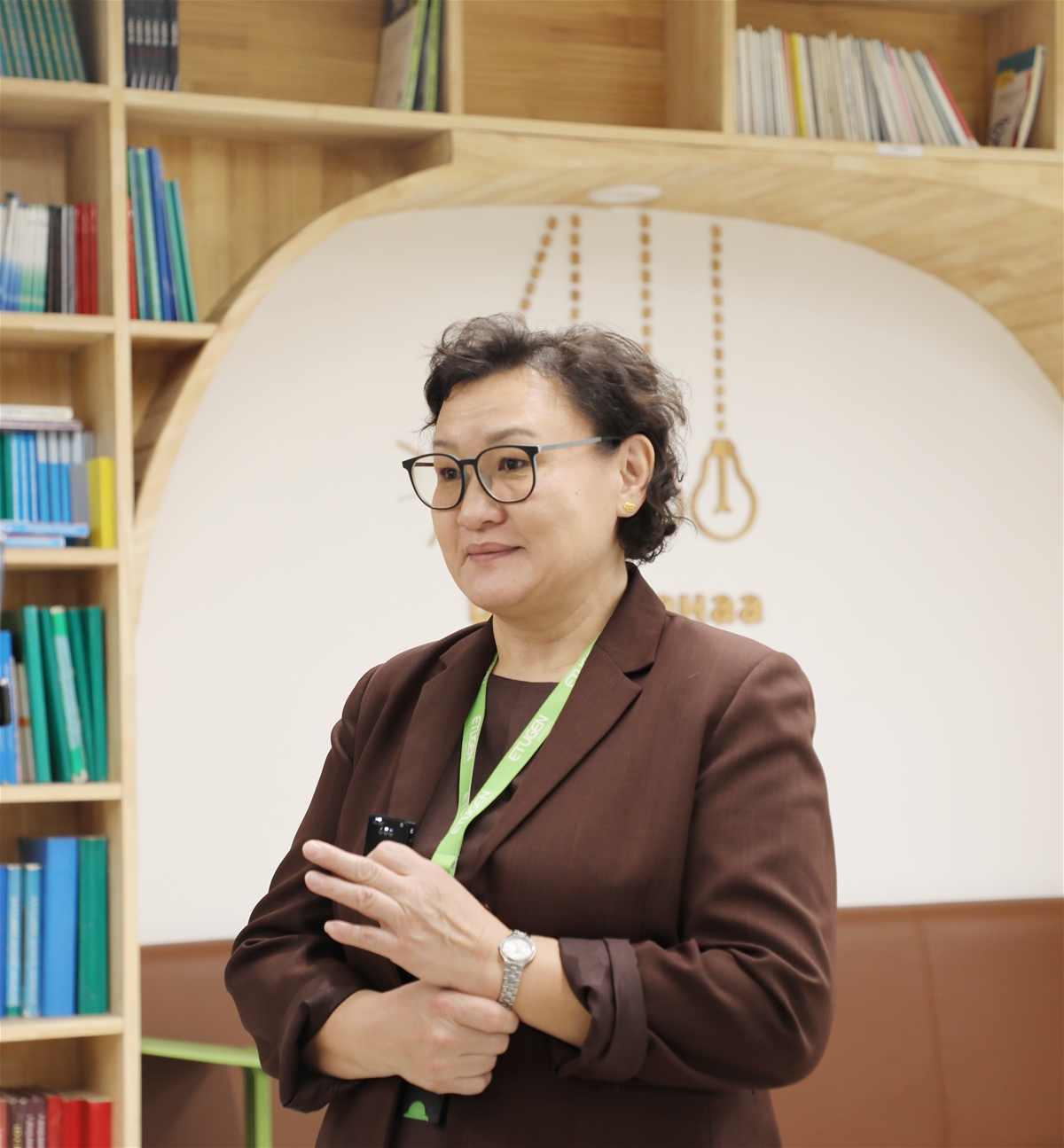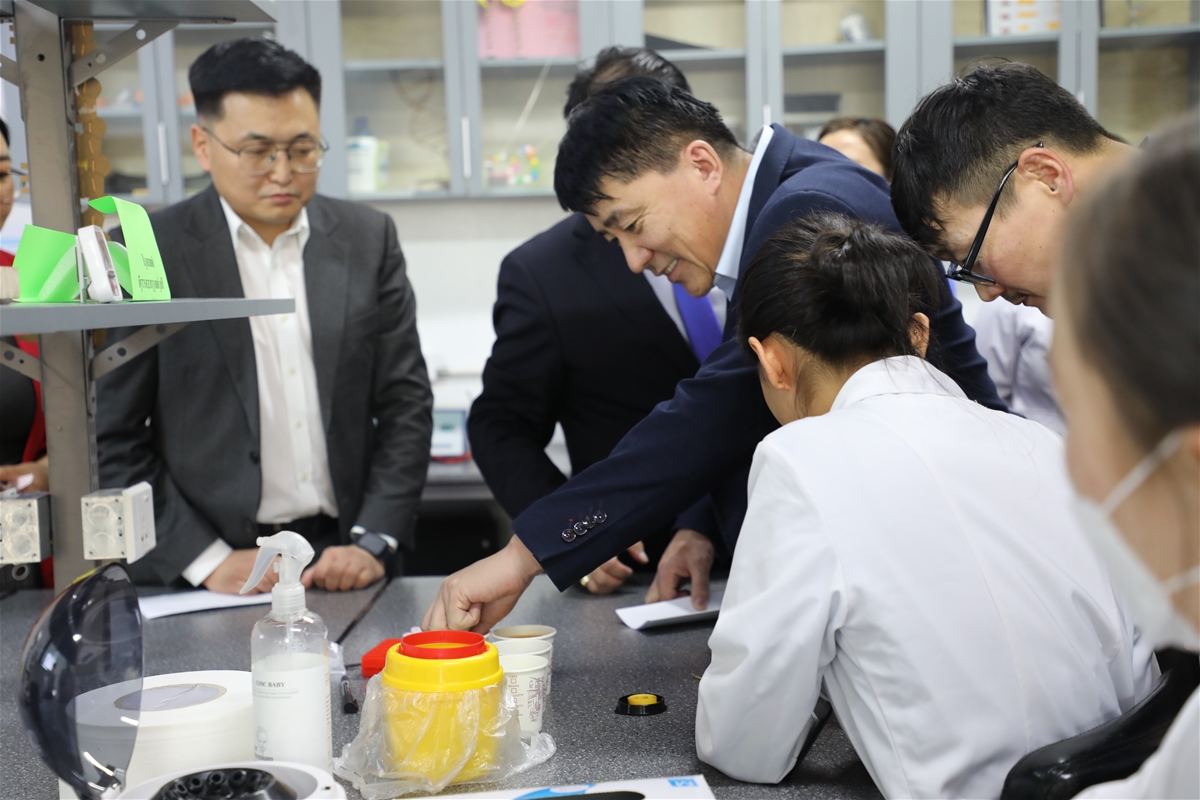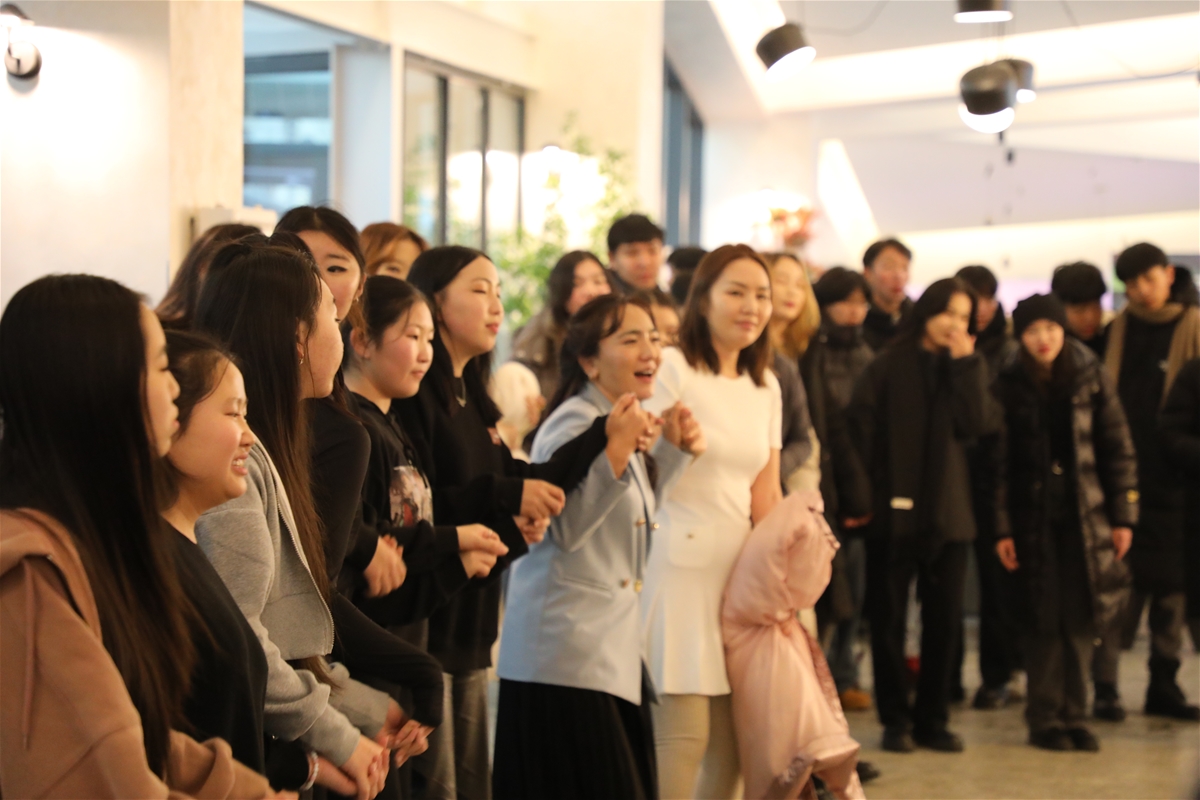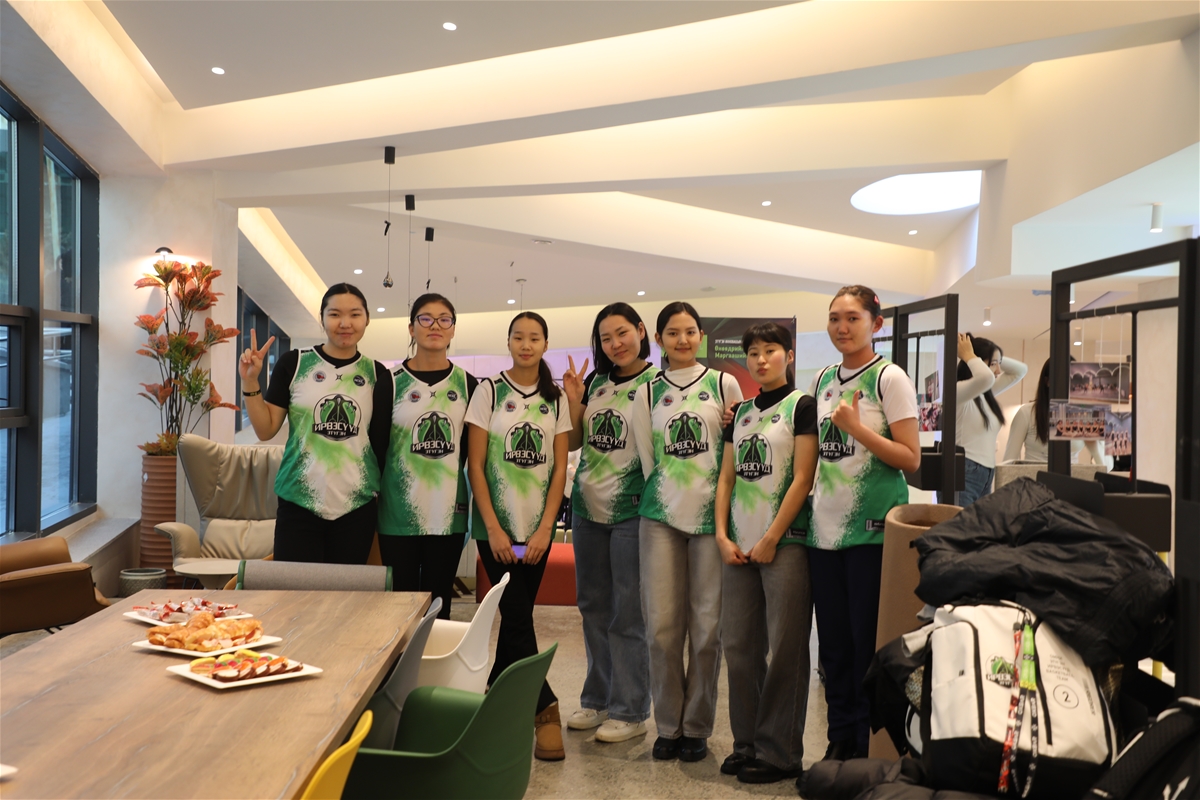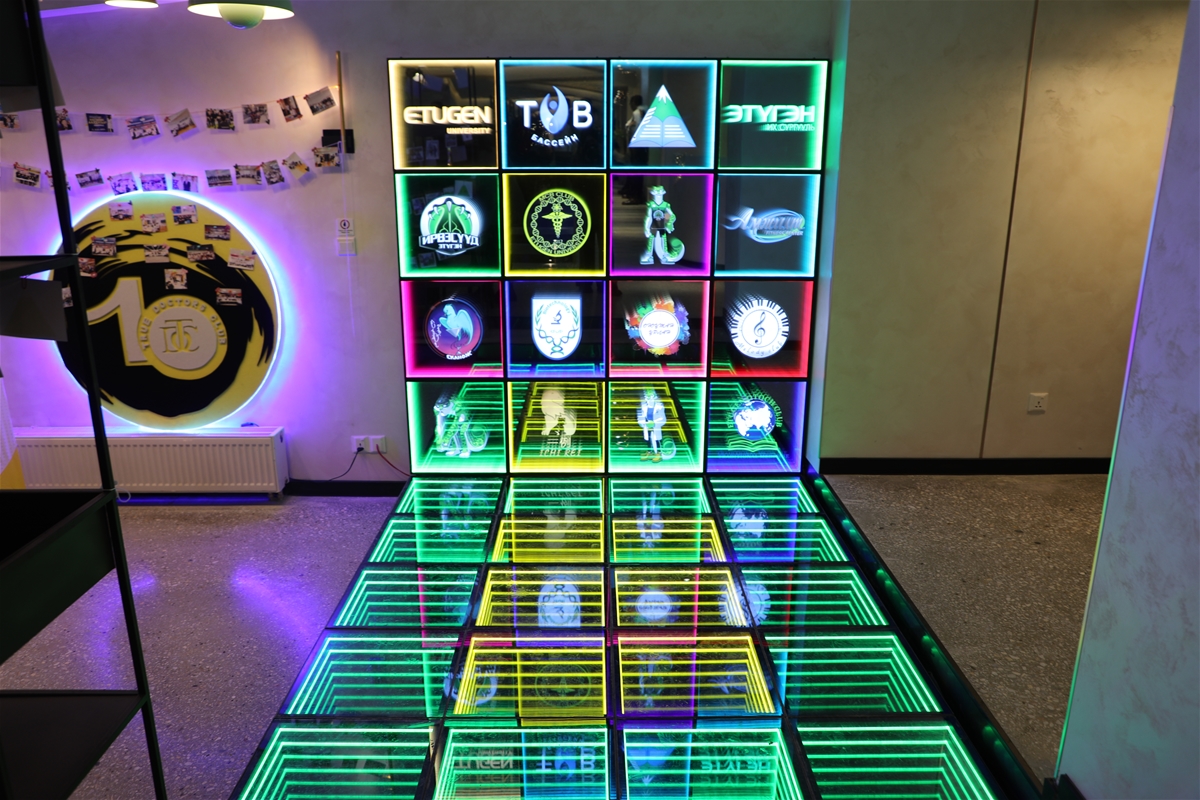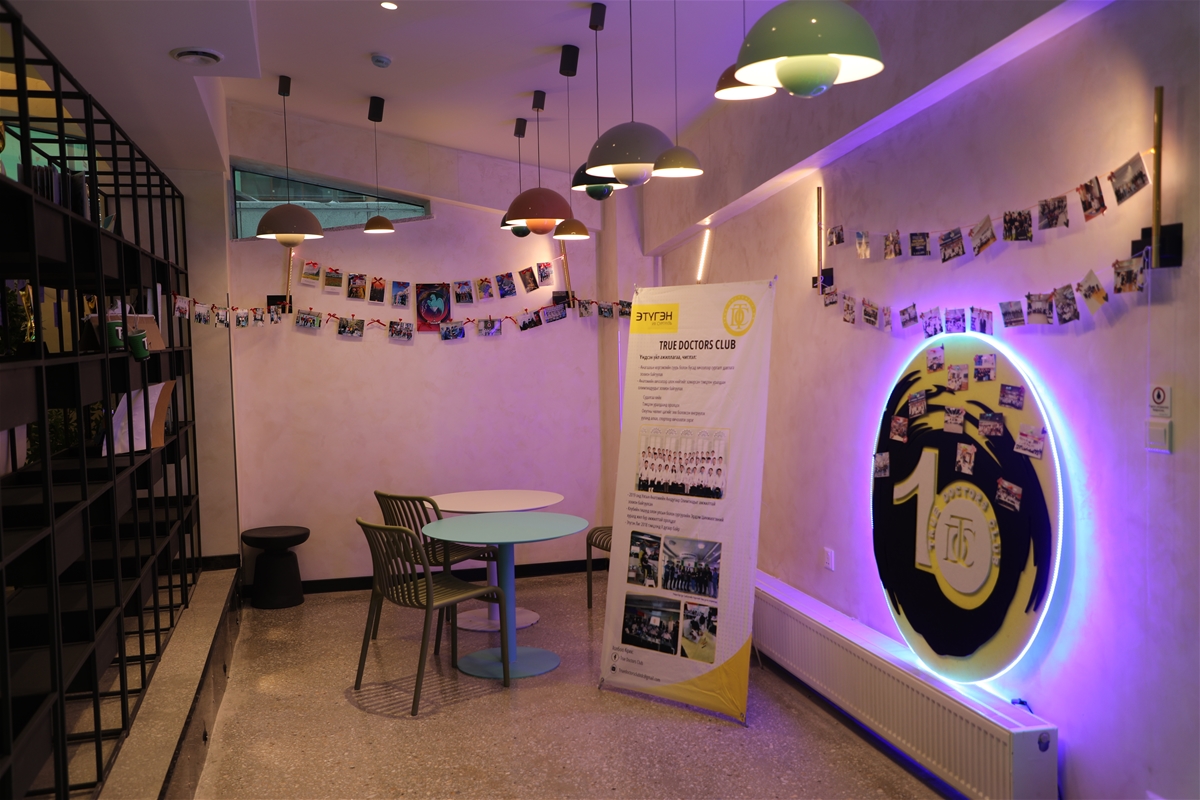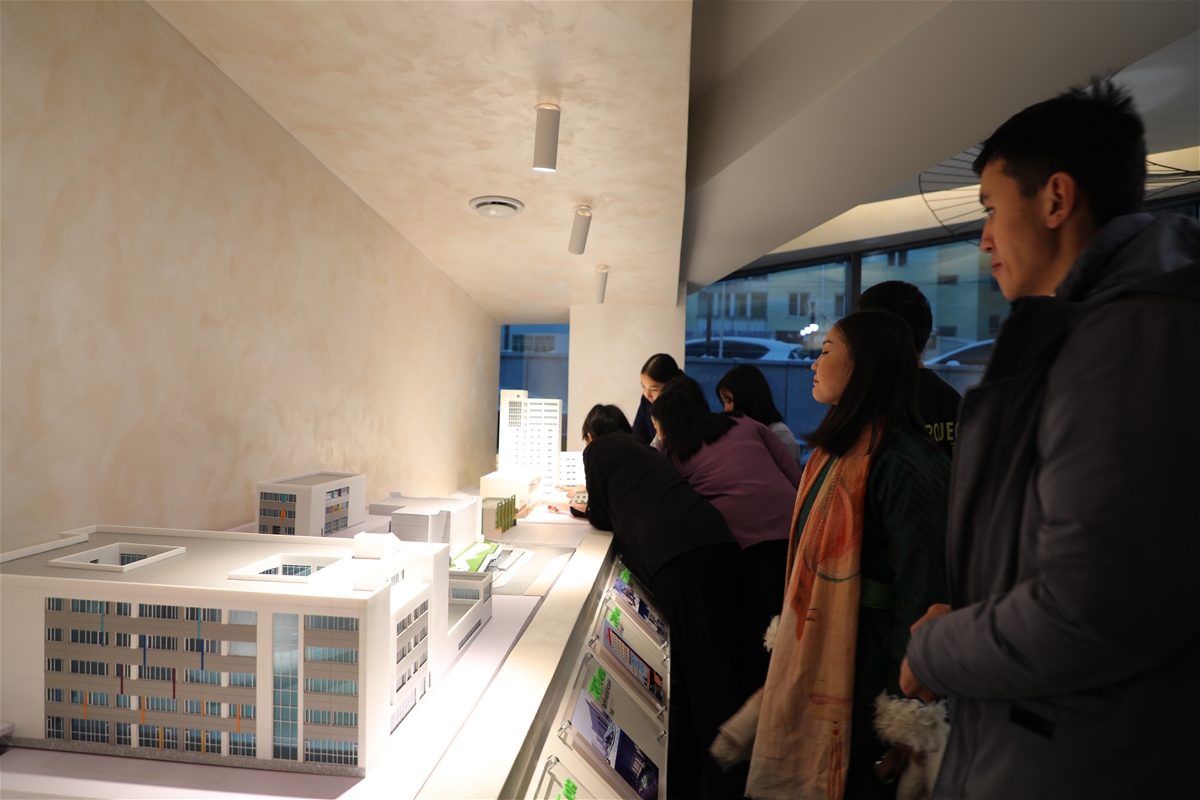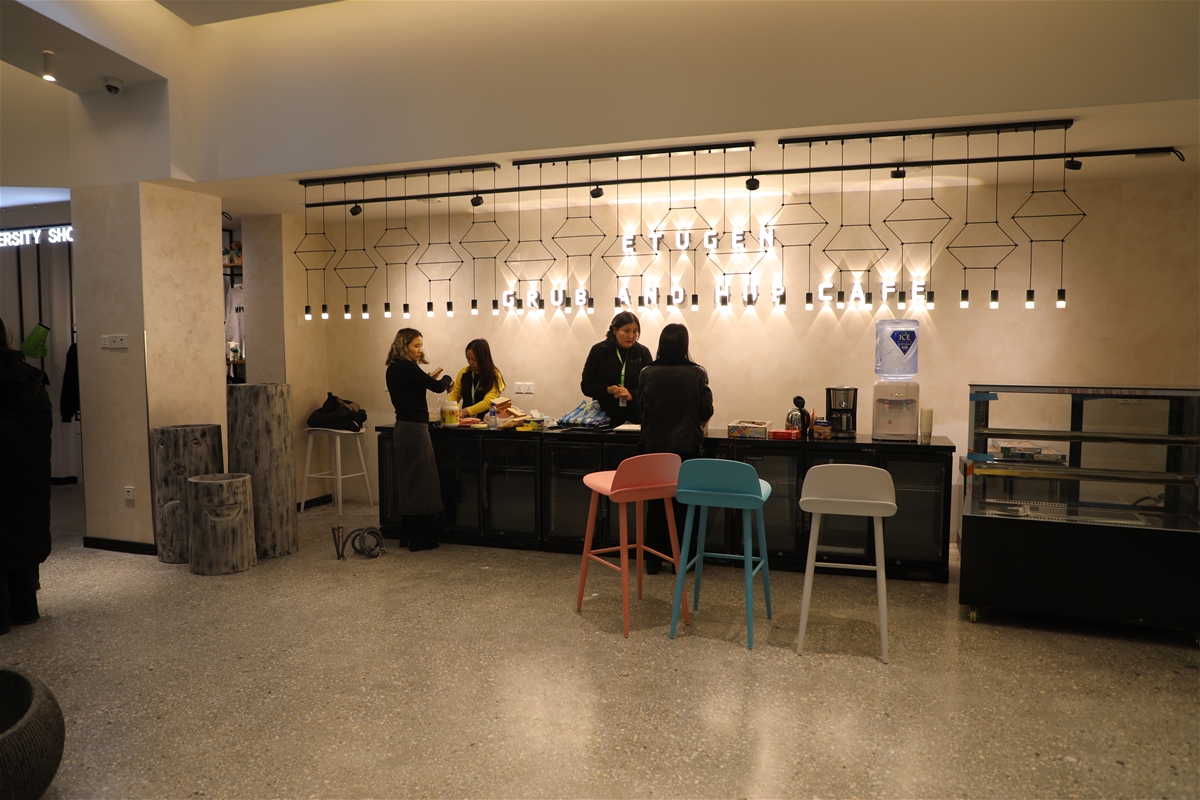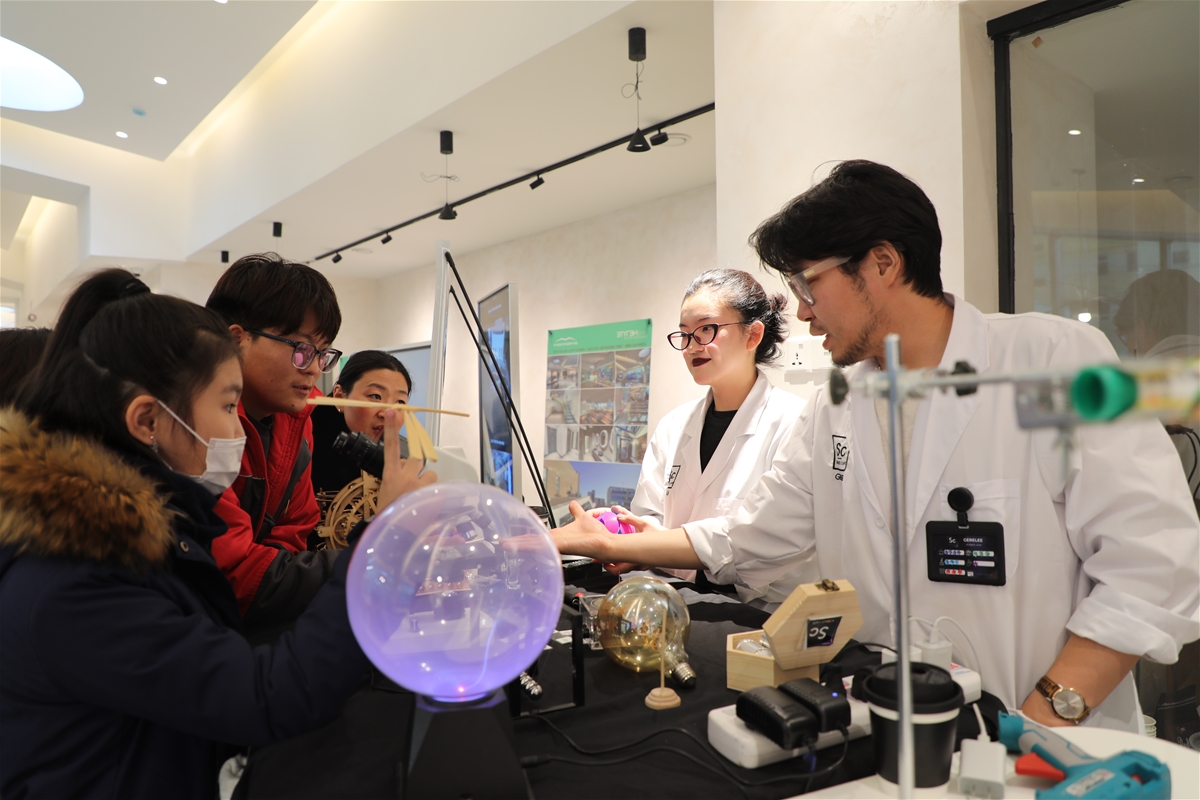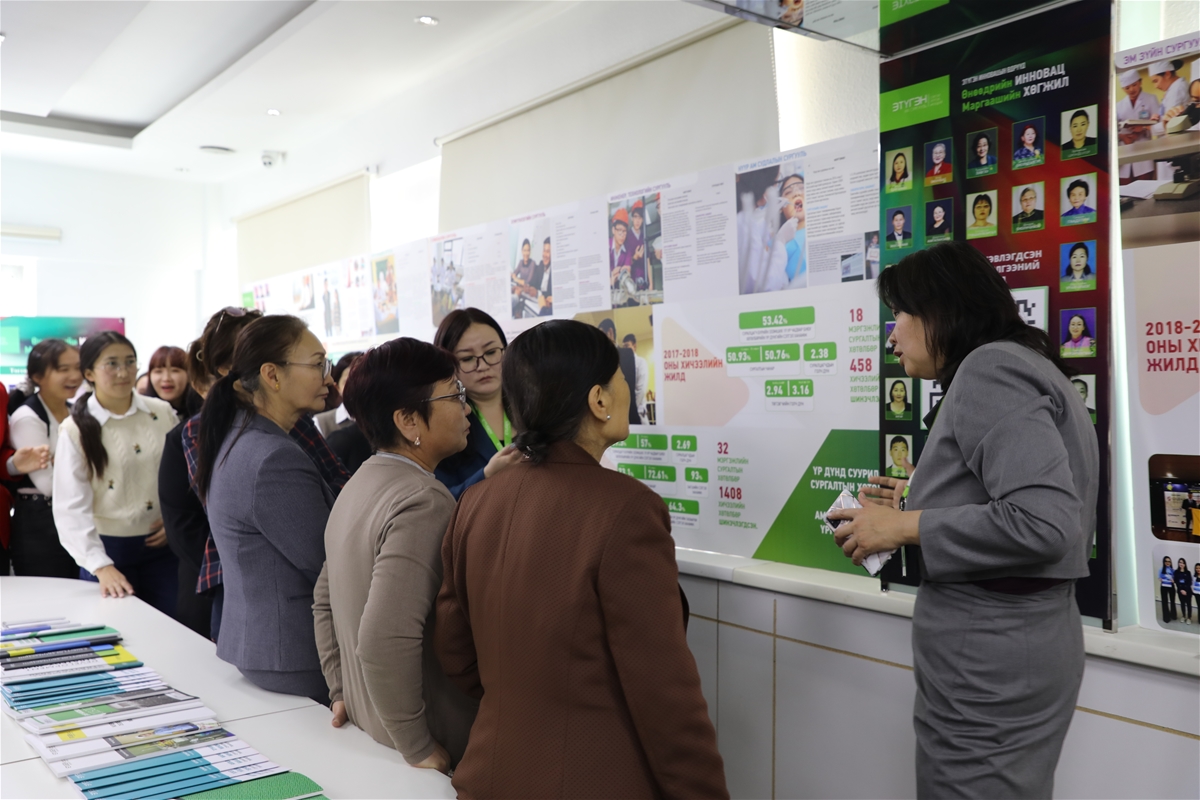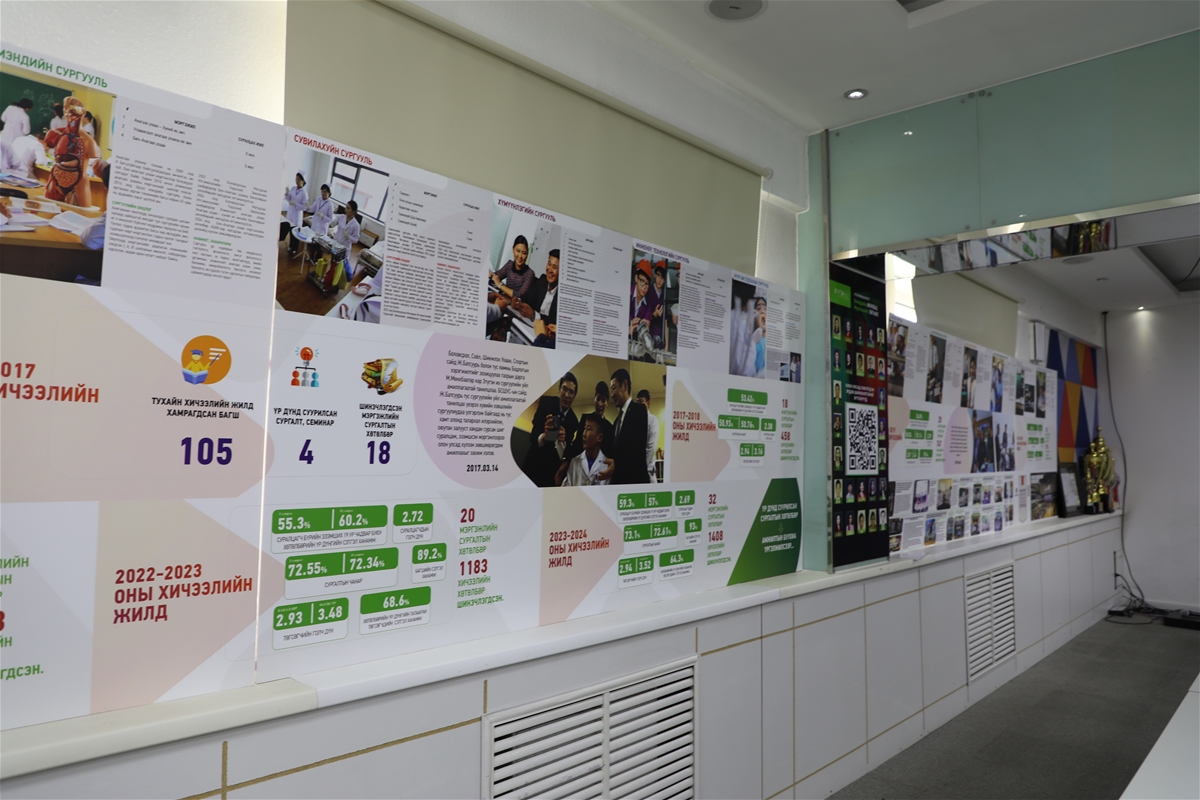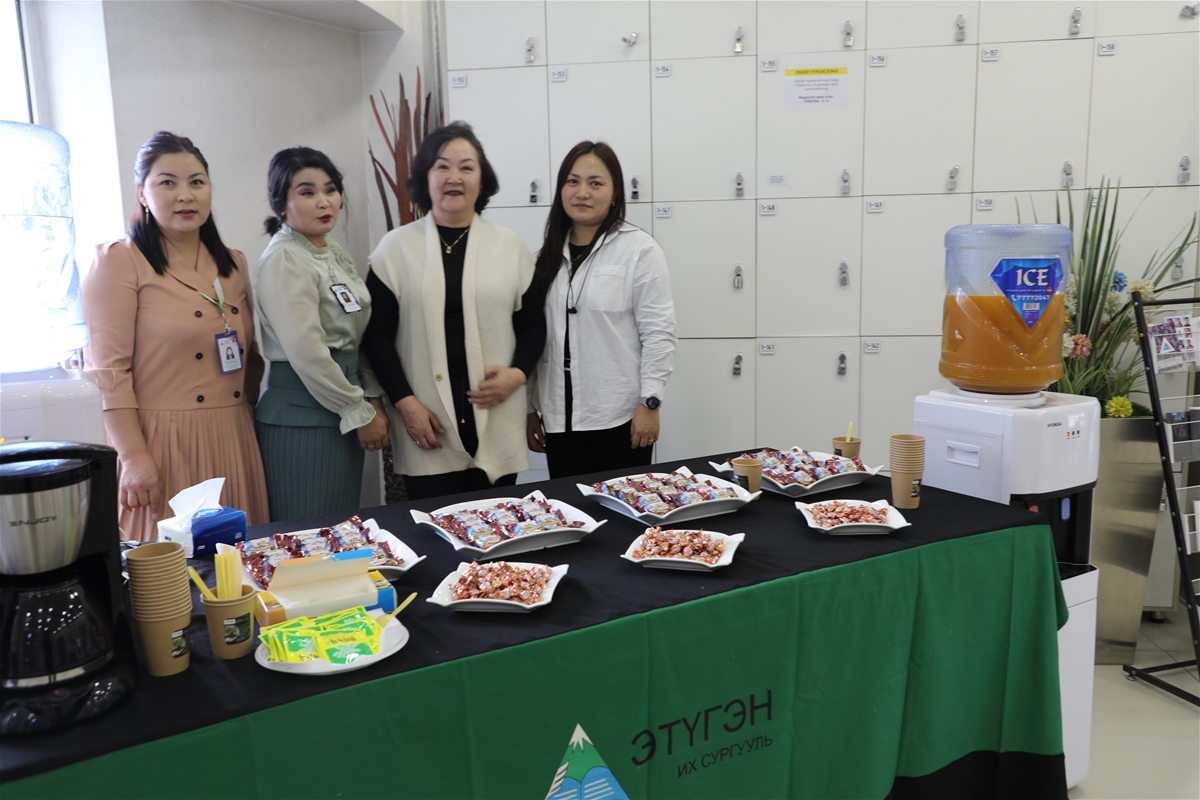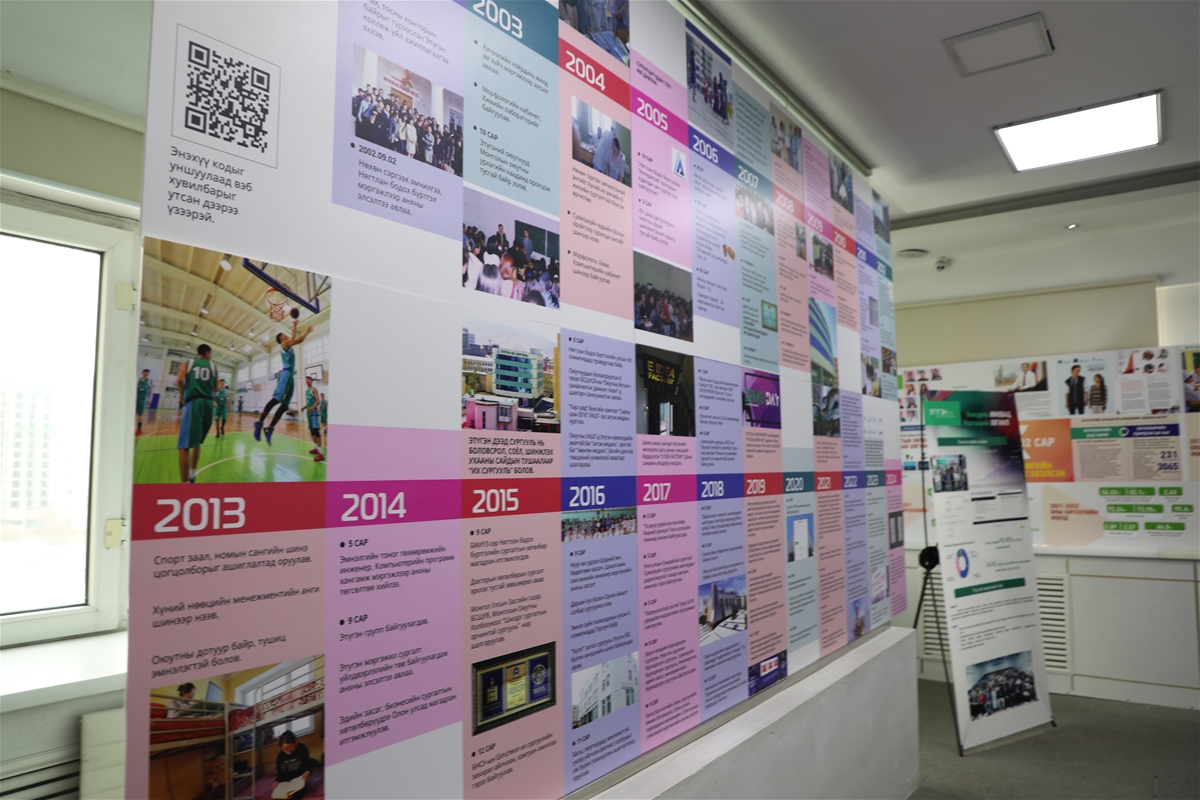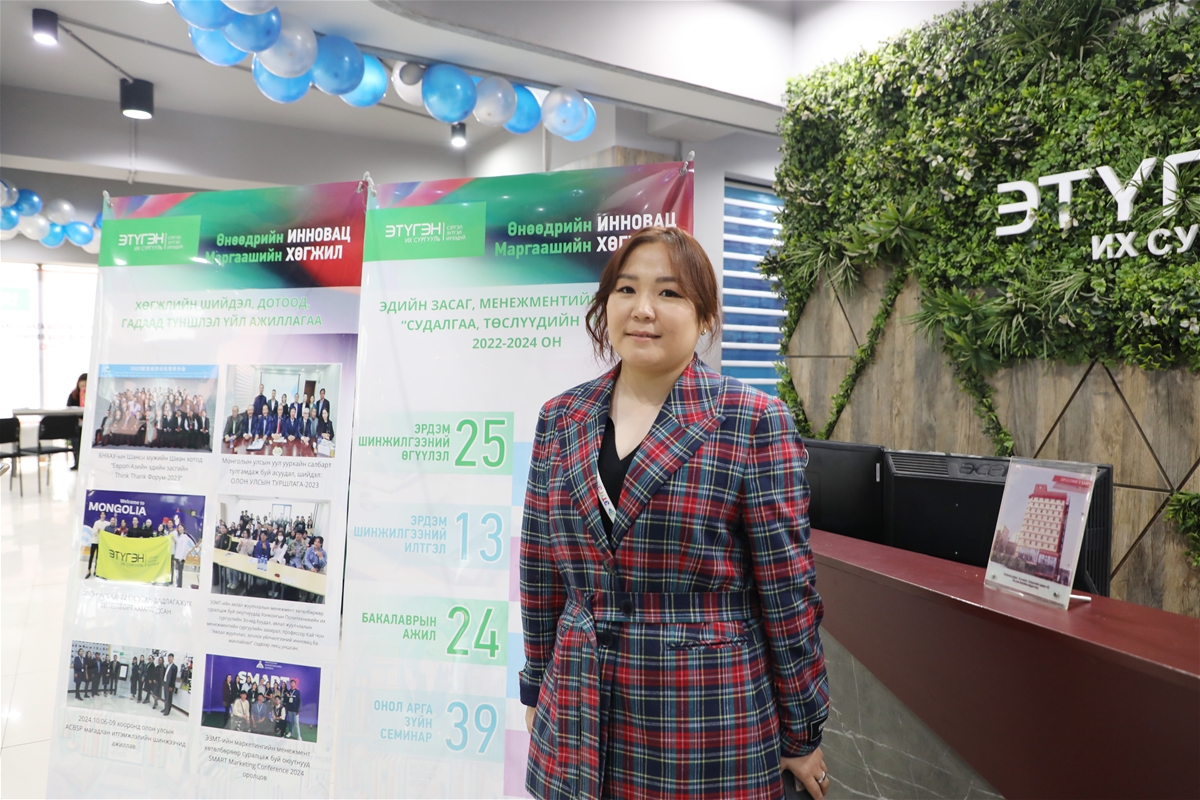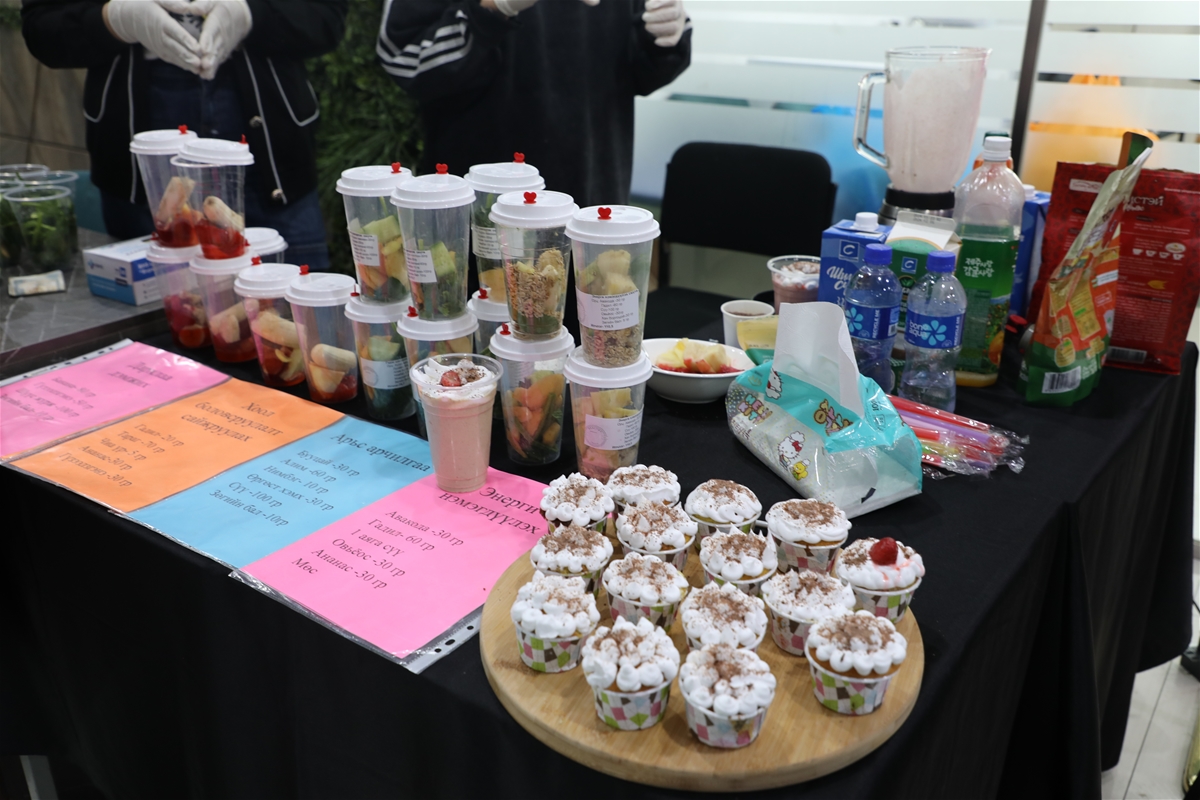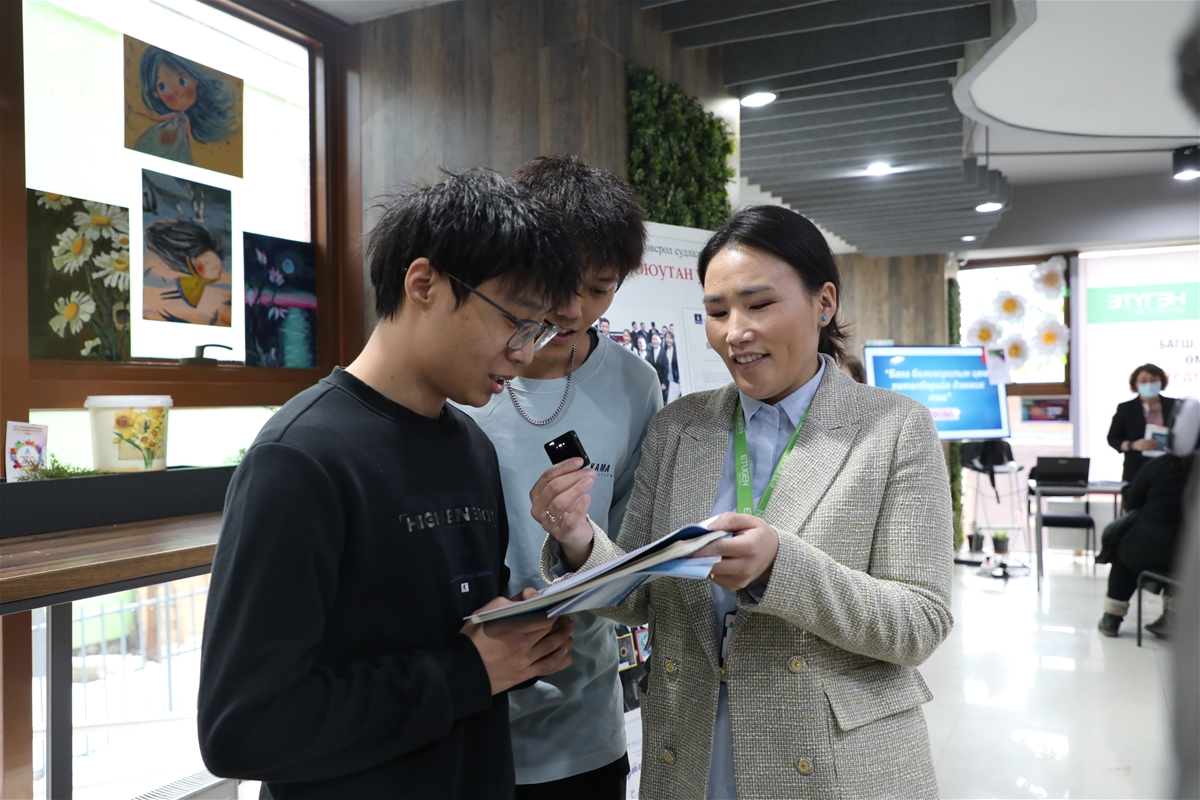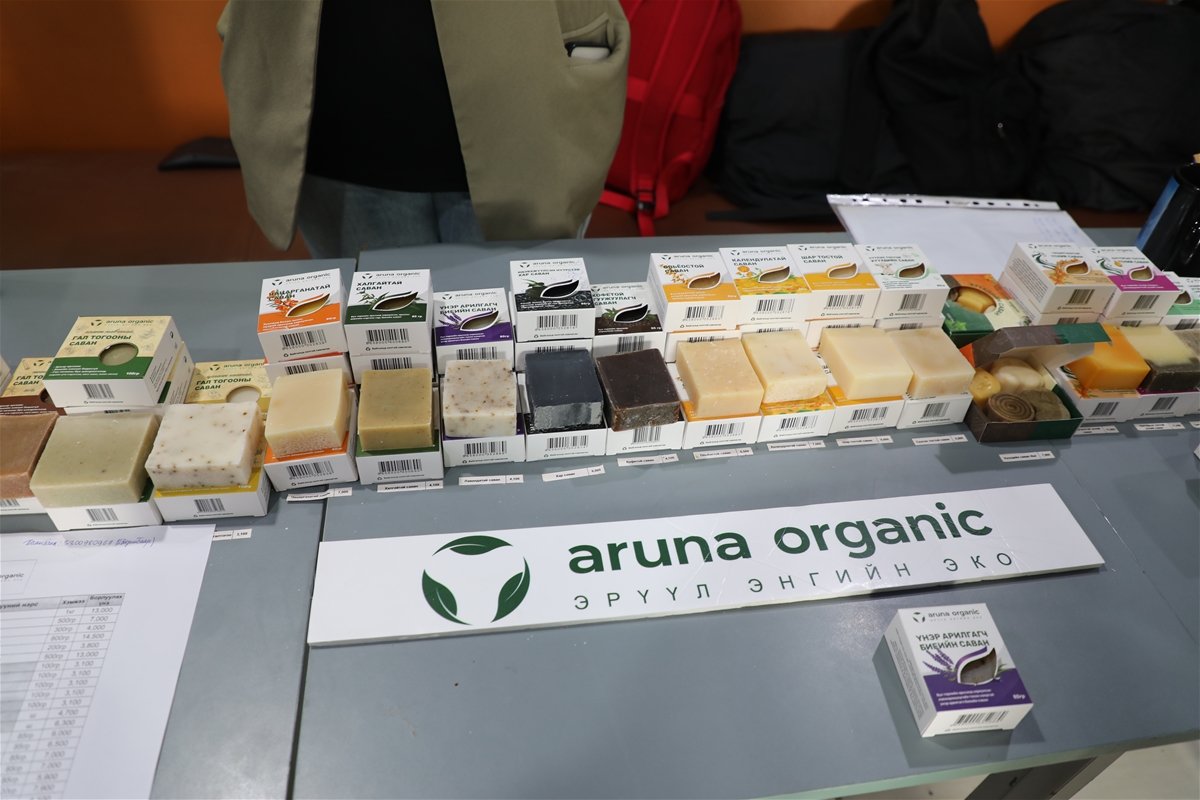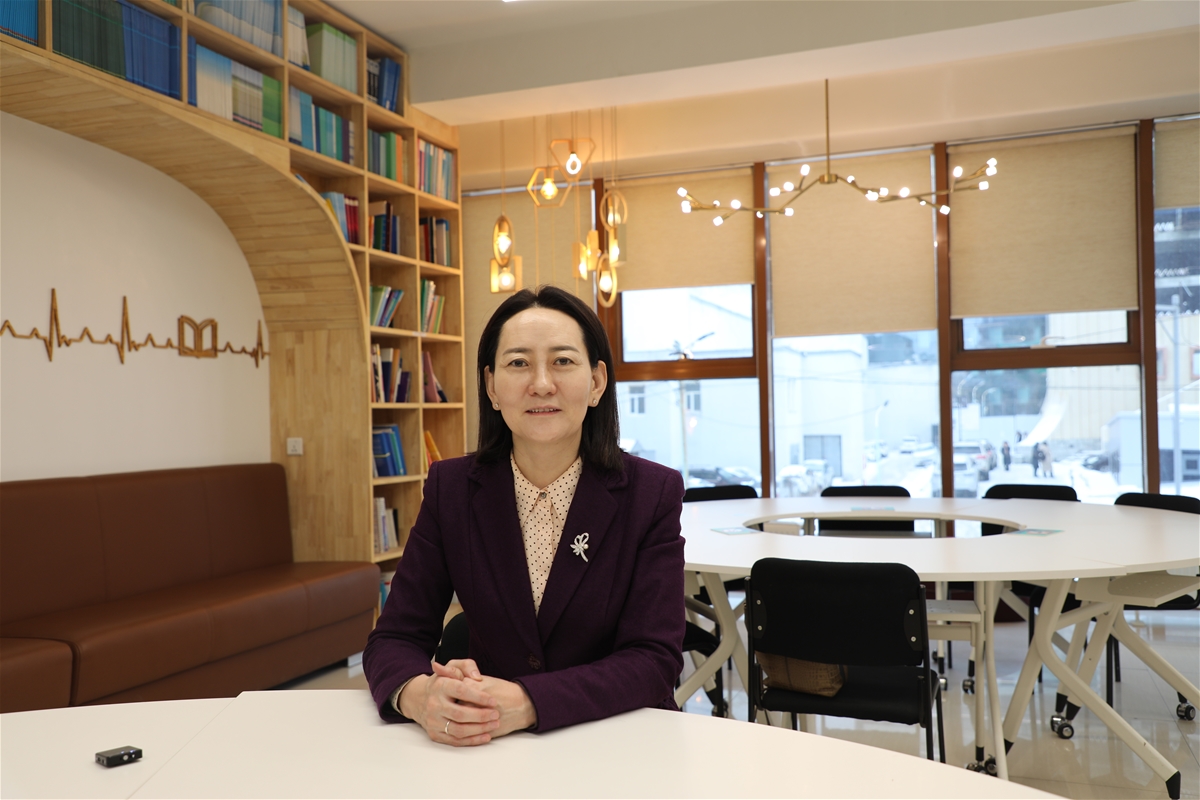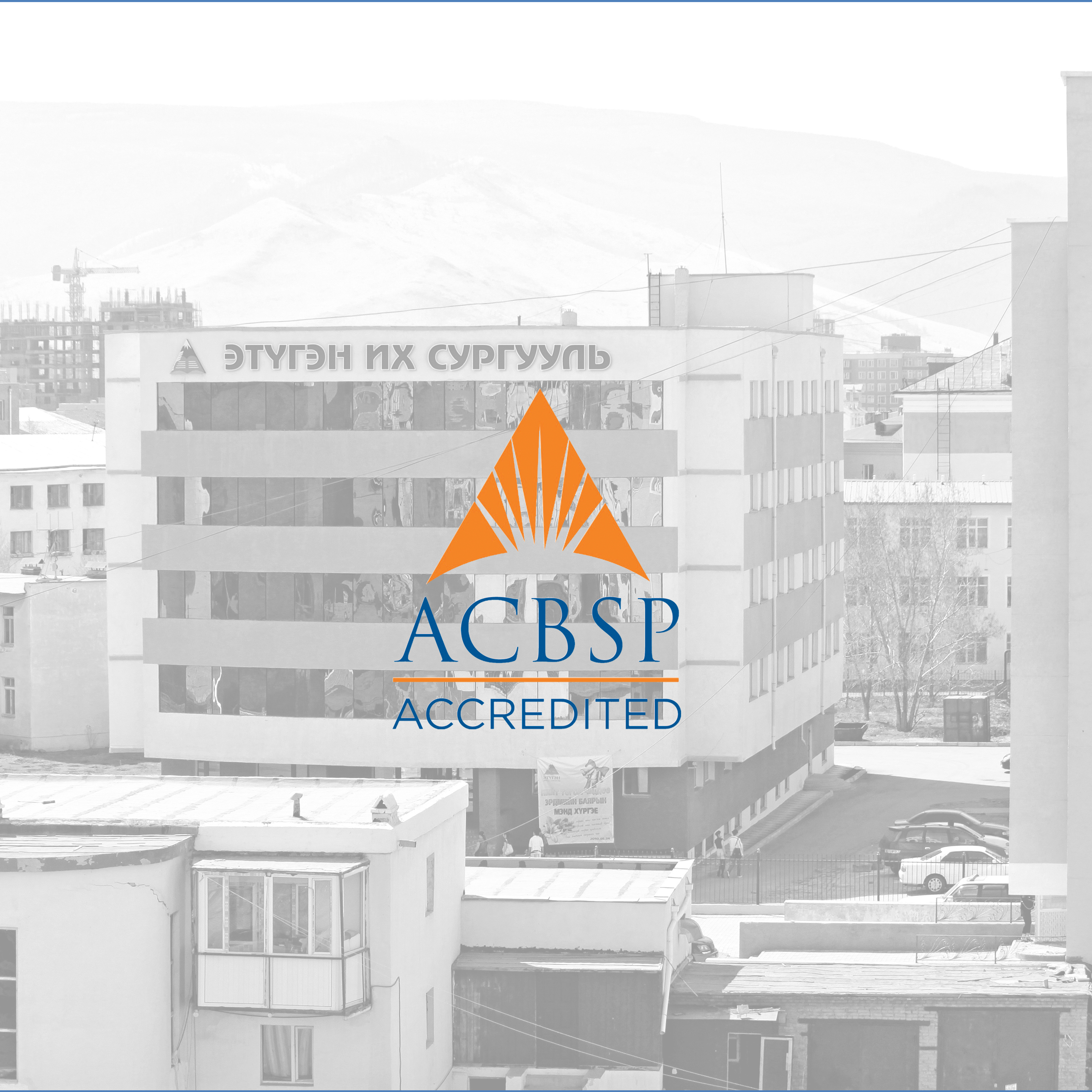.png)
In the early 2000s, the term "innovation" was just beginning to take root in Mongolia, especially in scientific and technological fields. Back then, exhibitions and conferences featuring this term were quite rare. Experts often discussed how introducing innovation into everyday life would require significant financial investment and time.
However, 14 years later, while covering the "Etugen" University Innovation Day, I found myself reflecting on an entirely new understanding. I realized that innovation is not something disconnected from life, but rather, we live, learn, and develop within an innovative environment every day. On November 27th and 28th, the "Etugen Innovation Days III" took place at the university's academic buildings. I had the opportunity to report on this remarkable event.
The opening ceremony of the first day of the event was met with enthusiastic applause as students greeted the distinguished guests at the entrance of the hall. The vibrant sounds of clapping resonated, creating a lively atmosphere, signaling the beginning of an exciting event.
In his speech, S. Nyamzad, the Honored Economist of Mongolia, Academician, Doctor of Economic Sciences, Professor, and President of "Etugen" University, emphasized that the university would become "an innovative university." Initially, I expected a lengthy address from him during the opening, but he quickly got to the point, presenting a brief but impactful report titled "Traffic Congestion and Artificial Intelligence: Solutions." The university is located in the heart of the city’s A district, in the center of urban traffic congestion. Therefore, the solution to reduce and eliminate traffic congestion will involve the active participation of "Etugen" University as a key player. President Nyamzad's words were met with unanimous applause from the students in the hall, showing their full support for the initiative. Additionally, the university community is also committed to contributing to solving air pollution and smoke issues, actively participating in the development of the capital city through both intellectual and physical involvement. Among the striking facts presented in his speech, he noted that during peak hours, the average speed of vehicles in the city is currently between 8.9 to 10.8 km/h. If this trend continues, by 2030, this speed will decrease to just 5 km/h, and by 2040, the entire city will come to a standstill. Should traffic congestion persist in a particular area, vehicles would remain immobile for an entire day. Over the last decade, the growth rate of automobiles in Ulaanbaatar has outpaced the growth of roads by a staggering 201 times.
When President S. Nyamzad inquired about potential solutions for resolving Ulaanbaatar's traffic congestion using artificial intelligence, the response, provided by AI, outlined seven key solutions: "Develop public transportation, regulate vehicle movement, reduce centralization, address parking issues, utilize information technology and digital tools, incorporate government policies, and involve citizen participation". Among these, he particularly highlighted the utilization of "Information technology and digital tools," expressing strong support for potential and feasibility in tackling the issue. He then introduced "the solutions we propose to reduce traffic congestion." First, he suggested creating a more evenly distributed ring road that is further from the city center. Looking at traffic management in major global cities, he showcased examples from Moscow and Beijing where such ring roads have been effective in alleviating congestion. Secondly, he proposed the creation of a two-tiered road system with free intersections. Thirdly, he outlined the introduction of an AI-based electronic payment system for road usage. Furthermore, he mentioned that artificial intelligence could be employed to analyze road conditions and traffic flow, leading to dynamic signal adjustments controlled by AI. For instance, traffic lights could be adjusted intelligently to fit the conditions. During peak traffic, green lights could be extended for congested areas, and at night, the system could switch to a "demand-based mode" where green lights are activated only when a car is detected. AI would also predict traffic patterns and make proactive adjustments, optimizing the timing of traffic lights at multiple intersections, ensuring vehicles move at a consistent speed and pass through green lights. Additionally, AI would direct drivers to available parking spaces and adjust signal timings based on weather conditions. President Nyamzad emphasized that with the assistance of AI, Ulaanbaatar’s traffic congestion could be easily resolved, a notion that seemed to inspire confidence among the attendees. The atmosphere in the hall reflected a sense of optimism, with many feeling that the solution could indeed be implemented swiftly.
At the opening, the topics discussed included highly relevant and timely subjects such as robotic surgery, AI in banking and finance, and drone development.
The Director of the Innovation Center of Ulaanbaatar, E. Dagva, expressed that their center holds vast amounts of data and research, including doctoral-level research projects. He also conveyed their willingness to collaborate with "Etugen" University and its students. Enkhbold, an engineer and a graduate of "Etugen" University, delivered a presentation on "The New Era of Robotic Surgery." He provided an overview of the evolution of surgery, highlighting the transition from open surgeries to laparoscopic procedures, which offered numerous advantages. However, he emphasized that the next phase—robotic surgery—has seen remarkable growth in the global healthcare sector since 2020. Enkhbold introduced the Revo-I robotic surgery system and shared his experiences from its installation and use in Mongolia.
Starting from the opening of the Innovation Day event, the presentation of new ideas, knowledge, and solutions sparked a sense of mental clarity in all those in attendance. It ignited an intelligent search for other intriguing developments and innovations, leaving everyone eager to discover what other exciting advancements might be taking place elsewhere.
Last year, accreditation organizations from Taiwan, Japan, Thailand, Vietnam, and Mongolia collaborated to conduct a quality assessment of 48 universities in Mongolia. Out of the 17 criteria evaluated, "Etugen" University scored above the national average in 14 areas, while the remaining three criteria were found to be around the average level.
The research team highlighted that "Etugen" University performed at or above the international average in nine of the 17 criteria assessed, including information systems, teaching activities, accessibility of curricula, educational objectives, learning outcomes, general academic course results, career counseling services, student evaluations of the university, and the library. ollowing this evaluation, our reporting team visited various departments at "Etugen" University, which were rated at or above the international average. We explored these innovations in detail, experiencing some firsthand and observing them closely. We toured 15 departments and units, including the School of Medicine, Department of Bio-Medicine, Department of Educational Studies, School of Engineering, School of Dentistry, Department of Traditional Medicine, School of Nursing, School of Economics and Management, School of Pharmacy, General Education School, "Etugen" Vocational School, the Student Development Office, the Project Team, the Training Policy and Coordination Office, and the Library. Our investigation began with these visits.
“RIGHT HABITS, RIGHT PRACTICES” INNOVATION
B. Otgonzaya, the Director of "Etugen" Vocational Education School, shared, "Our school is participating in this year's 'Etugen Innovation Days' event with our innovation, 'Right Habits, Right Practices.' In terms of training and research, our school's foreign relations department has signed an agreement with Japan. Last year, two students went to Japan for internships, and this year, over 20 students are currently attending training programs there..
We are participating in the Innovation Day with five innovative ideas:
-
Restful Sleep
-
"One Step" Therapeutic Massage
-
Family Planning - Innovation in Our Lives
-
Flower Girls - Let's Learn Together
-
People from Five Continents - We Are Together
Our students have identified that successfully planning a family is one of the most important innovative things a person can do in life. This realization emerged during their training and internship experiences, and they have proposed it as an innovative idea. The "Flower Girls - Let's Learn Together" initiative highlights the importance of women and girls paying attention to their health. It underscores that women and girls are crucial components of societal and family health. People from all five continents, we all aspire to live healthy and happy lives. In terms of health, we offer services that cover everything from the top of your head to the tips of your toes. What makes our school unique is that we specialize in training two professions: therapeutic massage specialists and nursing assistants. Therefore, we are participating in this innovation with programs focused on therapy and promoting overall health and well-being. The five innovations mentioned earlier are ongoing activities at our school, which we integrate into our training and research. Another innovative aspect is that we have begun training students in a new profession: A Conductive Education Assistant (CEA). One of the most significant and innovative features of our school is the emphasis on practical training. One-third of our curriculum is dedicated to hands-on practice. Each profession has over 10 internship locations, and our students often secure jobs directly from their internship placements, which sets us apart.
TRADITIONAL MEDICINE COLLEAGUE WITH THE "FIVE ELEMENT DIAGNOSIS AND TREATMENT" PROGRAM
B. Nyamjav, Head of the Department of Traditional Medicine, shared that they are implementing a project based on Mongolia’s traditional medical heritage, focusing on the five-element diagnosis and treatment. This project, carried out in collaboration with experienced leading doctors, is aimed at providing personalized treatment and advice tailored to the unique characteristics of the human body. The program is being executed by a team of professors who specialize in this area.
The speaker also mentioned the development of various innovative products, such as medicines in the form of powders, tinctures, oils, and tablets. Additionally, they are creating preventive health solutions for children, such as amulets to protect against diseases, as well as using a stamp marked with the letters "KHI" for remedies aimed at enhancing speech. Other innovations include teas made from medicinal herbs to balance the body's elements and prevent illness.
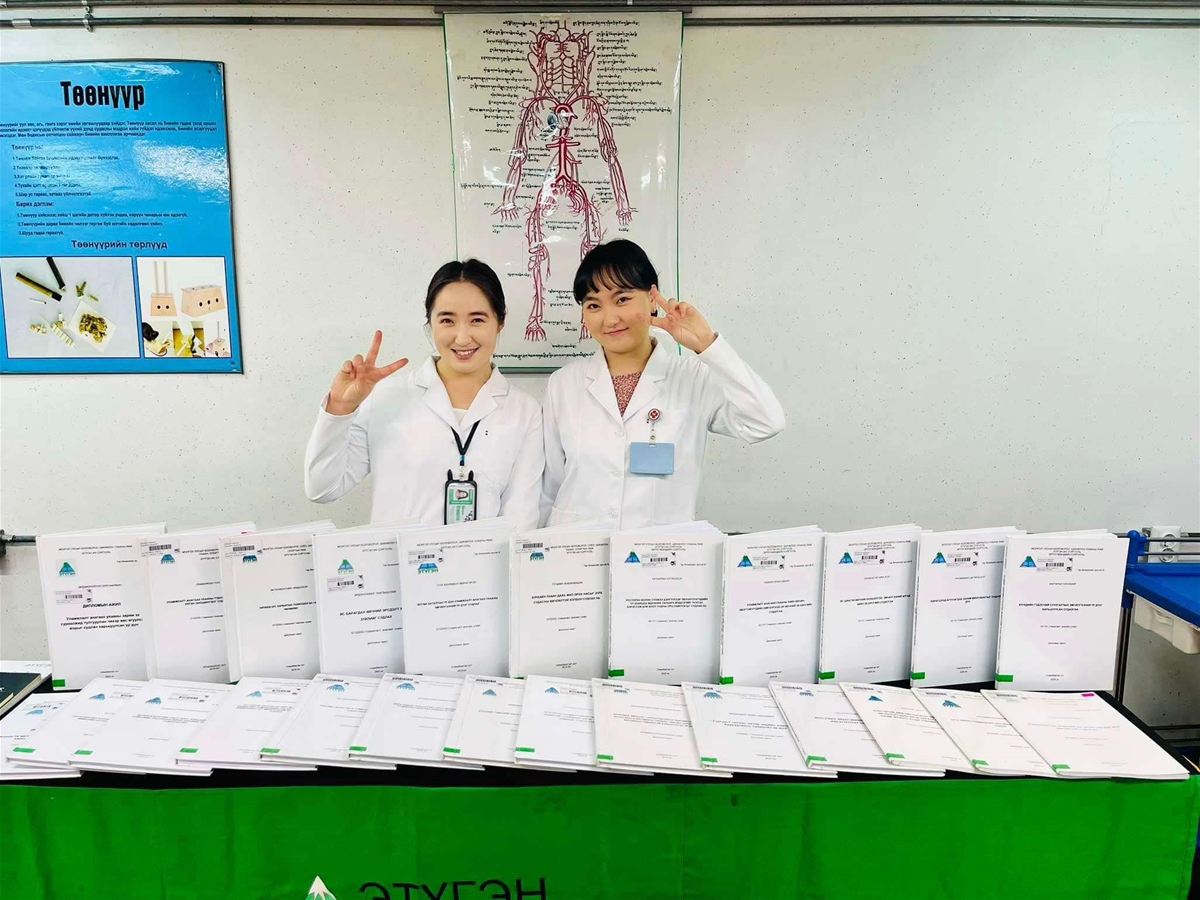
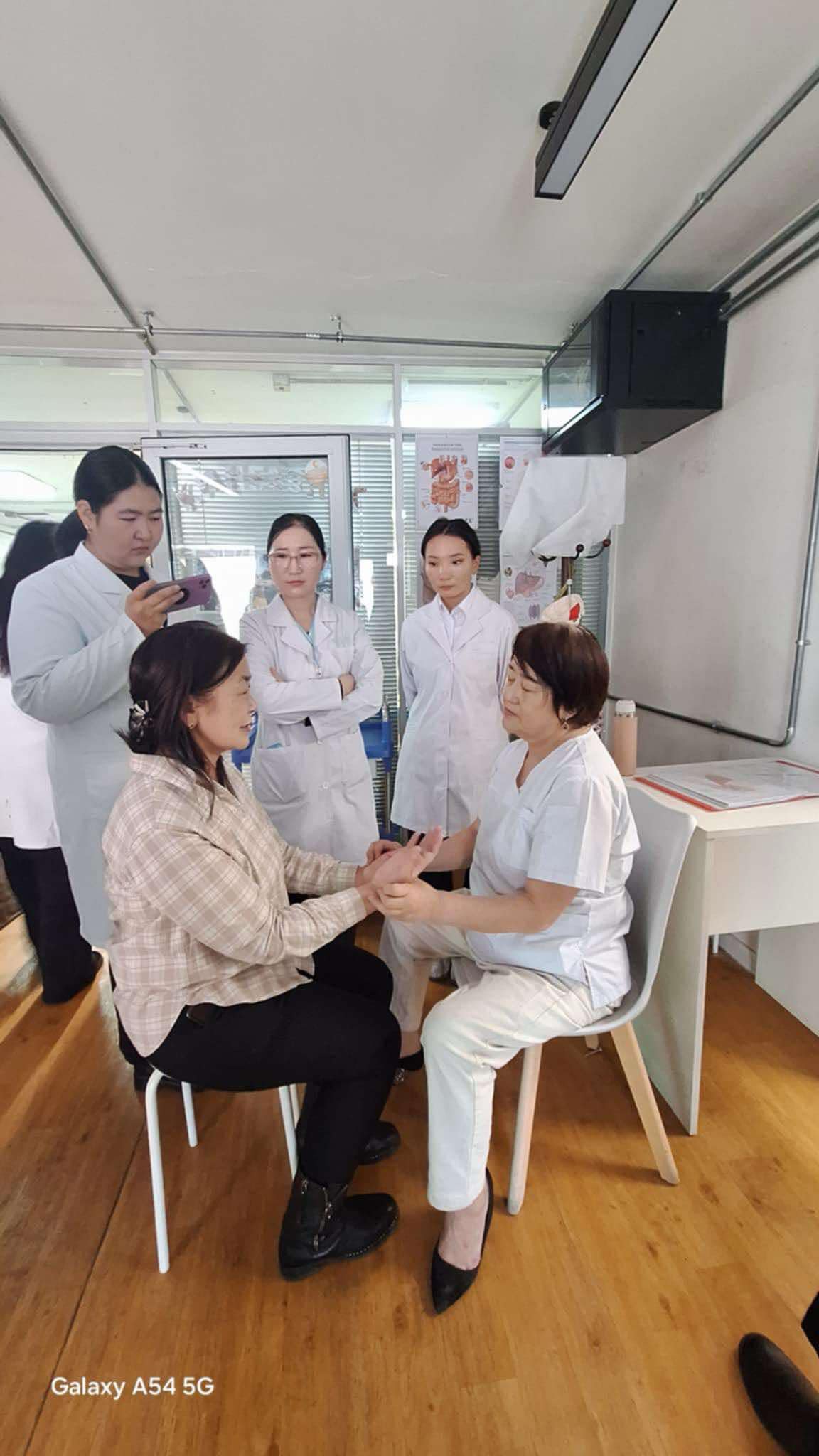
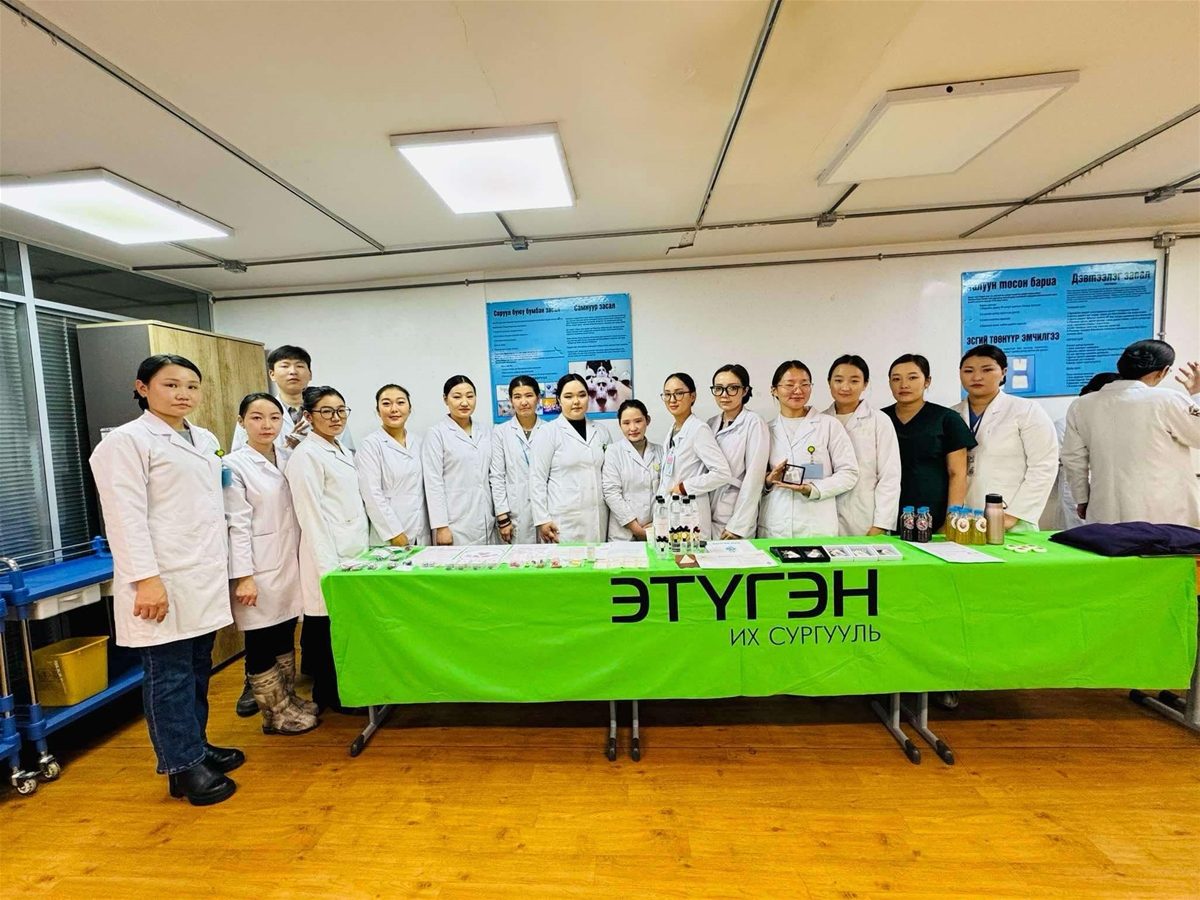
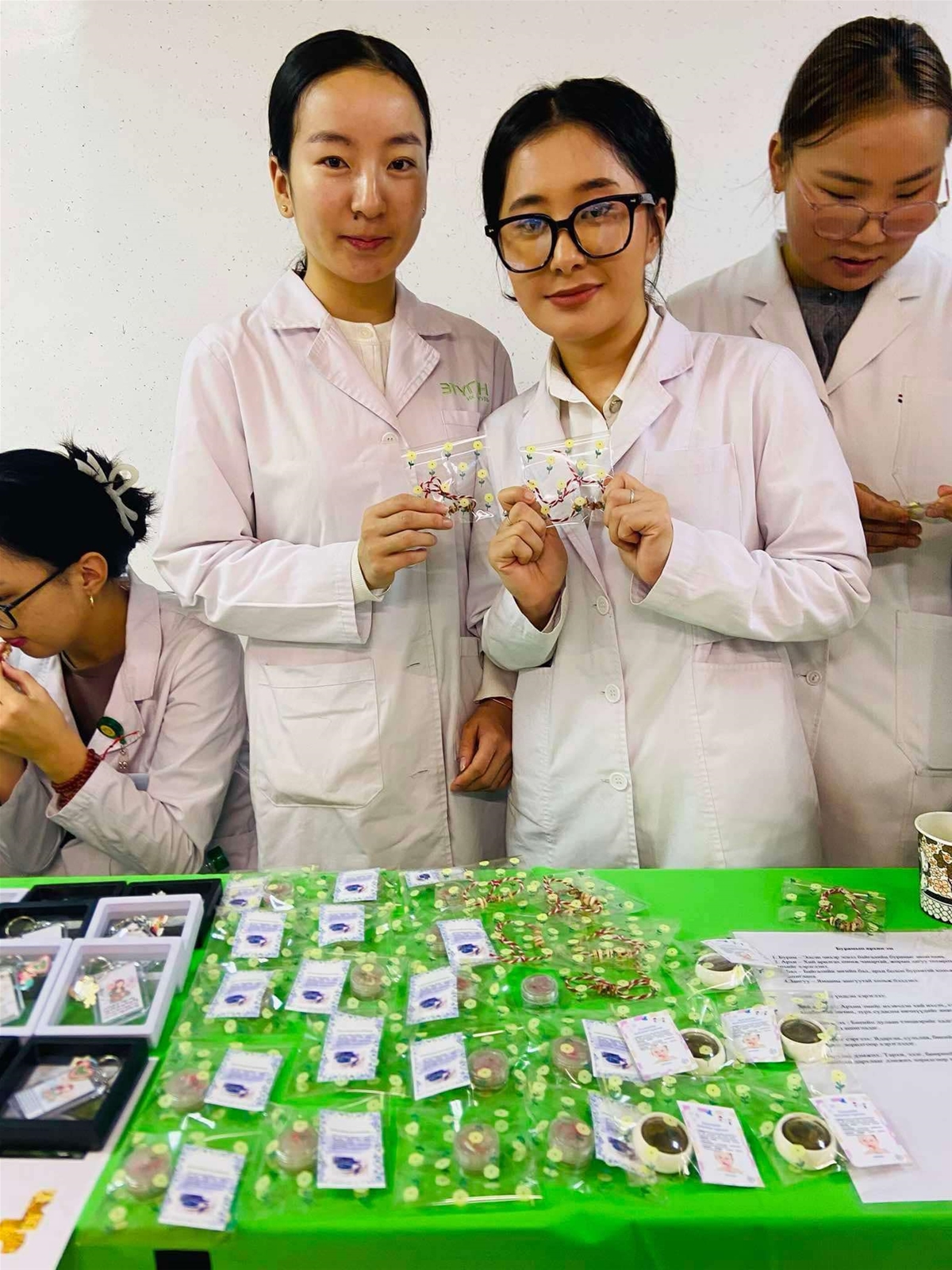
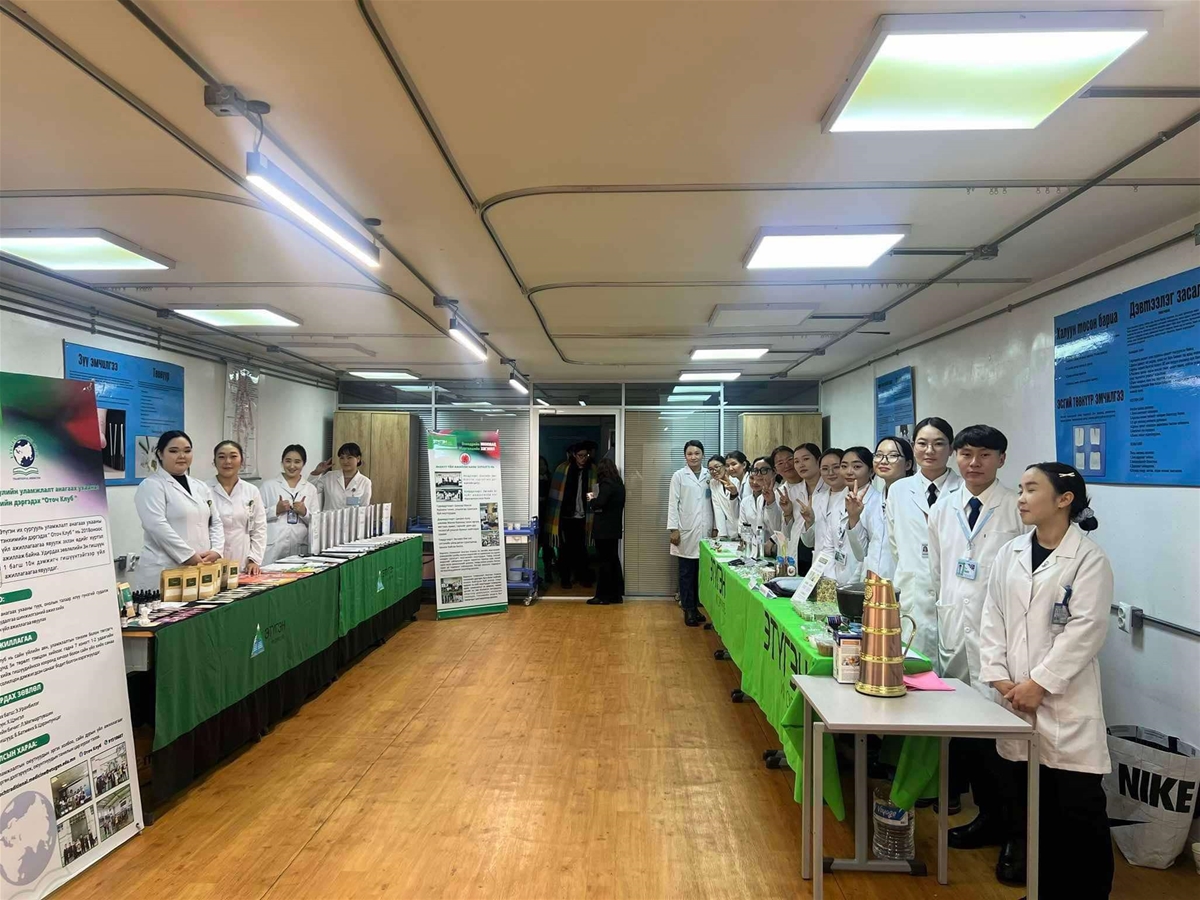
ETUGEN INTERNATIONAL SCHOOL WITH THE CAMBRIDGE CURRICULUM
At the event, students captivated the audience with a ukulele performance. Third-grade student S. Ayadana and fourth-grade student E. Gegeen showcased experiments, including a volcanic eruption simulation and a greenhouse drip irrigation system. Additionally, the students exhibited their creations, crafted from readily available materials such as natural stones and wood, in a special exhibition.
During the event, S. Batsukh, the principal of Etugen General Education School, shared five key reasons why their school stands out in the history of general education and why it has become a popular choice for parents to enroll their children. First, the environment plays a crucial role in learning, development, and personal growth. "Etugen International School" will begin its educational activities in the upcoming academic year in a complex building designed with top architectural solutions from Germany. Second, the school implements the Cambridge international curriculum, offering students a globally recognized curriculum. Third, the school offers programs in English, Chinese, and German. English is the primary language of instruction, as the Cambridge curriculum is based in English, and all materials and activities are conducted in English. Teachers conduct classes in English, and the second language options are Chinese and German. The fourth reason parents choose the school is the shared value of "Being Human," which is upheld across both Etugen University and Etugen General Education School. Lastly, the school provides a development program that extends beyond the regular curriculum. Instead of just after-school extracurricular activities, they focus on holistic development programs, offering students more than just additional classes..
The construction of Etugen International School has been completed, and the interior work is now nearing completion. The exterior and interior environments of the school were presented to the guests on the screen. The school boasts a modern library, gymnasium, dining hall, fully equipped classrooms, and laboratories. Its after-school development programs, including arts, music, and relaxation rooms, are all equipped with the latest global technologies and innovations. What once seemed like a school seen only in films is now on the verge of being operational. Parents are already starting to explore the school and discuss enrolling their children there in the near future.
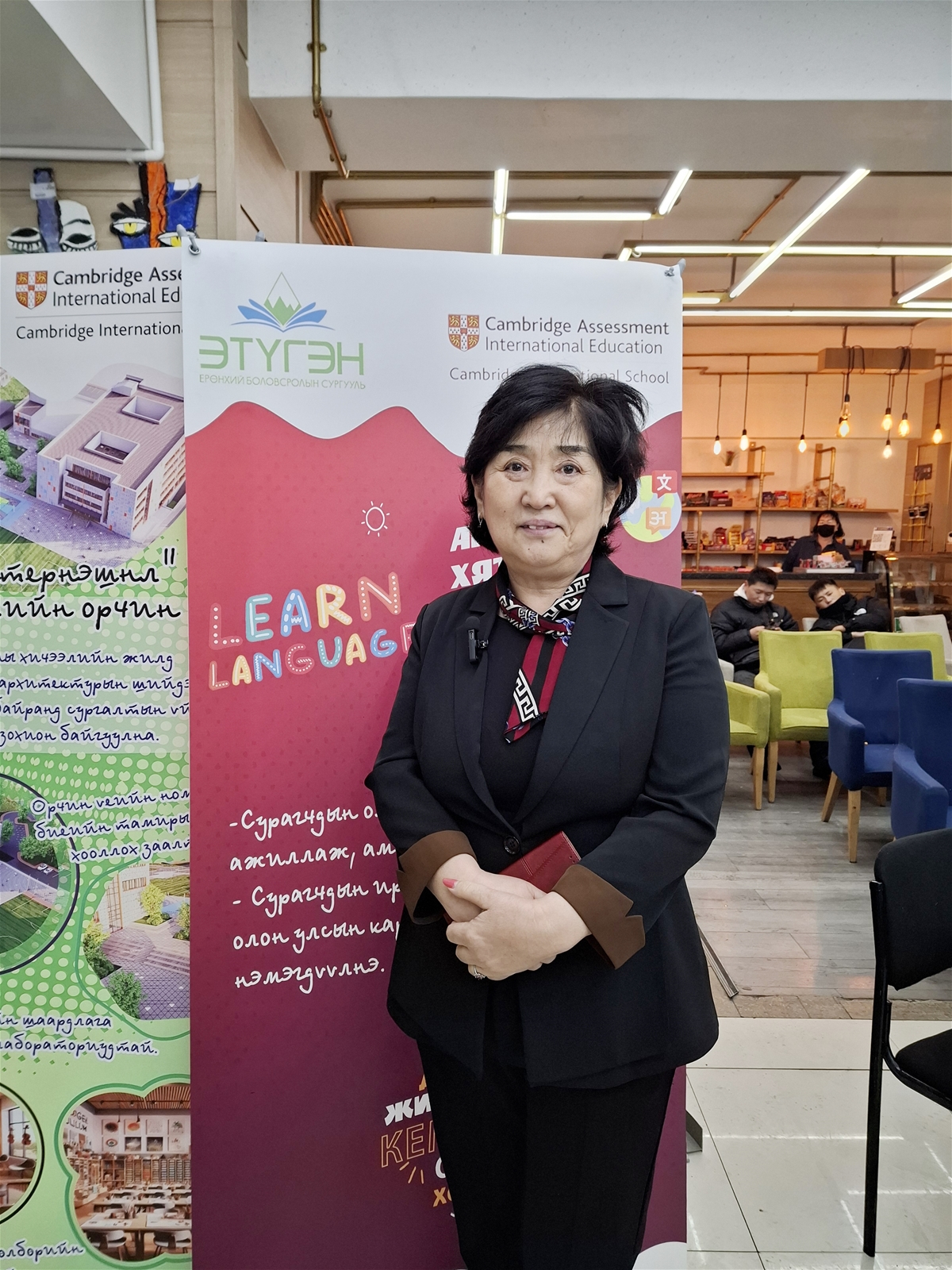
ETUGEN HERBAL PLANT CULTIVATION PROJECT
Our next stop was the School of Pharmacy, where faculty and students showcased the products they had developed and produced. Various items, including immune boosting teas, candles, oils, drinks, snacks, and herbal remedies, were displayed in the exhibition. Upon arrival, students served guests with tea and juice made from fruits they had grown themselves.
B. Oyuntsetseg, a faculty member at the School of Pharmacy, explained: "Our school operates in two main areas: education and production. People are familiar with capsule and tablet medications, but we start teaching plant-based medicine from the first year. In our courses, students are introduced to the structure of plants both internally and externally, and from the second semester, they begin identifying plant classifications. Based on this, we teach medicinal plant resource studies starting from the second year. This course includes studying rare and endangered plants native to Mongolia, learning relevant laws such as the Law on Natural Plants and the Law on Genetic Resources. Furthermore, we also provide students with practical knowledge on how to cultivate these plants. In addition, through the Medicinal Plant Science course, students learn how the compounds found in plants can be used to treat various diseases, and they work in groups to gain hands-on knowledge and skills. After completing this course, students participate in fieldwork, where they collect and identify the plants they studied in class from nature. As part of this educational approach, we are implementing the 'Etugen Herbal Plant Cultivation Project.' In this project, our students actively participate by preparing the soil and cultivating the plants themselves. Our courses are interrelated in a cyclical manner, and through this initiative, we are growing plants such as blue damson, sweet grass, yarrow, medicinal clover, and sea buckthorn. The goal of this project is to produce products from these cultivated plants and create the 'Etugen Brand,'" she said..
The Dean of the School of Pharmacy, S. Idertungalag, shared that at the Harztai area, which serves as the internship base for Etugen University, they have cultivated five types of herbal plants across 3 hectares of a 12-hectare land. In line with their strategic planning, significant efforts are being made to establish a pharmaceutical workshop and manufacturing facility The senior faculty member, Ts. Dashzeveg, commented, "In recent years, humanity has been moving away from pharmaceutical drugs and striving to shift toward organic consumption, favoring natural products. Our students' participation in the Innovation Day with the products they have created serves as a perfect example of this trend."
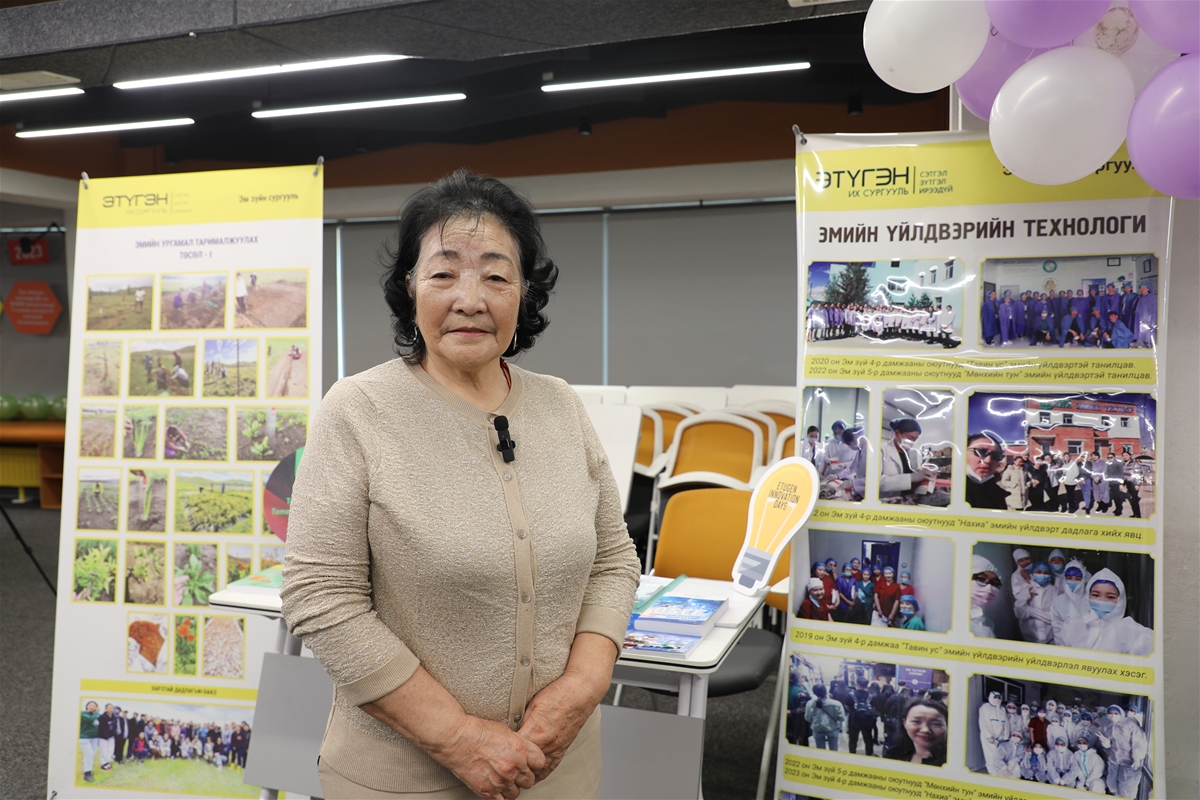
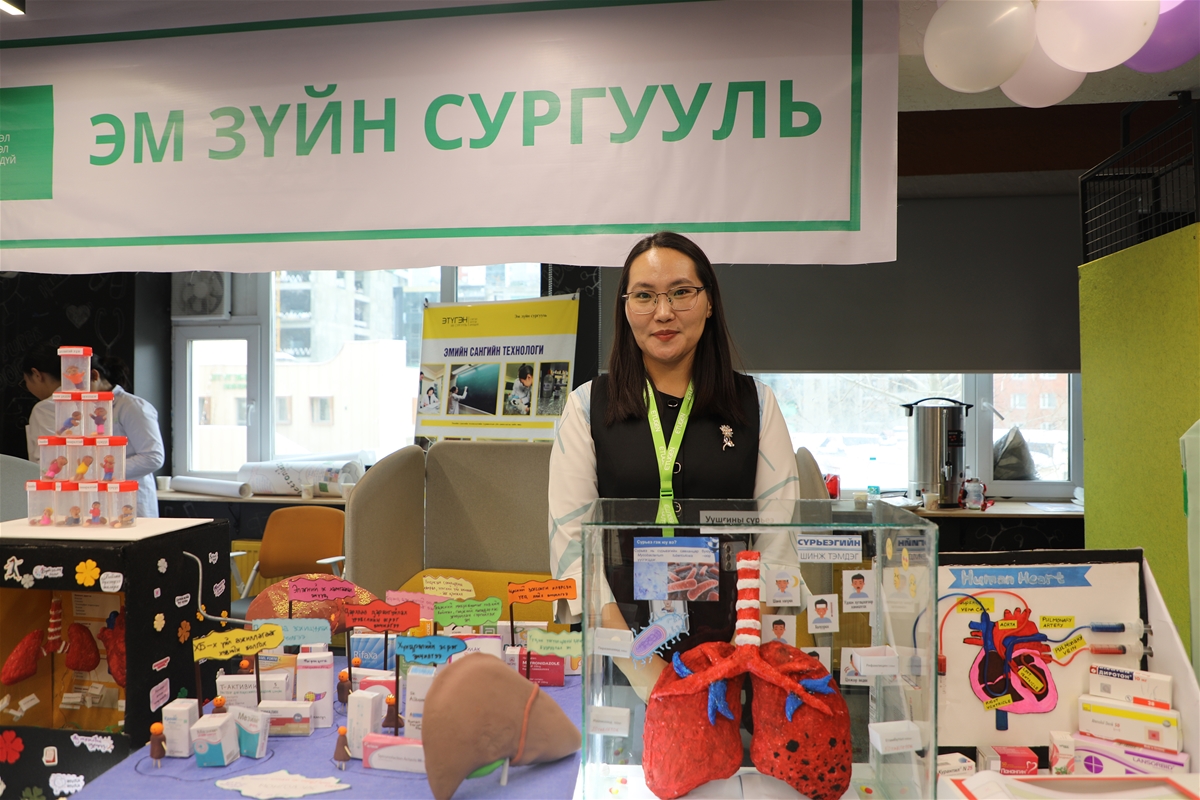
BIOMEDICINE" IS ONE OF THE 30 MOST SOUGHT-AFTER PROFESSIONS
The Biomedicine Department held its innovation exhibition near the Pharmacy School. We had the opportunity to meet with the department head, A. Zolzaya, who shared insights about their work. She explained, "Our students have utilized waste oils to make cosmetic soaps, and they’ve created joint and cartilage supplements from cattle cartilage. As a leading field, biomedicine encompasses genetic studies, molecular biology, and hereditary science. We are working on products and research in these areas and implementing various projects and programs. Currently, we have nine research projects in progress, registered in Web of Science and Scopus, with three articles published in peer-reviewed journals with impact factors. These are the results of our innovation. In Mongolia, there are only two institutions training specialists in biomedicine: the Mongolian National University of Medical Sciences (MNUMS) and Etugen University. Two years ago, our university’s leadership began funding these projects, allowing our professors to publish intellectual property works. This gives us the opportunity to align with global research trends. When we first joined the exhibition six years ago, we focused on showcasing the achievements of our graduates such as what kinds of specialists they became and what they were contributing to the field. This year, we are leveraging our resources and, with the support of our faculty, staff, and parents, we are opening the door to the future development of this industry.”
The faculty member of the department, E. Enkhtaivan, shared insights into the development of their field, "Our profession began in 2007. In 2010, the Biomedicine Professional Council was established. By 2012, our program had graduated its first cohort, and we also introduced a Master’s program. The Department of Engineering was founded as well. Since 2016, we have operated as an independent department and continue to function as such. In 2018, our students began working on scientific research and thesis projects. Since 2022, the Biomedicine program has been accredited with a five-year national accreditation. Last year, we wrote our self-assessment report in compliance with the ASIIN (International Accreditation Agency) standards. Our Biomedicine program has been internationally recognized from 2024-2029. He continued, "In terms of demand, our profession ranks third among the 30 most sought-after professions globally. Nationally, it is ranked as the second most sought-after profession. Students with an GPA of 2.8 or higher are eligible to receive government scholarships, with the possibility of a full scholarship from the government for those with a GPA of 3.0 or higher. Since 2012, we have been continuously improving our program and are now accredited internationally by ASIIN. With this, we are committed to implementing our strategic plan through 2030.” It was clear from Enkhtaivan’s words that the department plays a significant role in training experts in high demand, not only in Mongolia but globally. It was reassuring to see such a program thriving at Etugen University, which is contributing positively to the future of the biomedicine field.
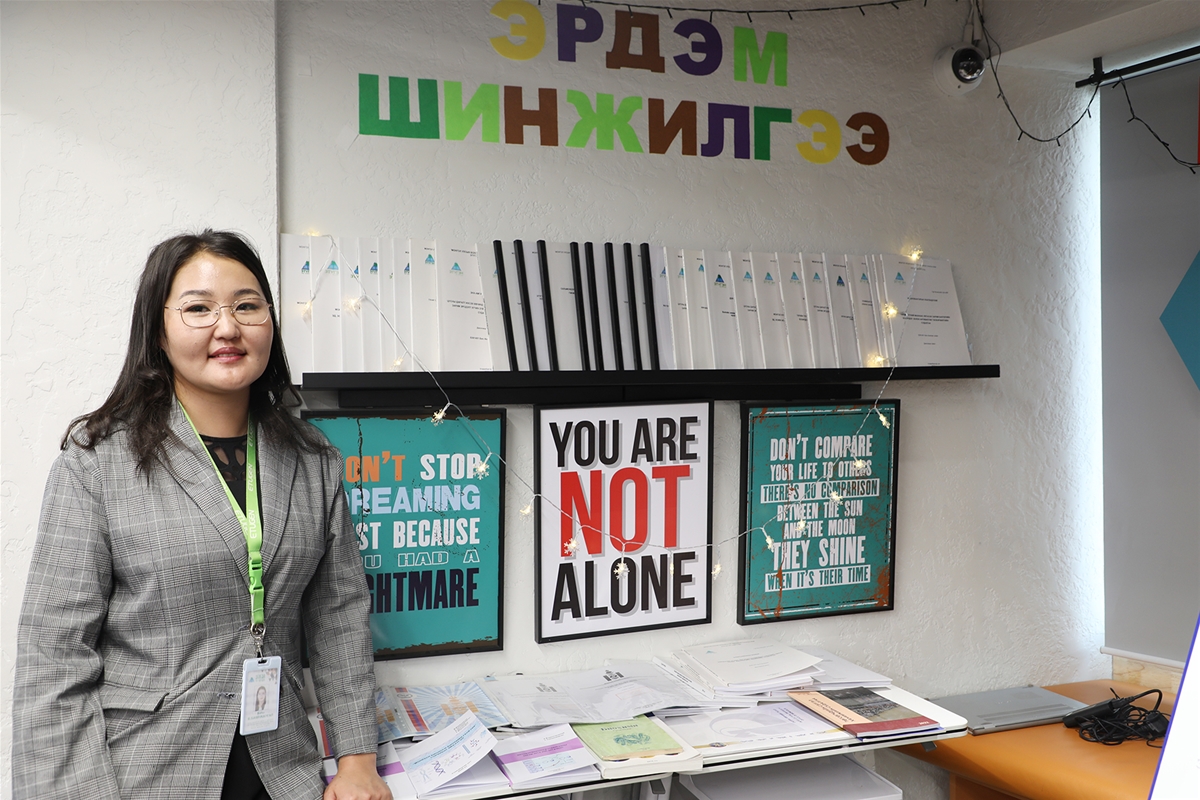
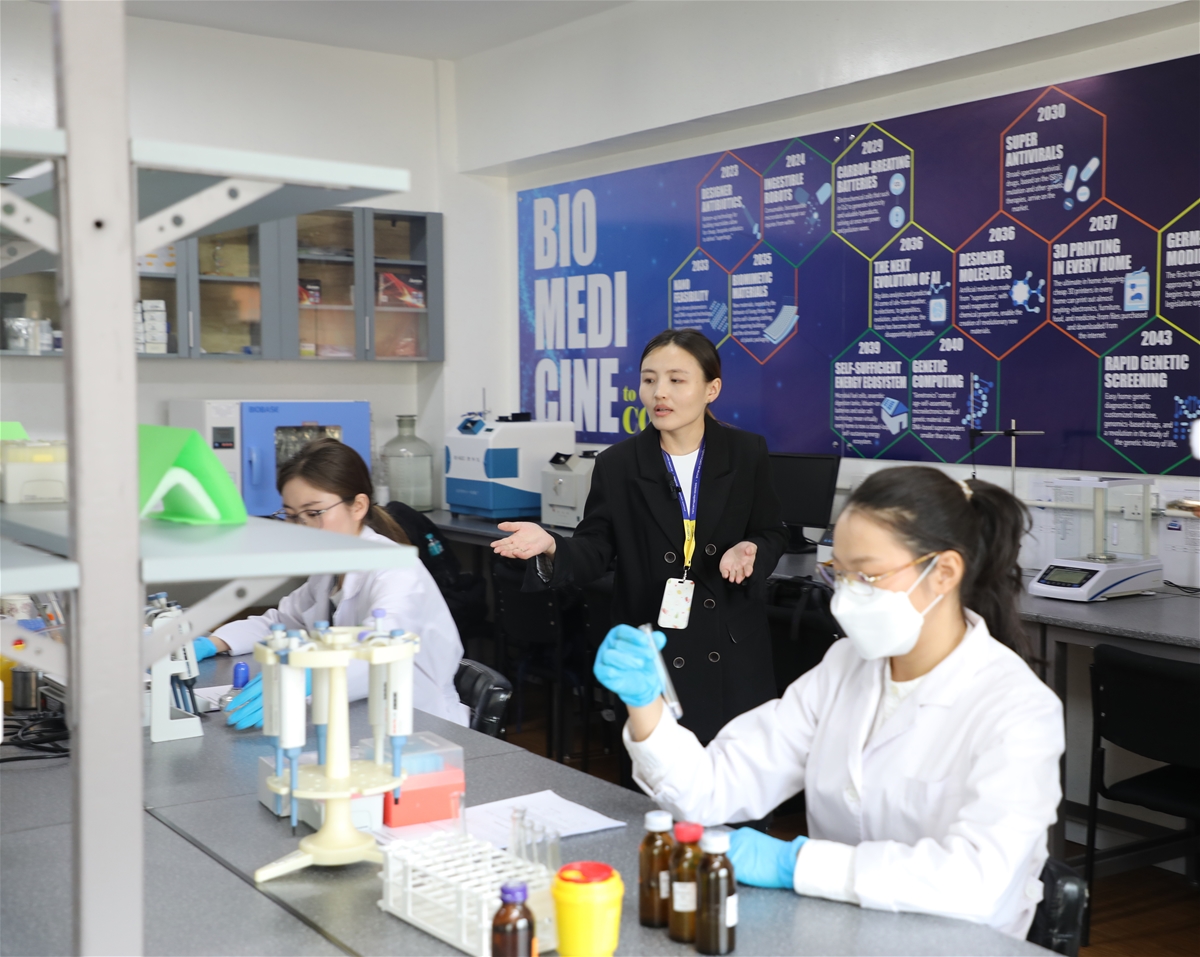
PSYCHOLOGY CENTER FOR STUDENTS
Stepping into the next hall, we found ourselves in the midst of a truly bustling scene—a space filled with students engaged in hands-on medical training. White-coated students moved swiftly from one station to another, performing examinations, practicing injections, administering artificial respiration, and even simulating surgeries. Of course, these students weren’t operating on real patients. Instead, they worked with medical mannequins and high-tech simulation tools, meticulously designed to mimic real-life medical scenarios. Some students interacted with physical models, while others engaged in AI-driven virtual hospital settings, diagnosing and treating digital patients. This was the School of Medicine’s contribution to the Innovation Day, showcasing the cutting-edge training methods adopted by Etugen University. In one corner, a young student was performing a laparoscopic surgery. "I'm just practicing to improve my technique," he explained. Behind a partition, another group of students was clustered around a patient bed, conducting a detailed medical examination on one of their peers. Meanwhile, just across the hall, students and visitors were engaging with the Psychology Center, another key initiative of the university. With over 8,000 students, Etugen University is committed to creating an optimal learning environment—not only by providing state-of-the-art facilities but also by addressing students' mental health and well-being. This project, which integrates innovation into psychological support, stands as a testament to the university’s dedication to holistic education. A truly commendable initiative, pushing the boundaries of medical education and student support to new heights.
We spoke with Dr. S. Pagmadulam, Head of the Medicine Department and physician-psychologist, Associate Professor Dr. U. Tserendolgor, psychiatrist, Dr. N. Narantsetseg, psychiatrist and faculty member, and Dr. P. Batchuluun, oncologist and psychologist, to learn more about Etugen University’s Psychology Center.
Dr. S. Pagmadulam, Head of the Medicine Department and physician-psychologist, shared insights on the ongoing Cognitive Development Project for medical students. Now in its fourth year, the project is in the process of compiling its annual report. "As part of this initiative, master's and doctoral research is being conducted, and we have fully achieved our initially set goals," she stated. One of the project's key achievements is the establishment of the Psychology Center, aimed at addressing students' mental health challenges. Currently, the center is staffed by four medical professionals—two psychologists and two psychiatrists. "During the initial research phase, students were found to have significant psychological challenges, prompting us to take structured measures," she explained. Since this year, students can self-assess their mental well-being through the university’s Student Learning Management System. If the assessment indicates a need for psychological support, they can consult with a psychologist. Should their concerns require further intervention, they are referred to a psychiatrist, who has the authority to prescribe medication when necessary. Since the beginning of the academic year, over 80 students have sought individual counseling, with some even attending sessions with their parents. The constant queue for psychiatric consultations underscores the project's timeliness and necessity, highlighting its significant role in supporting students' mental health.
Psychiatrist and faculty member P. Batchuluun highlighted the fundamental reason behind the launch of this project. "In Mongolia, intelligence levels have traditionally been the primary focus. However, global trends now emphasize the importance of emotion and self-awareness, which are crucial for today’s youth," he explained. While the project is currently being implemented at Etugen University, he believes it should be expanded into a nationwide study in the future. The project primarily examines students’ emotional well-being and the challenges they face due to difficulties in emotional regulation. A study involving over 3,000 students revealed that second year students experienced the most psychological difficulties. "First-year students often get caught up in the excitement of university life, but by the second year, they start worrying about their studies and future careers," Batchuluun noted. Due to the high incidence of psychological issues among second-year students, the center introduced group therapy sessions, which significantly improved students’ academic engagement and reduced leave of absence requests—a major achievement. "In any setting where people exist, psychological issues are inevitable. Today’s Generation Z faces numerous mental health challenges, but they rarely discuss these concerns with their families. Instead, they turn to friends or the internet for guidance. This is why we have integrated an online self-assessment tool into our website, allowing students to identify their own issues. If an emotional concern is detected, they receive immediate guidance. If the student cannot resolve the issue independently, they are referred to the Psychology Center, where two psychologists provide assistance. Should the issue escalate into a severe mental disorder, psychiatric care is also available," Batchuluun explained. What began as a research initiative has now evolved into a fully established Psychology Center, addressing a critical nationwide need. "By highlighting these issues, our project stands out as a pioneering effort that should ultimately be implemented across Mongolia," he concluded.
During the event, Dr. N. Narantsetseg provided psychological consultations using specialized diagnostic cards, commonly employed in psychotherapy for metaphor-based assessments. These cards help in guiding students and visitors through self-reflection and emotional analysis. Additionally, the Alpha System, a U.S.-developed drug-free therapy device was also introduced. This device is designed to regulate brainwave activity, converting beta waves into alpha waves, thereby restoring a balanced mental state. It is particularly effective for treating insomnia and anxiety. The Alpha System has undergone over 300 clinical trials on both humans and animals, with no recorded side effects. However, it is contraindicated for individuals with cardiac stents or metal implants. By addressing sleep disorders, the device also plays a crucial role in stabilizing depressive symptoms. Visitors at the event expressed admiration for Etugen University’s commitment to mental health support. "The students here are incredibly fortunate to have a Psychology Center within their university. Many workplaces don’t even have such a facility, let alone schools," highlighting the unique and pioneering nature of the initiative.
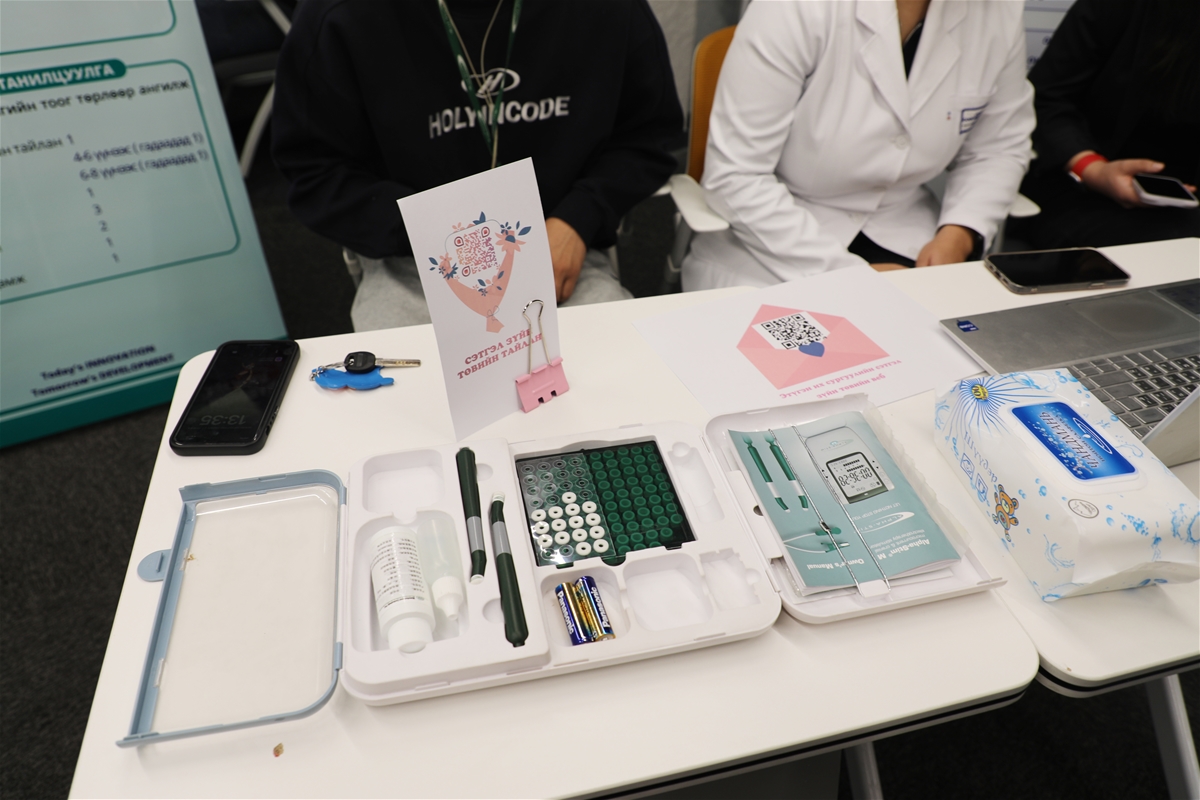
A STUDY ON LYMPHADENITIS CALCULATIONS CONDUCTED WITH THE HELP OF AI
Dr. D. Uranchimeg, a faculty member of the School of Dentistry, shared insights into a research project conducted in collaboration with the faculty of the School of Dentistry at the Mongolian National University of Medical Sciences (MNUMS). "In 2011, our school, along with the dental faculty at MNUMS, conducted a research project on the oral health status of children and young people aged 5, 12, and 18 in Ulaanbaatar. Since then, we have continued this research at Etugen University, and from 2021 to 2023, we launched our second project titled ‘The Oral Health Status of 5- and 12-Year-Old Children in Ulaanbaatar.’ The aim of the project was to examine the prevalence of dental caries, maxillofacial disorders, and malocclusions in 2,064 children across the nine districts of the capital city. Moving forward, we plan to extend this study to rural areas, with the goal of producing a nationwide survey on the same issues. One key aspect of this project was the study of lymphadenitis in 12-year-old children, using artificial intelligence. The AI system analyzed factors such as air pollution, environmental contamination, and the social and economic hardships that these children regularly face, revealing that such conditions significantly increase the risk of lymphadenitis. The results of this analysis were provided by AI," she explained.
SCHOOL DENTISTRY PARTICIPATED IN THE INNOVATION DAY EVENT, SHOWCASING PROJECTS RELATED TO VR, JAPANESE IMPLANT TECHNOLOGY, AND ORAL HEALTH RESEARCH
During this time, we met with Mr. U. Erdentulga, the CEO of BrainBase Corporation, which aims to introduce two products from the Japanese Mytis Arrow Implant system to Mongolia. “We have been importing this product for two years now. Over this period, we have signed contracts with more than 20 clinics and implanted these implants in approximately 260 patients over the course of one and a half years. The primary material of the implant is titanium, which is known as a bio-compatible material. Depending on the degree of refinement, titanium can vary in its purity. The most safe titanium, with the highest content at 99.5% purity, is what sets our implant apart. This titanium has the lowest risk of causing allergies in the human body and allows for faster bone integration. Secondly, the surface treatment of the implant plays a crucial role in enhancing the bone integration process. Our implant is made with a material that promotes bone regeneration, allowing it to form a strong connection with the bone in a short amount of time. This is a unique advantage of our implant,” he explained.
NEW INNOVATIVE NURSING AI PROGRAM
Next, we got acquainted with the innovations at the School of Nursing, which has also started implementing the latest global technological advancements and scientific achievements in its operations. In fact, as we visited various departments, we were impressed to see that all of Etugen University’s branches, schools, and departments are utilizing the most advanced systems and electronic products in their operations, teaching, and practical training. It was truly remarkable to see such innovation within a single university. This made me think optimistically about the future of Mongolia, knowing that there are such forward-thinking developments underway.
The Dean of the School of Nursing, B. Oyuntsetseg, introduced a new program. She said, "Let me introduce the Nursing program we are developing in collaboration with South Korea. This program is designed to provide hands-on training for nursing students, helping them develop practical skills related to patient history-taking and case studies. It is intended to help students prepare for their work placements by enhancing their skills in theory, hands-on practice, and medical environments. The goal is for students to accumulate more experience and make it their own when they start working in the field. Both students and professors can access the program simultaneously. Since the program is based on artificial intelligence, it converts information directly and generates results. While students work through their cases, the professors can also view and monitor the process via the web, providing feedback when needed. Both professor and student can mutually use the program." Students demonstrated how they work with the program, explaining how it works. The program is available to students in their second year or higher. With enough practice on the program, students will be able to manage patient history-taking on the job with ease. As a result, this program has become an innovation at the School of Nursing and was highlighted at the "Etugen Innovation Days 2024" event.
ELECTRICITY AND ENERGY-EFFICIENT BUILDING
As I visited each school, department, and unit to learn about their innovations, new projects, and solutions, two days seemed too short. When exploring the "Etugen Innovation Days," it became clear that even a week would not be enough to cover all the new work, ideas, and innovations across the various classrooms and schools. Since this event is held every two years, the displays and exhibits prepared by each school were impressive. I visited the traditional medicine department and the School of Engineering and Technology to see the innovations. At the School of Engineering and Technology, Dean L. Nyamkhuu and faculty member B. Munkhtuya introduced five key projects and innovations. Meanwhile, students from the Electrical Engineering and Supply Department presented their energy-efficient building, which was designed with a low budget. By placing a small power generator in the yard, the building can meet its daily energy needs. They have already completed the initial model. Faculty meber B. Munkhtuya briefly introduced the "Energy Research Cabinet" project. As part of this initiative, students have the opportunity to conduct research and work on programs purchased from Germany. The computers installed in the cabinet are high-powered, allowing students to model large systems. This project is distinctive because it helps students find solutions to emergency modes of energy systems. In addition to calculations and research, the students can develop their own creations in the cabinet. They also have the chance to 3D print their designs and turn them into physical objects. Students showcased the items they printed with the 3D printer and explained how they integrated them into practical use.
AT THE ETUGEN INNOVATION DAYS, THE SCHOOL OF ENGINEERING AND TECHNOLOGY PARTICIPATED WITH THEIR PROJECT ON DEVELOPING A TRAINING STAND FOR SMART PRIVATE HOUSES.
"ETUGEN" LIBRARY HIGHLIGHTS ITS DIGITAL BOOK SERVICE
Next, we visited the library. The head of the library, G. Bolor, shared, “Our library operates in two branches. We provide services to our readers both in the library and remotely, allowing them to read books digitally. This year, during the Innovation Days, we are highlighting our digital book service. In addition to reading books online, we also utilize an electronic database. Our readers have submitted 1,406 requests across 354 fields. The highest number of requests came from the Dentistry program. They accessed full-text articles 263 times, cited references 58 times, and viewed summaries of presentations 1,085 times,” she briefly introduced their new program.
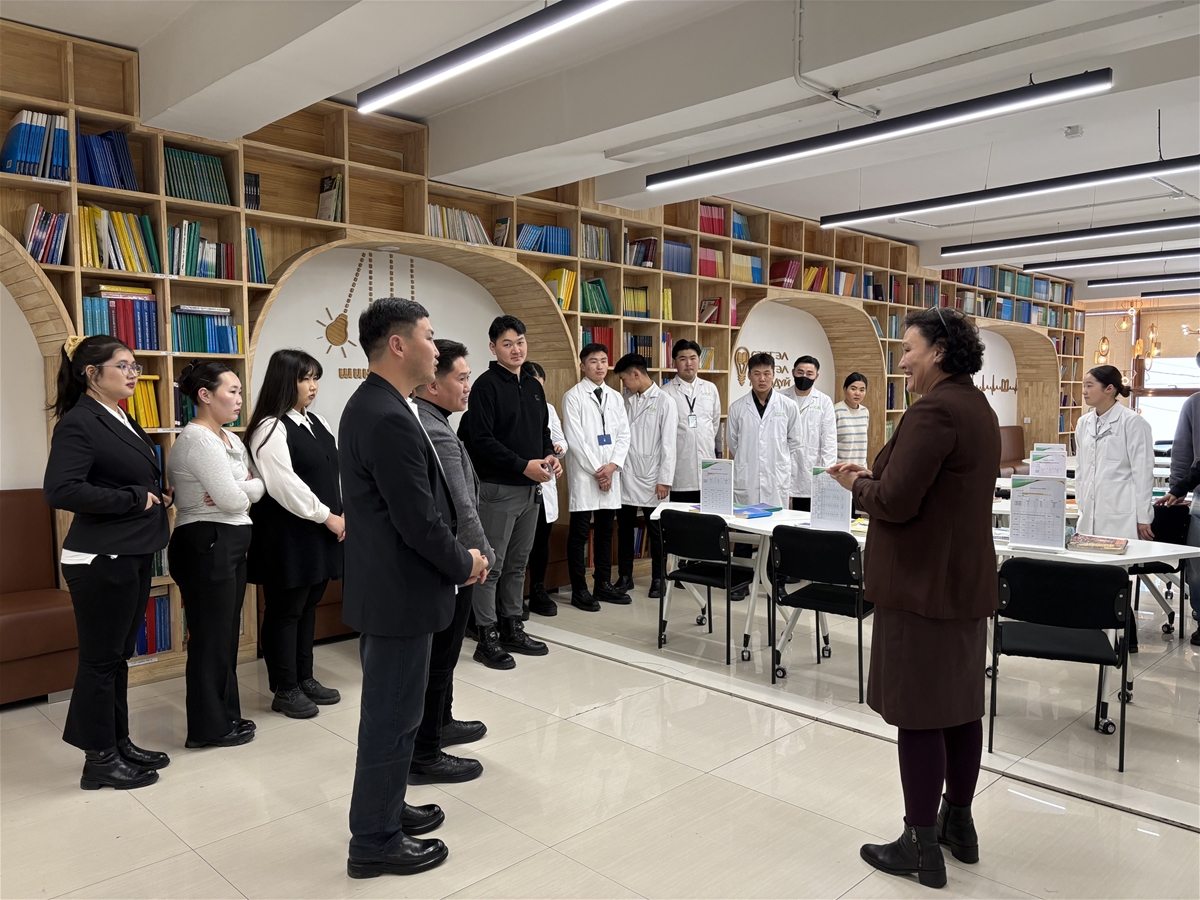
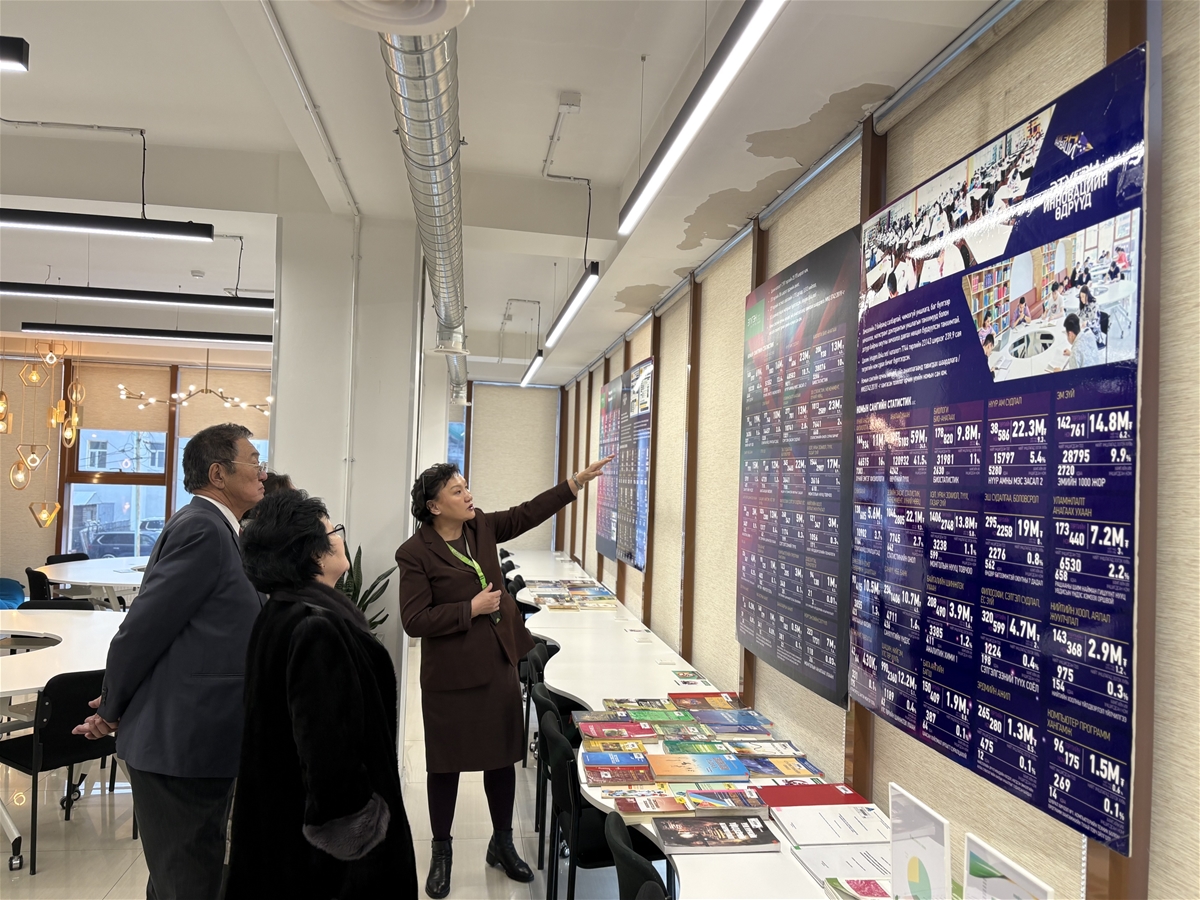
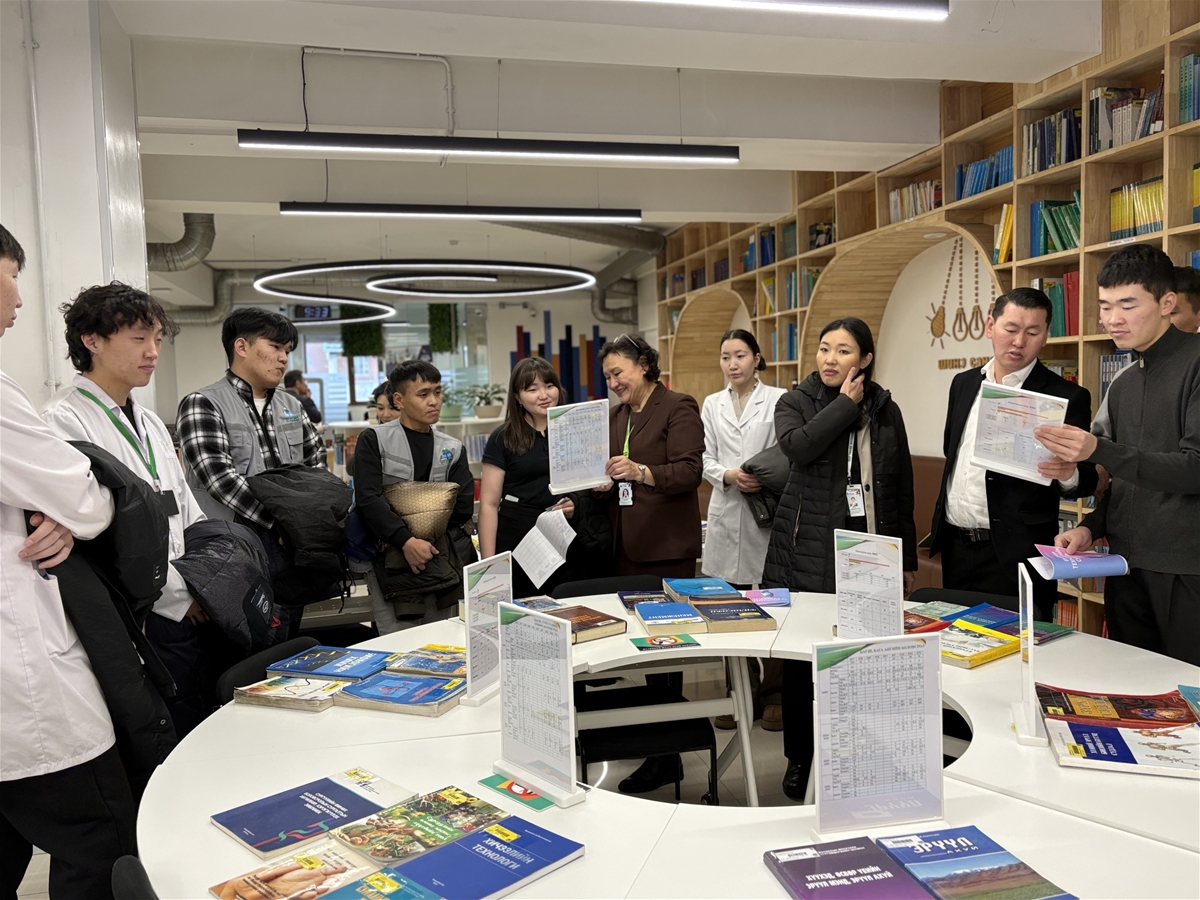
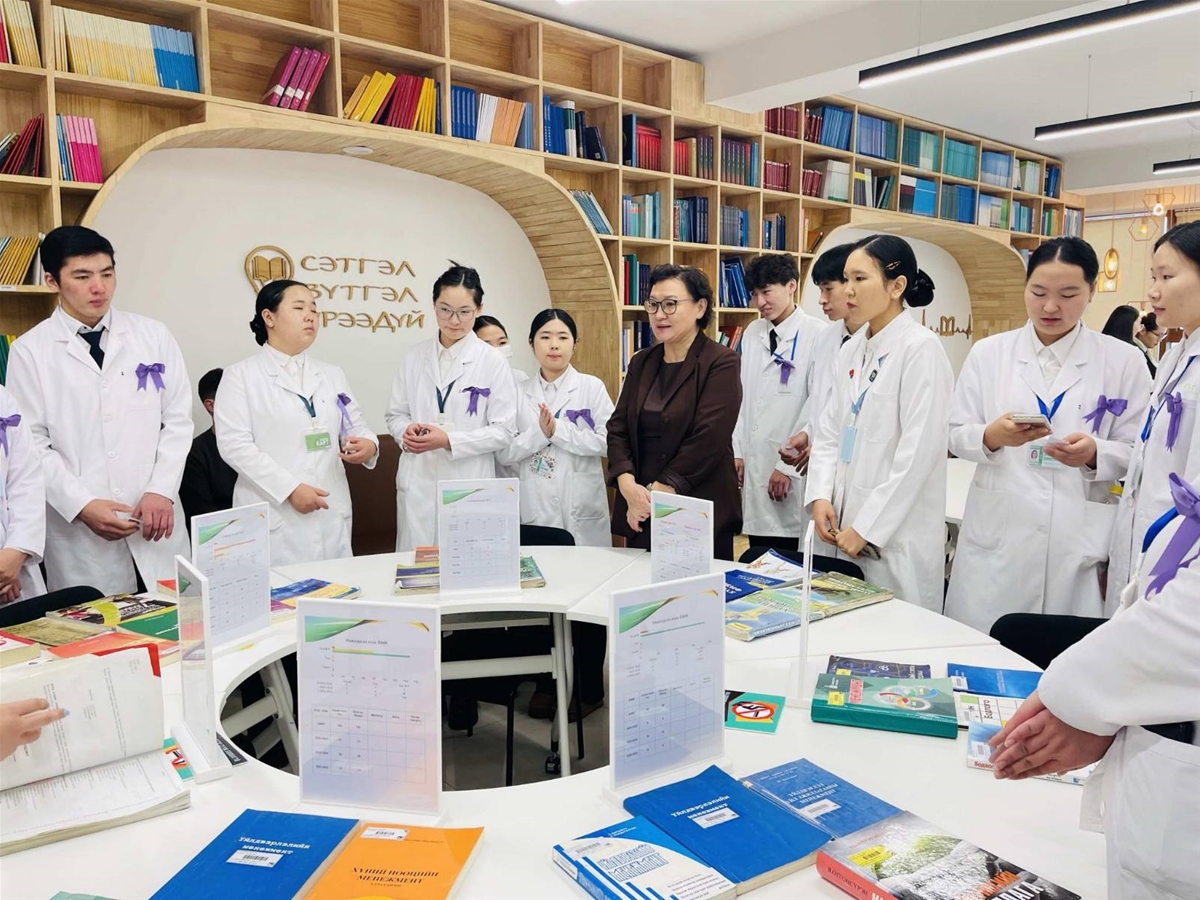
“ETUGEN” CULTURE
I had the pleasure of covering the "Etugen Innovation Days 2024" event for two days, and during my first “tour” of the university, I felt how much the university leadership cares about, understands, and supports the personal development of its students, giving their all and dedicating their love to it. Perhaps, by using this university as a model, I hope other universities will create an environment where students can study and grow in a pleasant, healthy, and safe atmosphere, and have the conditions to socialize. From the moment I stepped into the university until I left, I noticed that there is a deep-rooted 10 culture of mutual respect and this is evident in their daily practices. They greet you with warmth, send you farewell with appreciation, keep time precisely, are businesslike, and dress neatly. I did not encounter a single student who was dressed casually, which confirms this. Sharing experiences and working together as a team is something that "Etugen" students truly excel at. One of the best examples of this is the "Etugen Cheetah" basketball team, which is well known among other universities. Furthermore, being persistent in studying, reflecting and verifying, maintaining order, valuing one's native language as the key to knowledge, mastering English as an advantage, as well as practicing minimal and economical approach—these are all cultural practices that "Etugen" students implement in their daily lives.
PROJECT TEAM AND INNOVATION
I realized at Etugen University, there is a dedicated Project Team that plays a pivotal role in shaping the university’s growth. Unlike a team of builders or renovators, this group is made up of creative thinkers who focus on crafting practical solutions for the university’s educational and research needs. They're the driving force behind some of the university’s most exciting ventures, including the "Student Hub," a state-of-the-art central swimming pool, the "Etugen" Secondary School, and the upcoming construction of the building VI. before any building begins, the team conducts thorough research to determine the ideal environment for learning and research. With a solid understanding of what’s needed, they then finalize the design and clarify the concept, which sets the stage for the construction phase. The environments they create are carefully crafted to meet the needs of faculty, students, and those who are still growing in their academic journeys. This thoughtful approach is what earned the team its fitting name—the "Project Team."
The Project Team at Etugen University is composed of several specialized divisions: General Services, Construction Management, Building Maintenance, and the Finance Department. They work closely with all the university's faculties and departments, adhering to a collaborative approach. This organizational structure is unique and is not commonly found in other universities, making it a noteworthy innovation. The maintenance and service of classroom buildings operate on a continuous cycle, meaning that if any equipment or facility breaks, it is immediately repaired or replaced. This not only improves the utilization of resources but also optimizes investments, ultimately creating a more user-friendly and efficient environment for everyone.
THE STUDENT HUB, FILLED WITH THE INNOVATION, ASPIRATIONS AND DREAMS OF STUDENTS
One of the many new and wonderful things that made me exclaim, "How lucky are the students who get to enroll at Etugen University!" was the "Student Hub." A spacious, well-lit hall with pleasant lighting, there were no traditional, dull tables or furniture to be found. Some students were painting with watercolors, while others near the student shop were discussing business ideas. In another corner, a group of students sat in a circle, knitting, crocheting, and even embroidering. Meanwhile, the sound of a guitar filled the air as students enjoyed themselves. If you walked upstairs, you would find a quiet corner where one student was meditating in solitude. This is the "Student Hub" at Etugen University. Student life, friendship, free time, hobbies, and freedom—all of these wonderful concepts can be found here. If you're not a student of this university and happened to stumble upon this article, take a moment to visit the "Student Hub." You too will feel the energy, passion, and ambition fueled by the dreams and aspirations of youth.
The leader of the "Student Hub" project, S. Ochir-Erdene, “ shared that our university operates on three main concepts. First, the instructor is the one who teaches the lessons. The environment itself acts as another form of instructor, delivering education through the space around the students. The 'Student Hub' is a product of this vision, and it is now open for use. Our facility covers a total area of 600 square meters. The space has been carefully designed to provide ample room for student clubs and areas where students can relax and spend their free time. Students from different classes can come together and collaborate under the club system. Our goal is to make the 'Student Hub' a place where students from Etugen University, as well as those from other universities, can gather to share new ideas, introduce proposals, and engage in discussions. This is the kind of modern university environment we aimed to create with this project. He explains further that the space integrates new technologies and innovations, giving us an edge. The architectural design itself is also unique, incorporating natural lighting and meeting all building standards. The structure is equipped with pathways and spaces designed for wheelchair accessibility, as well as green spaces, creating a welcoming and inclusive environment for all students.
The CEO of the "Central Swimming Pool" LLC, N. Khishigbayar, shared the story of the company's growth and its significant investment in student health: "In 2013, we opened 'Success' fitness, which became one of the major investments aimed at providing a positive environment for students to maintain a healthy body while pursuing their studies. Now, we are opening our third branch at the Central Swimming Pool. Our sports hall was launched in 2012. Our university offers a comprehensive range of services, including a sports hall, a central swimming pool, and a fitness club. This holistic approach allows students to spend their free time in a healthy and comfortable environment. "Starting from their first year, students are taught swimming, which contributes to overall physical development. The program is designed to prepare students to compete in sports events, developing their strength and skills. Our pool’s water purification technology is noteworthy because it complies with international standards and is innovative. We use a system that purifies 99.98% of the water, ensuring a clean and safe swimming environment."
During Etugen Innovation Days, Science Café Ulaanbaatar presented their showcase at the Student HUB.
The Student Development Officer, A. Myangan, was asked for more details about the "Student Hub.
-“How many clubs have been established and are currently part of the "Student Hub"?
-There are 90 clubs under the Student Development Office. Each club is affiliated with a specific student association. This means that the number of members is over 1,000. The clubs provide students with opportunities to create lasting memories, make new friends, and grow personally. These clubs are initiative-driven, and we support them by offering assistance in their operations.
- I walked through the "Student Hub" and saw a Handicrafts Club, students playing guitar, and members of profession-oriented clubs. There seem to be many clubs. Can you tell us more?
- There are a lot of clubs. For example, there is a club focused on handicrafts, and a photography club where members handle lighting and create their own images. They came up with the idea themselves and proposed it. It's easy to establish a club, and our office provides support to help them carry out their activities.
INNOVATION: ETUGEN LEARNING MANAGEMENT SYSTEM (ELMS)
The Deputy Director of Education at Etugen University, Ts. Munguntsetseg, gave a detailed presentation on their Learning Management System. By consolidating all paperwork into this system, the university has made significant economic savings, as well as saving time for faculty, students, and staff, making it an intelligent and efficient solution. She explained, "Our university was established in 2002 and has been conducting educational activities for 22 years. A total of 32 programs are currently being implemented at the university, including 22 Bachelor's programs, 2 Associate Bachelor's programs, and 8 Master's and Doctoral programs. Out of these, 9 programs are accredited nationally, and 7 programs have international accreditation.
Since 2019, we have been developing and using the Learning Management System alongside the educational programs. This system has been officially registered as intellectual property, and Etugen University has developed it with a team of three people, in conjunction with our educational programs. Our Learning Management System consists of 162 menus. It is being used by the students, faculty, finance, and academic departments. This program is being developed based on user needs. In the 2024-2025 academic year, Etugen University is serving 8,199 students. To create a conducive environment for our students, we are continuously improving the system. The system includes 186 guidelines for faculty and 136 guidelines for students. By placing these guidelines in the system, we are providing a comprehensive resource for faculty, students, and staff to continuously access the information.. To facilitate the learning environment, students can select courses, view schedules, confirm courses, fill out satisfaction surveys, check their GPA, verify the grades for the courses they have completed, submit feedback on their instructors, and send assignments or files to their instructors using ELMS. Students have the ability to manage their own data without bureaucratic obstacles and can access information related to themselves within the system. This allows them to receive the information they need directly. Additionally, the system provides access to registration, reports, calculations, consolidation, research, and statistical data.
HUMANITIES SCHOOL WITH AN INTERNATIONAL INTERNSHIP PROGRAM
The Director of the Humanities School, B.Orgilmaa, shared, "Our school operates with two departments: the Department of Educational Studies and the Department of Economics and Management. We offer a total of 10 programs to train specialists. Five of these programs have been accredited internationally, and this is the second time we are receiving accreditation at an advanced level. Our operations are focused on three areas: Educational Management, E-Governance, and Public Administration. The main innovation of our school is the international internship program. Over the past two years, 22 students have participated in internships in Japan. This year, we are preparing 13 more students, who are currently learning the language in preparation for their internships."
The Senior Lecturer of the Department, N.Dulamkhand, shared, "Since 2017, Etugen University has been implementing a result oriented program to train Primary School Teachers and Early Childhood Educators, and we are now entering the 9th year of this program. What sets our university apart from other universities that train primary school teachers is our focus on result oriented education. The main objective of our arts courses is to foster self-control and psychological resilience, creative thinking, and the development of children. We aim to train creative educators who can support the development of children. In this regard, we provide foundational theoretical concepts in arts, which are reinforced through practical skills. We have consistently held exhibitions and classes related to the arts, both today and during previous Innovation Days. In the field of visual arts, we can say that our students fully develop their children's potential. Primary school teachers and kindergarten teachers are nurturing their students through visual arts. According to research on the graduates of the previous academic year, 83% of them are using music education to develop their students."
During this session, Lecturer J.Buyandelger from the Department of Educational Studies shared an interesting part of the Innovation Days regarding how international students quickly learn the Mongolian language. In teaching Mongolian to foreign students, they focus on helping them understand the meaning of words and teaching them how to use the language practically. The program is designed to help students work with the text in a meaningful way. In just one and a half years, foreign students have become proficient enough in Mongolian to converse fluently. Two students from China read aloud a text called "Busy Mother Hen" and introduced themselves, showing how they learned Mongolian.
B. NASANBAYAR: "Etugeners" are working together to find solutions to pressing social and sectoral issues
Dr. B. Nasanbayar, Deputy Director for Research & Innovation, and Foreign Relations Department, shared:“ "The theme of Innovation Days, 'Innovation Today is Development for Tomorrow,' aims to showcase the innovative efforts of Etugen University. The goal is to share best practices and collaborate effectively across the university's groups, departments, and units. Over 8,000 participants, including representatives of students and graduates, and more than 200 faculty and staff members, are taking part in this event. Etugen University has signed cooperation agreements and memorandums with over 30 businesses and organizations.".
The most important foundation of these highlights is the "Etugen" culture. The core essence of this culture is the concept of having people with strong human qualities, health, and right cooperation. This concept serves as the foundation for organizing education, research, and all activities. Accordingly, the most important factor is the idea that the future is created through effort and dedication. This is why our activities run continuously and steadily. The main foundation of innovation at Etugen University is the "Etugen" culture. Etugeners organize education, research, and all activities based on the principles of human qualities, professional skills, and teamwork, which is our innovation.
The "Etugen University Development Strategy 2030" was approved in 2021. According to this strategy, the university organizes "Etugen Innovation Days" every two years. The third Innovation Days showcases the research works of faculty members, researchers, and staff from the past two years to the public.
As a side note, it can be said that one of the main achievements of our faculty and researchers is that 12-13% of the over 800 research works have been published in international journals with high impact factors. Currently, around MNT 500 million worth of funding is being successfully used in the implementation of 22 projects. Through these projects, faculty members, students, and graduates are collaborating with national and international scholars, working on their own works, articles, and patents, which is one of the highlights of this year’s Innovation Days. The primary goal of Etugen University in developing research and innovation is that the faculty members teaching in the bachelor’s, master’s, and doctoral programs are working with students to find solutions to the pressing issues in society and various sectors.
Currently, 18 professor teams are working at our university. These teams have the advantage of conducting research with recognized scholars, researchers, and students in their respective fields and specialties. In addition to publishing articles and papers, these teams are placing significant emphasis on applying their research findings into practice, bringing them to the real world, and developing innovative products. In the 2022-2024 academic years, the faculty and researchers of Etugen University have published a total of 825 research works. This includes 512 articles, 173 presentations, 50 books, and monographs in Mongolia, and 58 articles and 32 presentations internationally. Of the 90 international research works published, 10 articles and presentations have been published in journals registered in Web of Science and Scopus with Impact Factors (IF). As of November 2024, 22 professors at Etugen University have an h-index. At our university, 20 research professor teams are working, and 22 research projects with funding of MNT 496 million are being implemented. Since the 2023-2024 academic year, these professor teams have enhanced their competencies, and I would like to note that their activities have become more effective and refined, with their operations expanding in the 2024-2025 academic year.
In the future, the primary objective of Etugen University is to ensure that individuals who come to study at our university acquire the skills necessary to realize their aspirations and goals, while fostering the ability to create a high quality of life throughout their careers. We aim for our graduates to make meaningful contributions to society, becoming responsible citizens who take accountability for the well-being of their communities.
Journalist D. Gansaruul
